




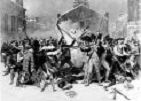



















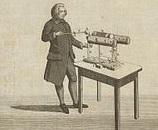
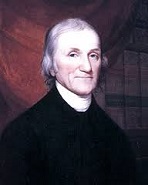
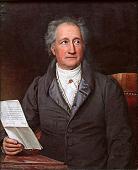


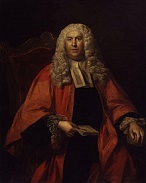


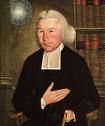


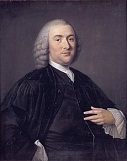



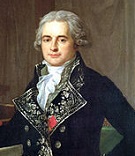
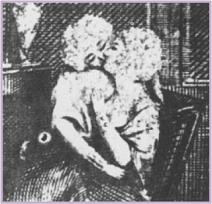



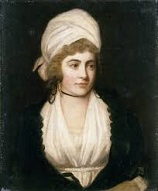
1770 Pop. of the Am. colonies: 2.5M; pop. of England: 7.5M, a ratio of 3 to 1; in 1700 the ratio was 20 to 1. The number of poor receiving public assistance in New York City rises to 5K from 250 in 1698. In this decade the Industrial Rev. begins in England, powered by steam. A famine in Bengal kills up to one-third of the pop. in affected areas; more famines in 1876-7 (5M killed), 1899 (4.5M killed), and 1943 (5M+ killed). In this decade Britain goes from exporting more grain than it imports to an equal balance, going to a negative balance by 1790. In this decade the mean Jan. temp is 34.3F (1.3C), becoming a low point, after which a steady warming trend sees the mean Jan. temp rise to 40.5F (4.7C) in the 1920s; "Starting in the mid-13th century, the northern hemisphere entered a period of prolonged cooling known as the Little Ice Age. This extended chill was not smooth and uniform, however, but marked by intervals of plummeting temperatures in the midst of otherwise stable warmth. Around 1770, one such interval of abrupt freezing began in the Northern Atlantic, wreaking immediate havoc on shipping, transportation and agriculture. In 1775, severe grain shortages in France caused by successive years of poor harvests resulted in bread riots throughout the kingdom. Later dubbed the Flour War, it was a harbinger of things to come."- Climate Chaos Helped Spark the French Revolution On Jan. 1 the foundation is laid for Ft. George in Bombay, India by Col. Keating on the site of Ft. Dongri; demolished in 1862. On Jan. 2 Benjamin Franklin (1706-90) pub. A Parable Humbly Inscribed to His Nemesis Lord Hillsborough, about a large English dog who picks on a lion cub, only to be smashed with "a stunning blow" when the lion grows up, leaving the dog "regretting that he had not rather secured its friendship than provoked its enmity" - like the Pilgrims and other English came to America because they loved the tyrannical English government and wanted to bring it with them? On Jan. 19 the Battle of Golden Hill, N.Y. between British soldiers and the Sons of Liberty in New York City results in the arrest of leader Alexander McDougall (1731-86) on Feb. 8. On Jan. 21 after not-yet-mad king (since 1760) George III (1738-1820) dismisses his coalition cabinet, PM (since Oct. 14, 1768) Augustus Fitzroy, 3rd duke of Grafton resigns, and on Jan. 28 his Tory cousin Frederick, Lord North (1732-92) becomes British PM (until Mar. 22, 1782), presiding over a cabinet of the King's Friends, where he becomes known for acquiescing in the king's views although he venerates the traditions of Parliament (worst British PM ever?); the king calls him his "sheet anchor"; the Tories, opposed to increasing the number of people who can vote, and famous for "rotten Boroughs" become the dominant force in the British House of Commons for the next 60 years; George III temporarily overthrows the system of cabinet govt. which had been established in the reign of his predecessor, just in time to bumble away America, causing Lord North to become known as "the minister who lost America". On Feb. 12 Boston atty. Josiah Quincy II (1744-75) ("Hyperion") pub. a letter in the Boston Gazette containing the soundbyte: "To break off all social intercourse with those whom commerce contaminates, whose luxuries poison, whose avarice is insatiable, and whose unnatural oppressions are not to be borne." On Feb. 23 English explorer Samuel Hearne (1745-92) begins his 3rd voyage to the Arctic Ocean (1st Nov. 6, 1769); in Sept. he begins his 3rd voyage (ends 1772). On Mar. 5, 1770 (Mon.) after a young apprentice insults redcoat "lobster back" sentry Pvt. Hugh White guarding the customs house, a fight breaks out, snowballs and rocks fly, the sentry calls for reinforcements, a firebell rings, and a Boston mob comes out in force; "Fire and be damned" the crowd taunts, hitting nine soldiers with missiles and knocking one down; after he rises to his feet, he fires into the crowd, and the other British soldiers respond, killing three and wounding eight, of whom two later die; the Boston Massacre (Incident on King Street) fans the fires of public support for rebellion; mulatto runaway-slave-turned-sailor Crispus Attucks (b. 1723) is the first killed, and as he is black he later becomes a superstar; on Mar. 13 nine soldiers and their commanding officer Capt. Thomas Preston (1722-98) are indicted for murder, and defended by John Adams (1735-1826) and Josiah Quincy II (Jr.); after the Boston Massacre Trial, on Dec. 5 Pvt. Hugh Montgomery and Matthew Kilroy (killer of Attucks) are convicted of manslaughter and branded on their right thumbs; Preston is acquitted next Mar. 6, and is spotted by John Adams in London in the 1780s; Adams later writes "The part I took in defence of Capt. Preston and the soldiers... was one of the best pieces of service I ever rendered my country. Judgment of death against those soldiers would have been a foul... stain upon this country"; Mass. acting gov. (since Aug. 2, 1769) Thomas Hutchinson (1711-80) is virtually forced by the Yankee rebels, led by firebrand Samuel Adams (1722-1803) (2nd cousin of John Adams) to order the removal of British troops from Boston, which he does after threatening high treason charges against anybody attacking them, saying "The loss we have sustained is greater than we can bear"; for drawing the line and showing how loyal he is (and saving British face?), Hutchinson becomes royal gov. of the Mass. colony in Nov. (until 1774). In Mar. by a cabinet vote of 5-4 Britain repeals all of the Townshend Acts except the Tea Tax in a pointed effort to maintain the principle that Parliament can tax the *!?! colonists if it bloody well wants; the news arrives in late Apr., and since most of the their tea is smuggled in from Holland, the non-importation movement in the colonies dies; emotions simmer down for the next two years, but most of the Grenville-Townshend laws remain in effect, and the British navy still patrols the coast, and there are occasional incidents. On Apr. 20 the Battle of Aspindza is a V for King (since 1744) Erekle II (Heraclius) (Erekli) (Irakly) II (1720-98) of Kartli and Kakheti in E Georgia over the Persians despite Russian Gen. Count Gottlieb Heinrich Tottleben (1715-73) betraying him, keeping E Georgia safe until 1795. The world's greatest blonde bimbo and dumbest peasant boob-king preside over the end of an age of absolute monarchy in France after starting out as the original Princess Di and Prince Charles? On Apr. 21 after her mother-from-hell Austrian Empress Maria Theresa negotiates a royal marriage to bring peace between Austria and France, her hates-to-read daughter, 14-y.-o. Marie Antoinette (1755-93) leaves Austria, spends two weeks in an uninhabited island in the Rhine Valley where she goes through a ritual of taking off all her Austrian clothes and replacing them with French ones, then on May 16 marries 15-y.-o. French dauphin Louis Auguste de Bourbon, Duc de Bery (1754-93) (future Louis XVI), changing her name from Maria Antonia and vowing to speak only French and to treat the peuple Francais, er, French people so well that they will think she's an angel; her lady-in-waiting is known as "first lady of the bedchamber"; sick of Louis XV's horde of mistresses, Antoinette is adored by the people of France for the first few years, but when she produces no children year after year while dancing and gambling every night they begin to whisper about her, causing porno pamphlets to begin circulating imagining her shameless sex escapades with everything that moves; anti-Austrian feeling doesn't help either; the groom proves at first uninterested, then unable to ejaculate, and it's not until an operation in 1777 (7.5 years) that she finally bears the first of two boys and two girls. On Apr. 29 Lt. (not Capt. yet) James Cook of the Endeavour lands on Possession Island, and claims the whole E coast of Australia for George III under the name New South Wales, incl. Botany Bay (originally Botanist Bay), which is named by his botanist companions Sir Joseph Banks (1743-1820) (English), Daniel Charles (Carlsson) Solander (1733-82) (Swedish), and Herman Diedrich Spoering (Spöring) Jr. (1773-71) (Finnish), who have a field day discovering new it's-two-for-Tuesday specimens; in June as the ship heads N along the coast, it runs aground on Endeavour Reef (on the Great Barrier Reef) S of modern-day Cooktown on Cape York Peninsula (northernmost town on the E coast of Australia), causing them to spend seven weeks repairing it, during which time the botanists get cooking, while Scottish Quaker artist Sydney Parkinson (1745-71) makes the first Drawings of Australian Aborigines, of the Guugu Yimithirr ("saltwater people") Tribe, who teach them 50 words, incl. my-little-girl-she's-a-runaway "gangurru" (kangaroo), which is seen by bug-eyed whites for the first time; later it turns out that the native was just saying "I don't understand" after the new arrivals pointed at a kangaroo; meanwhile, finding only a small native aborigine pop. of black, obviously non-human ape-men, and there being no U.N. yet to stop them, the Brits get bright ideas about white settlement; too bad, after arriving in Batavia in the East Indies, they take on tainted supplies, and Sporing dies of dysentery next Jan. 24, followed by Parkinson on Jan. 26 en route to Cape Town. On June 3 Father Junipero Serra founds the San Carlos Borromeo del Carmelo (Carmel) Mission in modern-day Carmel-by-the-Sea, Calif. (#2 of 21), which becomes his HQ in Alta Calif. until his 1784 death. On July 6 a Russian fleet from the Baltic Sea via the Strait of Gibraltar sinks the Turkish navy near Chios, Greece. In Sept. the first annual Santa Fe Fiesta in N.M. is held. On Oct. 18 the Treaty of Lochaber is signed in S.C., moving the Proclamation Line below the Ohio River further W; Benjamin Franklin and a number of British investors form a syndicate to establish the colony of Vandalia (colony) S of the Ohio River in present-day W. Va. and E Ky., but the Am. Rev. War causes the plans to be dropped. Maria Theresa appoints a commission to reform school education in Austria, led by Franz Friedrich Wilhelm von Furstenberg (1729-1810), who concentrates on getting rid of pesky Freethinkers, replacing them with Jesuit-approved teachers. On Nov. 14 6'4" Scottish explorer James Bruce (1730-94) discovers the source of the Blue Nile in Lake Tsana (Tzana) (Dembea) in the mountains of Ethiopia S of Gondar - the White Nile is on the W not the E of the Blue Nile, therefore in Africa white isn't right? In Nov. Egyptian sultan Ali Bey Al-Kabir occupies Damascus (until June 1771). Taksin the Great of Siam (1734-82) begins the Nguyen War against the Nguyen Lords over control of Cambodia (ends 1773). Let's get outback tonight, everybody needs a holiday? Danish court physician Count Johann Friedrich von Struensee (1737-72) begins hooking up with miserable Queen Caroline Matilda (1751-75) (sister of George III of England), and conspiring against her mad debauched hubby-cousin Christian VII, causing internat. gossip as he becomes supreme minister of Denmark next Mar. 20 (until Jan. 16, 1772), turning into a brilliant near-dictator with a lot of jealous people around. In this decade the Alonquin Kickapoo tribe of Wisc. moves S into the Wabash region (modern-day Ill. and Ind.). In this decade Paris becomes a world center of medical research and teaching (until the 1850s), with the Paris School professionalizing the medical profession, requiring teaching and research based in large hospitals and emphasizing sanitation and public health, led by French physician-chemist Jean-Antoine Chaptal (1756-1832), interior minister in 1801-4, who founds the Paris Hospital. In this decade dueling by gentlemen switches from swords to pistols in Britain, even though it is illegal; in 1777 the Irish Code Duello is allegedly adopted at the Clonmel Summer Assizes, becoming the std. dueling handbook; too bad; it was a lit. invention of Sir Jonath Barrington in 1827? In this decade turbans become a fashion craze for women in England, spreading to Paris by 1790 and becoming everyday wear by 1800. Early in this decade the Skoptzies ("castrated ones") religious sect in Russia arises in the Oryol region, practicing self-castration, and citing Matt. 19:12 and Luke 23:29; the "first purification" is to remove the testicles and scrotum, "the keys to Hell"; the second purification is to remove the penis, "the keys to the Abyss", and become "bearers of the imperial seal", "worthy of mounting white horses"; female members mutilate their genitalia and breasts but do not remove their ovaries - women have a higher IQ then men? By this year the town of Pittsburgh, Penn. (modern-day pop. 305K) (founded 1758) has 20 log houses, and a small village flourishes on the site of modern-day city Wheeling, W. Va. on the Ohio River (modern-day pop. 28K), founded during the winter of 1769-70 by Col. Ebenezer Zane (1747-1811) and his brothers, who erect Ft. Fincastle in 1774, renaming it Ft. Henry in 1776 in honor of Patrick Henry. The city of Casablanca (Sp. "white house") (Dar el-Beida) (modern-day pop. 4M) is founded in Morocco by Sultan Sidi Mohammed ben Abdallah after an earthquake levels the Portuguese installation of Casa Branca (Port. "white house") in 1755; by 1860 its pop. is only 8K. The city of Monterey, Calif. at the S end of Monterey Bay on Monterey Peninsula (modern-day pop. 27K) is founded as a Presido, becoming the first military establishment W of the Rocky Mts. and the capital of Alta Calif. After adopting the teachings of Welsh minister James Relly and getting excommunicated from George Whitefield's congregation, Alton, Hampshire-born John Murray (1741-1815) emigrates from England to Lacey Township, N.J. and begins preaching his Universalist doctrines, serving as a chaplain in the Am. Rev. army and becoming known as "the Father of Am. Universalism". Newport, R.I. Congregationalist minister (also a dabbler in Science) Ezra Stiles (1727-95) (who becomes pres. of Yale College in 1778) predicts in his diary that the English language will "become the vernacular Tongue of more people than any one Tongue on Earth, except the Chinese." The Vienna Waltz becomes fashionable in this decade after HRE Joseph II opens balls to the gen. public instead of nobles only. Austrian violinist-composer Karl (Carl) Ditters von Dittersdorf (1739-99) is created a knight of the Order of the Golden Spur, and given his title of nobility in 1772 by Empress Maria Theresa, becoming bigger than Haydn and Mozart for some time. 10-y.-o. Anna Green Winslow (1759-80), a descendant of Mayflower passengers John Winslow (elder brother of Edward Winslow) and Mary Chilton is sent from her home in Nova Scotia, Canada to Boston, Mass. to finishing school, writing a diary about her experiences, incl. sermons at Old South Church, covering from Nov. 18, 1771 to May 31, 1773, which is pub. in 1894 and becomes a hit. The anti-British newspaper Mass. Spy is founded in Boston, Mass. by Isaiah Thomas (1749-1831), who helps Paul Revere in his midnight ride in 1775. In this decade the sodomy-friendly Macaroni (Maccaroni) Craze sweeps London, named after the Italian dish brought back by the idle fops making their Grand Tour during the 1760s, after which "The word Macaroni then changed its meaning to that of a person who exceeded the ordinary bounds of fashion; and is now justly used as a term of reproach to all ranks of people, indifferently, who fall into this absurdity" (The Macaroni and Theatrical Mag.); macaronis like to wear fine sprigged fabric, tight clothes, oversized sword, tasseled walking stick, delicate shoes, and an enormous wig with tall front and a fat queue or club of hair behind, with a ridiculous litle hat that is so high up that it has to be removed at sword point, becoming the source of the allusion in "Yankee Doodle Dandy" to "stuck a feather in his cap and called it macaroni". Woods of Windsor begins in a pharmacy near Windsor Castle. The printing firm later called Eyre & Spottiswoode is founded by Scottish-born William Strahan (1715-85) as royal printer to the British king; Stahan engages in correspondence with fellow printer Benjamin Franklin; the firm later becomes the first to print the infamous "Protocols of the Learned Elders of Zion" in English in 1920 - there's nothing like family values? A 3K-carat opal is found in Hungary, the only place in Europe where they are found, becoming the largest in the world (until ?). The French use smuggled seeds to establish spice plantations in Madagascar and other places to break the Dutch monopoly; spice prices plummet, and the masses begin to enjoy them. The spelling "oboe" for hautbois or hoboy is adopted in English. Immanuel Kant becomes prof. of philosophy at Konigsberg U. Germany's golden boy of poetry Johann Wolfgang von Goethe (1749-1832) completes the first part of his play Faust while studying law in Strasbourg (until 1771), along with music, art, anatomy, and chemistry, and making friends with tight Friderike Brion, daughter of the pastor of Sesenheim, who becomes Gretchen in "Faust", and Johann Gottfried von Herder (1744-1803), who teaches him to ditch French classicism, embrace German nationalism, yet admire Shakespeare? Sir William Blackstone (1723-80), prof. of English law at Oxford U. from 1758-66 is appointed a justice of the Court of King's Bench, followed by the Court of Common Pleas. Oxford-educated scholar Sir William Jones (1746-94) becomes an Orientalist, and begins by translating The Life of Nadir Shah from Persian to French. Italian Jesuit scholar Girolamo Tiraboschi (1731-94) becomes librarian to Duke Francis III of Modena, going on to compile his 13-vol. Storia della Letteratura Italiana (1771-82), making him the first historian of Italian lit. After his theater in Hamburg folds, Gotthold Lessing gets a job as librarian for the duke of Wolfenbuttel (until 1781). Handel's Messiah is first performed in New York City. After the Frogs get over their hangup about imitating the English habit of taking meals in taverns, the Age of Restaurants begins in Paris, France, serving food at all hours from a menu; by 1780 there are 100+. The first Norwegian (brown) rats from N China are sighted in the New World, brought by ships; by 1800 they are found in every Euro country, and by modern times they are found in every continent except (knock on Norwegian wood?) Antarctica. Architecture: Old Manse, next to the North Bridge on Concord River in Concord, Mass. is built by Rev. William Emerson (-1776), grandfather of Ralph Waldo Emerson. Tryon Palace in N.C. (begun 1767) is finished, serving as the first permanent capitol of the colony, and after independence as N.C.'s first state capitol; too bad, in 1798 all but the two wings burn down. Inventions: On Apr. 15 the Pencil eraser is first described by English scientist Joseph Priestley made of a vegetable gum that he calls rubber; meanwhile English optician Edward Nairne (1726-1806) begins marketing erasers at 3 shillings/half-in. cube, making them popular as an alternative to bredcrumbs despite the high price; Nairne also patents a medical electrostatic generator, a chest microscope, and the first sucessful marine barometer. Silvery smooth Britannia Metal, containing 90%+ tin 90%, 5%+ antimony, and 2%+ copper is first made in Sheffield, England by James Vickers, who calls it Vickers White Metal. John Cuthbertson of Amsterdam invents an electric battery. Jesse Ramden (1735-1800) of England invents the screw-cutting lathe - 1-800-SCREW-U? Visiting cards are introduced in England. Steam trolleys are introduced in Paris. Science: In this decade the Chemical Rev. begins in Europe, led by French brain man ("the Father of Modern Chemistry") Antoine-Laurent de Lavoisier (1743-94). French scientist Jean-Charles de Borda (1733-99) introduces the consensus-based Borda Count for electing broadly acceptable candidates with points, which is adopted by the French Academy of Sciences until new pres. Napoleon orders his own system substituted in 1801. On Aug. 1 and Aug. 8 Dutch anatomist-anthropologist Petrus Camper (1722-89) gives two lectures to the Amsterdam Academy (Teken-akademie), proposing the use of facial angles (prognathism) to differentiate the races, calculating the angle between lines drawn from nostril to ear and forehead to upper jawbone, with the supreme white-blonde ancient Greeks having an angle of 100-90 deg., Euros 80 deg., Orientals 70 deg., blacks 70 deg., and orangutans 42-58 deg., equating them to human beauty, making fans of Etienne Geoffroy Saint-Hilaire and Paul Broca and helping feed scientific racism. English chemist Joseph Priestley (1733-1804) discovers sulfur dioxide, and coins the name "rubber" for the substance from an Am. tree that is good for wiping black lead pencil marks from paper - funny how a priest coins the term rubber? English writer and quack honey doctor John Hill (1716-75) introduces a viable method of obtaining specimens for microscopic study. Nonfiction: Edmund Burke (1729-97), Thoughts on the Cause of the Present Discontents. Morgan Edwards (1722-95), Materials Towards a History of the Baptists. Leonhard Euler (1707-83), Introduction to Algebra. Benjamin Franklin (1706-90), A Conversation Between an Englishman, A Scotman, and an American, on the Subject of Slavery; pub. anon.; "Perhaps you imagine the Negro a mild-tempered people. The majority are of a plotting disposition, dark, sullen, malicious, revengeful, and cruel in the highest degree. Your merchants and mariners who bring them from Africa, often find this in the insurrections of the slaves on board the ships , who kill all when they get the upper hand. Indeed, many of the villains in your own country, are sold off as punishment." Baron d'Holbach (1723-89), The System of Nature; or, The Laws of the Moral and Physical World; pub. under alias Jean-Baptiste de Mirabaud; denies the need for a Creator to explain Nature, and flaunts the ahead-of-his-time atheistic attitude that any and all belief in gods and/or religions is backward superstition; belief in gods started with primitive animism, which went bad when men created gods in their own image, progressively merging them into "a gigantic, exaggerated man, whom they will render illusory by dint of heaping toether incompatible qualities. Human being will never se in God, but a being of the human species, in whom they will strive to aggrandize the proportions, until they have formed a being totally inconceivable; "Nature is not a work; she has always been self-existent; it in her bosom that everything has operated; she is an immense laboratory, provided with the materials, and who makes the instruments of which she avails herself to act. All her words are the effect of her own energy, and of those agents or causes which she makes, which she contains, which she puts in action"; draws refutations by Frederick II the Great and Voltaire - the first open avowed atheist since? Immanuel Kant (1724-1804), De Mundi Sensibilie et Intelligibilis Forma et Principiis; his dissertation. William Kenrick (1725-79), An Account of the Automaton, or Perpetual Motion of Orffyreus; A Lecture on the Perpetual Motion. Pierre Samuel du Pont de Nemours (1739-1817), Observations sur les Effets du Commerce des Grains. Jean-Antoine Nollet (1700-70), L'Arte des Experiences. Jean-Jacques Rousseau (1712-78), The Confessions of Jean-Jacques Rousseau (autobio.); the first modern autobio.; the French authorities prohibit him from pub. it during his lifetime, but let him return to Paris to resume his old life as a musical copyist (until 1778). Samuel Auguste Tissot (1728-97), Traite de L'Epilepsie. John Woolman (1720-72), Considerations on True Harmony of Mankind. Music: Luigi Boccherini (1743-1805), Cello Concerto No. 9 in B flat major, G.482. Christoph Gluck (1714-87), Paride ed Elena (opera) (Vienna). Franz Josef Haydn (1732-1809), La Pescatrici (The Fisherwomen) (opera buffa) (Sept. 16) (Eszterhaza). Wolfgang Amadeus Mozart (1756-91), Mitridate, Re di Ponto (Mithridates, King of Pontus) (Milan); his first serious opera, composed at age 14. Art: Thomas Gainsborough (1727-88), The Blue Boy; Jonathan Buttrell, son of a wealthy hardware merchant. Benjamin West (1738-1820), The Death of Gen. Wolfe; clones it next year for George III. Plays: Johannes Ewald (1743-81), Rolf Krage (tragedy); from a legend by Saxo Grammaticus; first Danish tragedy. Poetry: Oliver Goldsmith (1730-74), The Deserted Village; about industralization and wealth concentration changing rural life; a transitional English work between Neoclassicism and Romanticism; "Sweet Auburn! loveliest village of the plain"; "There, in his noisy mansion, skill'd to rule,/ The village master taught his little school./ A man severe he was, and stern to view;/ I knew him well, and every truant knew;/ Well had the boding tremblers learn'd to trace/ The day's disasters in his morning face;.../ Yet he was kind, or, if severe in aught,/ The love he bore to learning was in fault;/ The village all declar'd how much he knew;/ 'Twas certain he could write, and cypher too;/ ... And still they gazed, and still the wonder grew,/ That one small head could carry all he knew"; "Even now the devastation is begun,/ And half the business of destruction done;/ Eve now, methinks, as pondering here I stand,/ I see the rural Virtues leave the land". Christoph Martin Wieland (1733-1813), Combabus: Eine Erzahlung (Erzählung) (Leipzig). Births: Polish statesman Prince Adam Jerzy Czartoryski (d. 1861) on Jan. 14 in Warsaw. French geologist-paleontologist Alexandre Brongniart (d. 1847) on Feb. 5 in Paris; pioneers use of fossils to identify ages and layers of sedimentary rock. French gen. Nicolas Francois Conroux, Baron de Pepinville (Pépinville) (d. 1813) on Feb. 1 in Douai. French marshal Louis Gabriel Suchet, 1st Duke of Albufera (d'Albuféra) (d. 1826) on Mar. 2 in Lyon; silk manufacturer father. English Tory politician William Huskisson (d. 1830) on Mar. 11 in Birch Moreton Court, Warwickshire. German Sturm und Drang free verse "Der Blinde Sanger", "An die Hoffnung" poet Johann Christian Friedrich Holderlin (Hölderlin) (d. 1843) on Mar. 20 in Lauffen on the Neckar; studies to be a clergyman at Tubingen U. but bails out; becomes librarian for the landgrave of Hesse-Homburg in 1804, then goes insane in 1807 - too much lauffen on the neckar? Haitian pres. #1 (1806-18) (black) Alexandre Sabes Petion (Sabès Pétion) (Anne Alexandre Sabes) (d. 1818) on Apr. 2 in Port-au-Prince; French father, mulatto mother; educated in France. English "Intimations of Immortality", "Lyrical Ballads", "The Prelude" Romantic poet laureate (1843-) William Wordsworth (d. 1850) on Apr. 7 in Cockermouth, Cumberland in the Lake District of NW England; educated at St. John's College, Cambridge U.; friend of Samuel Taylor Coleridge (1772-1834), who with Robert Southey (1774-1843) form the Lake Poets. German thermoelectric effect physicist Thomas Johann Seebeck (d. 1831) on Apr. 9 in Reval (Tallinn), Estonia; born to a wealthy merchant family; gets a medical degree from the U. of Gottingen in 1802, then goes into physics. British statesman and PM (1827) George Canning (d. 1827) on Apr. 11 in Marylebone, London. Am. Dem.-Repub. politician-jurist and U.S. Navy secy. (1834-8) Mahlon Dickerson (d. 1853) on Apr. 17 in Hanover Township, N.J.; educated at Princeton U. Canadian explorer-mapmaker ("the Stargazer") David Thompson (d. 1857) on Apr. 30 in Westminster, London; Welsh parents; emigrates to Canada in 1784. French portrait painter Baron Francois Pascal Simon Gerard (Gérard) (d. 1837) on May 4 in Rome, Italy; Italian mother. French marshal Louis Nicolas d'Avout (Davout) (Davouts), Prince d'Eckmuhl (d'Eckmühl) (d. 1823) on May 10 in Annoux (Yonne); youngest French marshal (1804); never defeated. British princess Elizabeth, Langravine of Hesse-Homburg (d. 1840) on May 22 in Buckingham House, London; 7th child and 3rd daughter of George III and Charlotte of Mecklenburg. British PM (1812-27) Robert Banks Jenkinson, 2nd Earl of Liverpool (d. 1828) on June 7 in London; son of Charles Jenkinson, 1st earl of Liverpool (1729-1808) and Amelia Watts; educated at Christ Church, Oxford U. Argentine gen. Juan Antonio Alvarez (Álvarez) de Arenales (d. 1831) on June 13 in Reinoso, Spain. Am. Lewis and Clark explorer William Clark (d. 1838) on Aug. 1 in Caroline County, Va.; partner of Meriwether Lewis (1774-1909). Prussian king #5 (1797-1840) Frederick William III (d. 1840) on Aug. 3 in Potsdam; son of Frederick William II (1744-97) and Wilhelmine Enke, countess of Lichtenau; father of Frederick William IV (1795-1861). French cavalry gen. Francois Etienne (François Étienne) de Kellermann, 2nd Duc de Valmy (d. 1835) on Aug. 4 in Metz; son of Francois Christophe de Kellermann, 1st Duc de Valmy (1735-1820); father of Francois Christophe Edmond de Kellermann (1802-68). German absolutist Zeitgeist philosopher (#1 philosopher of the early 19th cent.) ("the Protestant Aquinas" - Karl Barth) Georg Wilhelm Friedrich Hegel (d. 1831) on Aug. 27 in Stuttgart, Wurttemberg; graduates from the U. of Tubingen in 1793, where his teachers remark on his deficient knowledge of philosophy. Am. Willard Hotel wealthy politician-entrepreneur Col. John Tayloe III (d. 1828) on Sept. 2 in Mount Airy, Richmond County, Va.; son of John Tayloe II (1721-79); grandson of John Tayloe I (1688-1747); great-grandson of Col. William Tayloe (1645-1710). British Gen. George Ramsay, 9th Earl of Dalhousie (d. 1838) on Oct. 23 in Midlothian, Scotland; gov. of British Canada 1819-28. French gen. Dominique Joseph Rene Vandamme (d. 1830) on Nov. 5 in Cassel. Danish-Icelandic "Christus" sculptor Albert Bertel Thorvaldsen (d. 1844) (pr. BAIR-tuhl TOOR-vahl-suhn) on Nov. 19 in Copenhagen; Icelandic father; arrives in Rome on a royal scholarship on Mar. 8, 1797, causing him to celebrate it as his "Roman birthday", and stays until 1837. Am. mayor #1 of Boston (1822-3) John Phillips (d. 1823) on Nov. 26; father of Wendell Phillips (1811-84). British (Irish) Lt. Gen. Andrew Thomas Blayney, 11th Baron Blayney (d. 1834) on Nov. 30 in Castle Blayney, County Monaghan, Ireland. German "Ode to Joy" composer (Freemason) ("Der Grosse Komponist") Ludwig van Beethoven (Ger. "beet garden") (d. 1827) on Dec. 17 [Sagittarius] in Bonn at No. 20 Bonngasse; first great master of Romantic music; baptized at St. Remigius Catholic Church; becomes a prof. organist at age 11; pours ice water over his head to stimulate his brain? Spanish gen. Francisco Ballesteros (d. 1832) in Zaragoza. French Gen. Pierre Jacques Etienne Cambronne (d. 1842) on Dec. 26 in Nantes. Danish composer Jean Baptiste Edouard Dupuy (d. 1822). Scottish "The Private Memoirs and Confessions of a Justified Sinner" poet ("the Ettrick Shepherd") James Hogg (d. 1835) in Ettrick, Selkirkshire. French rev. babe Lucile Duplessis (d. 1794); wife (1790-) of Camille Desmoulins; believes she will share the fate of Mary Stuart, Queen of Scots and die young and tragically. Am. "Hail Columbia" writer-atty. Joseph Hopkinson (d. 1842) in Philadelphia, Penn.; son of DOI signer Francis Hopkinson (1737-91). Am. Cherokee leader Sequoyah (Sequoya) (George Guess or Gist) (d. 1843) in Tuskegee (Knoxville, Tenn.); creator of the Cherokee alphabet. English Pears soap inventor Andrew Pears (d. 1845) in Mevagissey, Cornwall. Am. literate slave (black Fulani) (Muslim) Omar ibn Said (d. 1864) in Futa Tooro, Senegal; captured and sent to the U.S. in 1807. Deaths: Flemish-born English sculptor John Michael Rysbrack (b. 1684) on Jan. 8 in London. Flemish sculptor Peter Scheemakers (b. 1691) in Antwerp. British lt. gov. of Virginia Robert Dinwiddie (b. 1692) on July 27 in Clifton; nameske of Dinwiddie County, Va. Scottish mathematician James Stirling (b. 1692) on Dec. 5. Italian composer-violinist Giuseppe Tartini (b. 1692) on Feb. 26 in Clifton, Bristol. Italian Venetian painter Giovanni Battista Tiepolo (b. 1696) on Mar. 27 in Madrid, Spain. Am. N.H. gov. #1 Benning Wentworth (b. 1696). French physicist Jean-Antoine Nollet (b. 1700) on Apr. 25 in Paris. French painter Francois Boucher (b. 1703) on May 30; leaves seven portraits of Madame de Pompadour dressed in blue. English composer Charles Avison (b. 1709) on May 9/10 in Newcastle-upon-Tyne. French ballet dancer Marie de Camargo (b. 1710). British PM (1763-5) George Grenville (b. 1712) in Nov. English Methodist evangelist George Whitefield (b. 1714); last words: "Be born again"? Japanese painter Suzuki Harunobu (b. 1718). English poet Mark Akenside (b. 1721) on June 23. British lt.-gen. John Manners, marquess of Grany (b. 1721) on Oct. 18 in Scarorough, North Yorkshire. Japanese artist Suzuki Harunobu (b. 1724). Italian composer Gian Francesco de Majo (b. 1732) on Nov. 17. British gov. of Bengal (1759-64) Henry Vansittart (b. 1732) off Cape Town (dies at sea). English teen poet Thomas Chatterton (b. 1752) on Aug. 24 in London (suicide); makes him a big hero with Romantics, causing Henry Wallis to paint The Death of Thomas Chatterton in 1856.



























1771 On Jan. 22 Spain cedes the Falkland-Malvinas Islands to Britain - convenient place to retreat to when one can't round the Horn? In Jan. Benjamin Franklin calls on his old friend Lord Hillsborough to present his new credentials as Mass. agent to London, but the latter refuses to recognize them, and Franklin splits, with the parting shot, "I have not the least conception that an agent at present can be of any use to the colonies" - God save that poor little stooge? On Feb. 12 Adolf Fredrik (Adolphus Frederick) (b. 1710) dies after eating himself to death (pass the semla?), and his eldest son Gustavus (Gustav) (Gustaf) III (1746-92) becomes king of Sweden (until Mar. 29, 1792) after a coup at Stockholms Castle (founded 1754). In Mar. true to English form, the matter of whether the effeminate but expert swordsman, former spy, feminist lit. collector, professed lifelong virgin (yet rumored to have fathered George IV) and diplomat Chevalier D'Eon (1728-1810) (born in Tonerre, France) is a male or a female dominates the news in London, and a betting pool opens with 3-2 odds that he/she is a male; it climbs to 10-1 for male, but by 1776 reverses to 7-4 for female; a total of £280K is eventually wagered. The opening salvo of the Am. Rev.? In the spring N.C. gov. (since 1765) William Tryon (1729-88) leads 1.2K militiamen into the Piedmont to battle 2K Regulators in the Battle of Alamance, which kills eight on each side; one Regulator is executed on the battlefield, twelve more convicted of treason and six hanged; Tryon's men force 6.5K Piedmont settlers in the backcountry to sign an oath of allegiance; later N.C. troops stand fast in an Am. Rev. battle, they gain the nickname Tarheels from Gen. Henry Lee. On May 23 emperor (since 1771) Go-Sakuramachi (b. 1740) abdicates in favor of her 13-y.-o. nephew Hidehito (eldest son of Momozono), who becomes Go-Momozono (1758-79) (Jap. "Momozono II"), Japanese Yamato emperor #118 (until Dec. 16, 1779); too bad, he's sickly, and dies at age 22 in 1779. On June 2 Russia completes its conquest of the Crimea. In June after his troops are routed in the Hula Valley Damascus gov. Muhammad al-Azm gets lucky when Ali Bey al-Kabir's lt. Abu al-Dhahab switches sides and returns with his troops to Egypt, causing Ali Bey to flee to Acre under the protection of Sheikh Daher el-Omar, who with Russian help keeps the Ottomans out of the Galilee and extends his rule to Sidon in the N and Jaffa in the S. On July 12 Lt. James Cook returns from his first South Pacific voyage, and the news makes him and his botanists famous. On July 16 after discovering copper in the Coppermine River Basin, in Canada, English explorer Samuel Hearne goes beddy bye, and at midnight his Chipewyan guide Matonabbee and his warriors sneak up on some unspecting Inuits and massacre them near Kugluktuk, Nunavut, becoming known as the Massacre of Bloody Falls - bloody, bloody and all that rot? On Sept. 8 (Feast of the Birth of the Virgin Mary) Father Junipero Serra founds the San Antonio de Padua Mission in Calif. (#3), followed on Sept. 8 by the Mission San Gabriel Arcangel ("Godfather of the Pueblo of Los Angeles") (#4 of 21), with Cordoba, Spain-born missionary-architect Antonio Cruzado designing capped buttresses and tall narrow windows, showing a strong Moorish influence. On Oct. 27 English-born Methodist Episcopal Church bishop Francis Asbury (1745-1816) lands in Philadelphia, Penn. to organize the grand total of 316 Methodists in the Am. colonies; during the Am. Rev. War he is imprisoned for two years on suspicion of royalist loyalties; by the end of the war the church has 14K members and 83 ministers. Scottish-born John Murray, 4th Earl of Dunmore (1730-1809), member of the British House of Lords in 1761-70, and gov. of New York in 1770 becomes British gov. of Va. (until 1776) - just in time to become the royal arse who done more dumb things than any before him? The British navy begins construction of its first screw-powered steam warship, HMS Ark Royal, named after Sir Walter Raleigh's ship Ark Royal, built in 1587. Ablai Khan (1711-81) unites the three main tribes of Kazakhs and is elected khan. Francisco de Goya travels to Italy (until 1773), competing for a prize at the Parma Academy and spending several mo. in Rome. Wolfgang Amadeus Mozart and his dad return to Salzburg, and the new prince-archbishop of Salzburg (until 1803) Hieronymus, Count von Colloredo (1732-1812) refuses to patronize him, leaving him with his largely honorary appointment as concertmeister, which lets him compose music but not save money. German-Bohemian violinist-composer Carl Stamitz (1745-1801), son of Mannheim school composer Johann Stamitz becomes court composer and conductor in Paris for Duke Louis of Noialles. The first Dead Poet's Society? Yellowtailed cockatoos, er, lovers of Romantic poetry at Gottingen U. in Germany organize the Poetic League of Gottingen, but it breaks up in 1775 after several members graduate - get married and go bourgeoise? The Smeatonian Club for civil engineers in London is founded, named after John Smeaton (1724-92). French mechanic Nicolas-Joseph Cugnot (1725-1804) crashes his 2nd steam-powered fardier a vapeur into the stone wall of the Paris arsenal, becoming the first automobile accident? The London Coffee House is founded in Fell's Point, Baltimore, Md., becoming the only pre-rev. coffeehouse in Am., becoming a hotbed of rev. activity. Architecture: The Assembly Rooms in Bath, England, designed by John Wood the Younger (1728-82) for fashionable Georgian society open. New York Hospital is founded; its first facility is gutted by fire on Feb. 28, 1775 before being finished; a second opens in 1776. Notre Dame de Bien Secours Chapel in Montreal, Canada is built. Wakefield (Joel Lane) House in Raleigh, N.C. (begun 1760) is built by "Father of Raleigh" Joel Lane (1740-95). Inventions: Sir Richard Arkwright (1732-92) opens the first spinning mill in Cromford, England. Jean-Jacques Perret (1730-84) of France invents a safer shaving razor - could place to test it? Science: Italian scientist Luigi Galvani (1737-98) discovers the electrical nature of nervous impulses. French astronomer Joseph Jerome Lefrancais de Lalande (1732-1807) uses the Transits of Venus of 1761 and 1769 to calculate the astronomical unit (A.U.) to 1% accuracy. Swabian-born Jesuit U. of Vienna prof. Franz Friedrich Anton Mesmer (1734-1815) Swabian-born Jesuit U. of Vienna prof. Franz Friedrich Anton Mesmer (1734-1815) uses magnetic plates to cure diseases; in 1774 he invents animal magnetism (mesmerism) as the cure-all, hypnosis for your health, which develops a large following in about 1780-1850, with some influence until 1900. Charles Messier (1730-1817) becomes the official astronomer of the French navy. German-Swedish chemist Karl (Carl) Wilhelm Scheele (1742-86) discovers the halogen element Fluorine (Lat. "fluo" = to flow) (F) (#9). Nonfiction: Jean d'Anville (1697-1782), Memoire et Abrege (Abrégé) de Geographie Ancienne et Generale; Etates Formes en Europe Apres la Chute de l'Empire Romain en Occident; maps of pre-Christian civilization, raising the standards. Jean-Sylvain Bailly (1736-93), On the Inequalities of the Light of the Satellites of Jupiter. Jacques-Francois Blondel (1705-74), Cours d'Architecture ou Traite de la Decoration, Distribution et Constructions des Batiments Contenant les Lecons Donnees en 1750, et les Annees Suivants (9 vols.) (1771-7); supersedes the 1675 work of his grandfather Francois "the Great" Blondel (1618-86). Louis Antoine de Bougainville (1729-1811), Voyage Autour du Monde (Voyage Around the World) (1771-2). Charles Burney (1726-1814), The Present State of Music in France and Italy. William Eden, 1st Baron Auckland (1745-1814), Principles of Penal Law. John Eyre, Observations Upon Prophecies Relating to the Restoration of the Jews. John William Fletcher (1729-85), Five Checks to Antinomianism. Egidio Forcellini (1688-1768) and Jacopo Facciolati (1682-1769), Totus Latinitatus Lexicon; Latin lexicon, with every word illustrated by classical writers. Benjamin Franklin (1706-90), Autobiography (Memoires de la Vie Privee) (Paris) (1771-90); English trans. pub. in 1793. John Hunter (1728-93), A Treatise on the Natural History of the Human Teeth; anatomy of the jaws and teeth; coins the terms "(bi)cuspids", "incisors", and "molars", founding modern dentistry. Peter Simon Pallas (1741-1811), Journey Through Various Provinces of the Russian Empire (Reise durch Verschiedene Provinzen des Russischen Reichs) (3 vols.) (1771-6); returns to St. Petersburg in 1774, his health ruined by his travels; advances a theory of mountain building based on his study of the Ural and Altai ranges, where he traces a temporal sequence of rocks from the center of a range to its flanks. Rev. Richard Price (1723-91), Appeal to the Public on the National Debt. Girolamo Tiraboschi (1731-91), Storia della Letteratura Italiana (13 vols.) (1771-82); first history of Italian lit. Horace Walpole (1717-97), Anecdotes of Painting in England With Some Account of the Principal Artists (3 vols.). Music: Andre Gretry (1741-1813), Zemire et Azor (comic opera) (Nov. 9) (Fontainebleau); libretto by Jean Francois Marmontel; his #2 masterpiece, used by Mozart as a model for "The Magic Flute"; incl. La Fauvette (Quand la Fauvette, avec ses Petits), in which a coloratura soprano imitates birdsong. Franz Josef Haydn (1732-1809), String Quartets, No. 17-22 (Op. 17). Wilhelm Heinse (1749-1803), Sinngedichte. Johann Gottfried Muthel (1728-88), Duetto fur 2 Clavier, 2 Flugel, oder 2 Fortepiano; first to use the term "fortepiano" (pianoforte). Nicola Piccini (1728-1800), Le Finte Gemelle (Rome). Art: Jean-Baptiste-Simeon Chardin (1699-1779), Self-Portrait; painted in pastels, which he switched to due to failing eyesight. Domenico Corvi (1721-1803), Triumph of Apollo (fresco) (Palazzo Borghese). Jean-Honore Fragonard (1732-1806), The Confession of Love; first of four Progress (Romance) of Love (and Youth) murals (1771-3) for Louis XV's mistress Madame du Barry at Louveciennes, incl. The Pursuit, The Lover Crowned, and The Abandonment; too bad, she rejects them. Francisco de Goya (1746-1828), Fresco Decoration of the Church of the Virgin in El Pilar, Saragossa; his first major commission. Claude-Joseph Vernet (1714-89), Clair de Lune. Joseph Wright (1734-97), The Alchymist in Search of the Philosopher's Stone; the discovery of phosphorus by Hennig Brand in 1669 by boiling down urine; only a cent. after the fact, already scientists are portrayed as super cats? Johann Zoffany (1733-1810), George III, Queen Charlotte and Their Six Eldest Children; six of their eventual 15 children: Prince George Augustus Frederick (George IV) (1762-1830), Prince Frederick, "the Grand Old Duke of York" and Albany (1763-1827), Prince William (William IV) (1765-1837), Queen Charlotte of Wurttemburg (1766-1828), Prince Edward Augustus, Duke of Kent and Strathern (1767-1820) (father of Queen Victoria by Victoria of Saxe-Coburg), Princess Augusta Sophia (1768-1840) (spinster); other royal brats incl. Princess Elizabeth (1770-1840), Ernest Augustus I, Duke of Cumberland and Teviotdale and King of Hanover (1771-1851), Prince Augustus Frederick, Duke of Sussex (1773-1843), Prince Adolphus, 1st Duke of Cambridge (1774-1850), Princess Mary, Duchess of Gloucester and Edinburgh (1776-1857), Princess Sophia (1777-1848), Prince Octavius (1779-83), Prince Alfred (1780-2), and Princess Amelia (1783-1810). Plays: Carlo Goldoni (1707-93), Le Bourru Bienfaisant (The Benevolent Curmudgeon) (comedy); composed for the wedding of Louis XVI and Marie Antoinette. Poetry: James Beattie (1735-1803), The Minstrel; or, The Progress of Genius (1771-4); "This sapient age disclaims all classic lore;/ Else I should here in cunning phrase display,/ How forth The Minstrel far'd in days of yore,/ Right glad of heart, though homely in array;/ His waving locks and beard all hoary grey;/ And, from his bending shoulder, decent hung/ His harp, the sole companion of his way,/ Which to the whistling wind responsive rung:/ And ever as he went some merry lay he sung." Matthias Claudius (1740-1815), Wandsbecker Bote. Rev. Timothy Dwight (1752-1817), America: Or, A Poem on the Settlement of the British Colonies; future pres. of Yale College promotes the view of America as history's "last universal empire"; "America's bright realms arose to view,/ And the old world rejoic'd to see the new." Johannes Ewald (1743-81), Miscellanies. Friedrich Klopstock (1724-1803), Odes. Henry Mackenzie (1745-1831), The Pursuits of Happiness (satirical). Christoph Martin Wieland (1733-1813), Der Neue Amadis. Novels: Albrecht von Haller (1708-77), Usong. Henry Mackenzie (1745-1831), The Man of Feeling (first novel); pub. anon., it becomes a hit, after which he has to fight to prove he wrote it. Nicolas-Edme Restif (1734-1806), La Vie de Mon Père. Tobias Smollett (1721-71), The Expedition of Humphry Clinker (June 17) (London) (last and best?); title char. is an ostler (stableman at an inn), who is hired by Welsh squire Matthew Bramble on an expedition through England, where they meet with Scottish Lt. Lismahago; Matthew's sister Tabitha, their niece and nephew Jery and Lydia Melford, Tabitha's maid (Humphrey's babe) Winifred Jenkins, and Lydia's suitor Wilson. Births: French gen. Jean Louis Ebenezer Reynier (d. 1814) on Jan. 14 in Lausanne. British naval surgeon-explorer (of Australia) George Bass (d. 1803) on Jan. 30 in Aswarby (near Sleaford), Lancashire. Am. "Wieland", "Ormond", "Edgar Huntly" Gothic novelist Charles Brockden Brown (d. 1810) on Feb. 22 in Philadelphia, Penn.; first prof. writer in the U.S. Italian Neoclassical Academic painter Vincenzo Camuccini (d. 1844) on Feb. 22 in Rome; pupil of Domenico Corvi (1721-1803). British lt. gen. Sir Henry Clinton (Jr.) (d. 1829) on Mar. 9; son of Gen. Sir Henry Clinton (1738-95); brother of Gen. Sir William Henry Clinton (1769-1846); grandson of Adm. George Clinton (1686-1761). French "Battle of Aboukir" neoclassical historical painter Baron Antoine-Jean Gros (d. 1835) on Mar. 16 in Paris. English "Mother Goose", "The Jew and the Doctor" musician-dramatist Thomas John Dibdin (d. 1841) on Mar. 21; son of Charles Dibdin (1745-1814) and Harriett Pitt (1748-1814); brother of Charles Didbin the Younger (1768-1833). German "Aballino, der Grosse Bandit" novelist Johann Heinrich Daniel Zschokke (d. 1848) on Mar. 22 in Magdeburg, Prussia. British engineer-inventor Richard Trevithick (d. 1833) on Apr. 13 in Tregajorran, Cornwall. Austrian field marshal Karl Philipp (Charles Philip), Prince of Schwarzenberg (d. 1820) on Apr. 18/19 in Vienna; father of Friedrich, prince of Schwarzenberg (1800-70), Karl II Philipp (1802-58), and Edmund Leopold Friedrich (1803-73); uncle of Felix, prince of Schwarzenberg (1800-52) and Cardinal Friedrich Johann Josef Coelestin (1809-85); ancestor of Karel VII Schwarzenberg (1937-). French "Agamemnon" poet-dramatist Louis-Jean Nepomucene (Népomucène) Lemercier (d. 1840) on Apr. 20 in Paris. British industrialist, philanthropist, and first utopian socialist Robert Owen (d. 1858) on May 14 in Newtown, Montgomeryshire, Wales; starts out in a draper's shop at age 10, and in 1799 purchases the New Lanark Mills in Manchester. French Gen. Louis Henri (One-Hand) (Maneta) Loison (d. 1816) n May 16 in Damvillers. English writer and Anglican cleric Sydney Smith (d. 1845) on June 3 in Woodford, Essex. German king (1837-51) Ernest Augustus I of Hanover (d. 1851) on June 5 in Buckingham House, London; 5th son and 8th child of George III and Charlotte of Mecklenburg. French "Gergonne Point" mathematician Joseph Diaz Gergonne (d. 1859) on June 19 in Nancy; coiner of the math term "polar". Scottish Red River Colony philanthropist Thomas Douglas, 5th Earl of Selkirk (d. 1820) on June 20 in St. Mary's Isle, Kirkcudbrightshire (Dumfries and Galloway). Am. chemical industralist Éleuthère Irénée (Eleuthere Irenee) du Pont (d. 1834) (pr. ae-luh-TER ae-ray-NAY) on June 24 in Paris, France; youngest son of Pierre Samuel du Pont de Nemours (1739-1817); brother of Victor Marie du Pont (1767-1827); becomes a pupil of Antoine-Laurent Lavoisier in 1787, then learns to manufacture gunpowder at the royal powder mills in Essonne, where he is groomed as Lavoisier's replacement, but when he gets the axe he decides to follow his family to the U.S. in 1799. Am. Mormon patriarch (Freemason) Joseph Smith Sr. (d. 1840) on July 12 in Topfield, Mass.; husband (1796-) of Lucy Mack Smith (1775-1856); father of Alvin Smith (1798-1823), Samuel Harrison Smith (1808-44), William B. Smith (1811-93), Don Carlos Smith (1816-41), and Mormon Church founder Joseph Smith Jr. (1805-44). Scottish "Ivanhoe", "Rob Roy" novelist-poet (Freemason) Sir Walter Scott (d. 1832) on Aug. 15 in Edinburgh; first major historical novelist?; studies law at Edinburgh U. under a nephew of David Hume - well look at you, the suit, the shoes? English machine tool inventor ("Father of Machine Tool Technology") Henry Maudslay (d. 1831) on Aug. 22 in Woolwich, London. Austrian gen. (epileptic) archduke Charles, Duke of Teschen (d. 1847) on Sept. 5 in Florence, Italy; son of HRE Leopold II (1747-92) and Maria Luisa (1745-92); younger brother of HRE Francis II. Scottish explorer-surgeon Mungo Park (d. 1806) on Sept. 11 in Foulshiels, Selkirkshire. Russian statesman-gen. Nikolai Nikolaevich Raevsky (Rayevsky) (d. 1829) on Sept. 14 (Sept. 25 Old Style) in St. Petersburg; of Polish descent. Japanese Yamato emperor #119 (1780-1817) Kokaku (Tomohito) (d. 1840) on Sept. 23; 6th son of Prince Kan'in-no-miya Sukehoto; grandson of Higashiyama (1675-1710); founder of the imperial branch leading to Akihito. French musician Alexandre-Etienne Choron (d. 1834) on Oct. 21 in Caen; not to be confused with chef Alexandre Etienne Choron (1837-1924). French gen. Jean-Andoche Junot, 1st Duke of Abrantes (Abrantès) (d. 1813) on Oct. 23 in Bussy-le-Grand, Cote-d'Or. German lithography inventor Johann Alois (Aloys Johann Nepomuk Franz) Senefelder (d. 1834) on Nov. 6 in Prague. French diplomat-politician-soldier Horace Francois Sebastiani de La Porta (Horace François Bastien Sébastiani de La Porta) (d. 1851) on Nov. 11 in La Porta, Haute-Corse; father of Francoise, duchess de Choseul-Praslin (1807-47). French physician (father of histology) Xavier Marie-Francois Bichat (d. 1802) on Nov. 14 in Thoirette (Jura). U.S. Supreme Court justice #14 (1804-34) William Johnson (d. 1834) on Dec. 27 in Charleston, S.C.; educated at Princeton U. English poet Robert Lovell (d. 1796) in Bristol; wealthy Quaker parents. Persian Qajar shah #2 (1797-1834) Fath Ali Shah Qajar (Baba Khan) (d. 1834); nephew of Agha Mohammad Khan. Scottish physician-explorer (in South Africa) William Somerville (d. 1860) in Cambusnethan; husband (1812-) of Mary Somverville (1780-1872). Deaths: English queen Anne Hyde (b. 1637). French scientist Jean-Jacques D'Ortous De Mairan (b. 1678) on Feb. 20 in Paris (pneumonia). Italian anatomist Giovanni Battista Morgagni (b. 1682) on Dec. 6. English horticulturist Philip Miller (b. 1691). British gov. of Mass. (1741-59) William Shirley (b. 1694) on Mar. 24. English astronomer John Bevis (b. 1695) on Nov. 6. French Pitot Tube physicist Henri Pitot (b. 1695) on Dec. 27. English Baptist minister John Gill (b. 1697) on Oct. 14 in Southwark. Italian architect Bartolomeo Rastrelli (b. 1700) in Russia. Canadian Grey Nuns founder St. Marguerite d'Youville (b. 1701). French gen. Louis de Bourbon-Conde, comte de Clermont (b. 1709) on June 16. Swedish king (1751-71) Adolf Frederick I (b. 1710) on Feb. 12 in Hamburg; croaks after a gut-busting meal of lobster, caviar, sauerkraut, kippers, champagne, plus 14 servings of semla in hot milk, causing him to become known as "the king who ate himself to death". French hedonist philosopher Claude Adrien Helvetius (b. 1715). English Board of Trade and Plantations pres. George Montagu Dunk (b. 1716). English poet Thomas Gray (b. 1716) on July 30 in Cambridge; buried beside his mother in the country churchyard in Stoke Poges: "The language of the age is never the language of poetry." Scottish-born Am. theologian Robert Sanderman (b. 1718) on Apr. 2 in Danbury, Conn. Scottish picaresque novelist Tobias Smollett (b. 1721) on Sept. 17 in Leghorn/Livorno. English poet Christopher Smart (b. 1722). Finnish botanist Herman Spoering Jr. (b. 1733); dies at sea of food poisoning (dysentery).

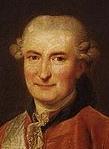












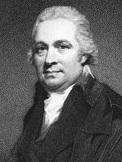

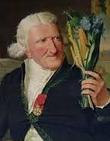


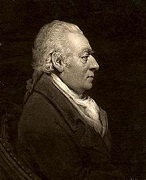
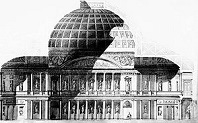
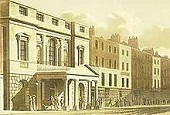
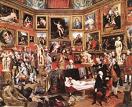
1772 On Jan. 1 Thomas Jefferson marries 22-y.-o. widow (1768) Martha Wayles Skelton (1748-82) (a distant cousin); they have 1 son and 5 daughters, incl. Martha Washington Jefferson "Patsy" Randolph (1772-1836). On Jan. 8 after a palace revolt deposes German-born Danish strudel dictator regent Count Johann Friedrich von Struensee (b. 1737), Frederick, Hereditary Prince of Denmark (1753-1805), father of Christian VIII is made regent of Denmark (until Apr. 14, 1784), with the real power held by Queen Juliana Maria, aided by Ove Hoegh-Guldberg (Høegh-Guldberg) (Guldberg) (1731-1808), who institutes the period of the Guldberg Rule, marked by peace and prosperity; on Apr. 28 Struensee is beheaded, and Queen Caroline Matilda is divorced from Christian VII after confessing her guilt, then imprisoned in Kronberg Castle, followed by Celle Castle in Hanover until she croaks, leaving a son who becomes Frederick VI - she's gotta be somebody's babe, she's so fine? On Jan. 26-29 the Washington-Jefferson Snowstorm hits Va., dropping its greatest snow in the District of Columbia area, 3 ft., becoming the most seen since Euro settlement; both George Washington and Thomas Jefferson record it in their weather diaries after Jefferson and his new bride are caught in it, requiring them to abandon their carriage at Blenheim 8 mi. from Monticello, and complete the journey on horseback, arriving at a cold dark house after the servants had retired for the night. In Mar. England sends the armed revenue cutter Gaspee (Gaspée) to blockade Rhode Island ports and patrol for smugglers, only to run aground near Providence; on June 9 the Hannah, commanded by Capt. Lindsey leaves Newport, and on June 10 sinks it with the assistance of townsmen from Providence (Narragansett Bay), who remove its crew and set fire to it ("America's first blow for freedom"); Britain responds by setting up a Gaspee Commission which bypasses the Rhode Island courts. In Apr. the Pine Tree Riot in New Hampshire results when a man is fined for cutting royal pines without a license. In Apr. Benjamin Franklin gets even with his nemesis Lord Hillborough when the latter's Grand Ohio Co., backed by Thomas and Richard Walpole forces his resignation after its land application is rejected. The Abe Lincoln of England; if it were only that easy in America? On May 14 after African slave James Somersett (Somerset) travels with his massah Charles Stuart of Va. to England in 1769, and his case is seized on by cool take-on-the-establishment English abolitionist atty. Granville Sharp (1735-1813), who had lost a similar case in 1767 over mistreated slave Jonathan Strong, Scottish-born judge William Murray, 1st Earl of Mansfield (1705-93) of the Court of King's High Bench rules (erin go bragh?) in the Somersett Case that there is no legal basis for slavery in England, and that a slaveowner bringing a slave into England even temporarily grants him/her their freedom; slavery is eliminated in England on June 22 - erin go bragh? On May 30 the Russians and Ottomans begin a ceasefire; on Aug. 8 negotiations begin, but soon break down over the Crimea, and the ceasefire is extended until Mar. 20 while both sides jockey for position on the battlefield. In May the frontier Watauga Compact (Assoc.) makes the Watauga Colony in N.C. (Tenn.) (Southwest Territory) virtually a separate repub., and the first constitutional govt. W of the Appalachians; the first Am. Declaration of Independence? On June 13 Mass. Gov. Thomas Hutchinson tells the Mass. assembly that his salary would henceforth come out of customs revenues, along with the salaries of Superior Court judges; the assembly calls this "a despotic administration of government", and threatens secession. On June 30 Samuel Hearne returns to Fort Prince of Wales on the mouth of the Churchill River on Hudson Bay, becoming the first Euro to visit the Arctic and return to tell about it, walking a total of 5K mi. and exploring 250K sq. mi. and proving that there is no Northwest Passage through the continent at lower latitudes. In June England crosses another line by seeming to bypass colonial govt. and treat the Am. colonies as occupied enemy territories? In June Mass gov. Thomas Hutchinson announces that the crown will begin paying judicial salaries instead of the Mass. legislature, and draw the money from customs revenues, causing Cambridge, Mass. to protest the practice as a violation of ancient liberties and practices, and Gen. William Brattle Jr. (1702-76) of Boston tells the meeting that the fact that they are appointed for life will ensure their independence of the crown, causing John Adams to pub. seven essays showing that the tenure of colonial judges, unlike English ones is dependent on the pleasure of the Crown; when the British forces abandon Boston in 1776 Brattle flees to Nova Scotia and kicks the bucket. In June the totally lecherous Marquis de Sade (1740-1814) is forced to flee Marseille for Italy for putting Spanish Fly (cantharides) (from the emerald green Lytta vesicatoria beetle) (which irritates the urethral passages, causing priapism, but in too high dosage can cause permanent damage to the genitals and kidneys, even death) in sweets given to his guests at an orgy, plus sodomy with his servant Latour; after both are sentenced to death in absentia, his mother-in-law obtains an arrest warrant for him, and they are imprisoned in Miolans Fortress, late in the year, but escape after 4 mo. and hide in Lacoste with his wife, where he goes back to doing the wild thang with servants - shouldn't he have flown for Spain? Poland undergoes its first of three gastric bypass surgeries (1793, 1795)? On Aug. 5 the First Partition of Poland (first of three by 1795) between Russia (Catherine II), Prussia (Frederick II the Great), and Austria (HRE Joseph II) robs the Polish-Lithuanian Commonwealth of about half of its pop. and a third of its territory, incl. lake-filled Poznan (Posen) province in W Poland; Austria acquires Galicia, Lodomeria, and the county of Zips; Prussia acquires the seaport of Elbing (Elblag) in N Poland 30 mi. ESE of Gdansk (Danzig), a nd the town of Grodek (Grudziadz) (Graudenz) on the Vistula River 60 mi. S of Gdansk, and Frederick II the Great erects a citadel there (finished 1776). On Sept. 1 Father Junipero Serra founds the Mission San Luis Obispo de Tolosa in Calif. (#5 of 21) halfway between Santa Barbara and Monterey on the site of the Chumash village of Tilhini, named after 13th cent. Bishop St. Louis of Toulouse (1274-97). On Sept. 26 the New Jersey Legislature forbids practicing medicine without a license. In Nov. dissatisfaction with English tax policies helps Samuel Adams (1722-1803) to convince the Boston town meeting at the home of surgeon John Warren (1753-1815) and his brainy wife Mercy Otis Warren (1728-1814) (brother of "taxation without representation is tyranny" atty. James Otis Jr. (1725-83)) to form a Committee of Correspondence, with physician Joseph Warren (1741-75) (John's brother) as chmn., causing others to form throughout the colonies, after which Mercy writes "No single step contributed so much to cement the union of the colonies", going on to become "the Conscience of the Am. Rev.", dissing the stankin' English and Loyalists and corresponding with Abigail Adams, Martha Washington, and English historian Catharine Macaulay, to whom she writes the soundbyte "America stands armed with resolution and virtue. She still recoils at the idea of drawing the sword against the nation from whence she derived her origin. Yet Britain, like an unnatural parent, is ready to plunge her dagger into the bosom of her affectionate offspring"; she also corresponds with men, incl. John Adams, Samuel Adams, John Hancock, Patrick Henry, Thomas Jefferson, and George Washington. On Nov. 20 Samuel Adams anon. pub. The Rights of the Colonists, declaring that all colonists have the right to life, liberty, and property; Va. gov. Lord Dunmore dissolves the Va. House of Burgesses this year, and again in 1773; "In regard to religion, mutual toleration in the different professions thereof is what all good and candid minds in all ages have ever practised, and, both by precept and example, inculcated on mankind. And it is now generally agreed among Christians that this spirit of toleration, in the fullest extent consistent with the being of civil society, is the chief characteristical mark of the Church. Insomuch that Mr. Locke has asserted and proved, beyond the possibility of contradiction on any solid ground, that such toleration ought to be extended to all whose doctrines are not subversive of society. The only sects which he thinks ought to be, and which by all wise laws are excluded from such toleration, are those who teach doctrines subversive of the civil government under which they live." Robert Clive defends his admin. in India in the British House of Commons, trying to explain away his vast wealth, although his own hereditary estate only brings in 500 pounds a year with the soundbyte "By God... I stand astonished at my own moderation". The Thai destroy Phnom Penh. Madhav Rao I Peshwa (b. 1745) dies, and his brother Narayan Rao I Peshwa (1749-73) becomes ruler of the Maratha Empire based in Pune, India (until 1773). The Royal Marriage Act in England gives the monarch the power to veto all royal marriages until the person concerned is 25 years old and has given a year's notice to the privy council. At the instigation of the court of Versailles, Charles Edward Stuart (Bonnie Prince Charlie) (1720-88) marries Louise Maximilienne Caroline Emmanuel of Stolberg-Guedern, Countess of Albany (1752-1824) and moves to Florence. After efforts by army pharmacist Antoine-Augustin Parmentier (1737-1813) (who was forced to eat potatoes while a POW of the Prussians in the Seven Years' War in 1763), the Paris Faculty of Medicine declares potatoes edible; they had been banned since 1748; too bad, the pop. resists potatoes, forcing him into a series of publicity stunts; not until the 1785 famine in N France are they finally accepted as fit for human consumption. he Va. legislature passes legislation to clear the Potomac River for navigation, but it is blocked by the Md. legislature. The French first encounter the 60-tribe Yokuts ("People") in the San Joachin Valley and Sierra Nevada foothills in SC Calif., with a pop. of 18K-50K; too bad, a malaria epidemic in 1833 kills 75% of them. The Inquisition is abolished in France. The "Letters of Junius" are put a stop to by the Man. Cotton machinery exportation is prohibited by Britain to protect English manufacturers. Catherine II of Russia punishes the leaders of the Skoptsy (Skoptzy) religious castration sect - eat me? After being promoted last Aug. to the rank of cmdr., James Cook (1728-79) leaves England on HMS Resolution on his Second Voyage (ends 1775) to circumnavigate Antarctica and discover the fabled Terra Australis. British squatters begin to appear on Oklahoma land in large numbers. Upernavik is founded in Greenland. French explorer Yves Joseph de Kerguelen-Tremarec (Kerguelen-Trémarec) (1734-97) discovers the Antarctic Kerguelen Islands in the South Indian Ocean; too bad, he overhypes them to Louis XV as the fabled Terra Australis, getting him jailed after a 2nd expedition shows them to be desert. Handel's "Messiah" is first performed in Germany. Goethe receives his law degree in Strasbourg and begin practicing law in Frankfurt-am-Main. James Boswell and Dr. Samuel Johnson are in close association from this year until Johnson's death in 1784. Manic-depressive failed atty. William Cowper (1731-1800), who ended up in an asylum in 1763-5, then moved in with clergyman Morley Unwin (d. 1667) and his wife Mary in Huntingdon, finally pops the question and gets engaged to her this year, but next year comes down with religious melancholia, becoming a poet, while his female rock of ages cares for a wretch like him; they never marry. The Gottinger Hainbund, a society for young patriotic German poets is formed. The first carriage traffic begins across Brenner Pass. The Nock Family begins performing in circuses in Switzerland, founding a dynasty that changes its name in 1840 to the Nerveless Nocks, concentrating on daredevil stunts - we get paid to do what we love? The last vol. of the French Encyclopedie is pub. (vol. 1 pub. 1751). Architecture: On Jan. 27 the £36,965 London Pantheon on the S side of Oxford St. opens, built by unknown Weeford-born English neoclassical architect James Wyatt (1746-1813) (making him a star, and rival to Robert Adam), with a central dome reminiscent of the Pantheon in Rome, a main rotunda that's one of the largest rooms in England, and a set of winter assembly rooms (Winter Ranelagh), which Horace Walpole calls "the most beautiful edifice in England"; opening night is attended by 1.7K members of high society paying up to £50 each, incl. eight dukes and duchesses and all the foreign ambassadors; after the King's Theatre in Haymarket burns down in 1789 it is converted into an opera house, but burns down after only one season in 1792; on Apr. 9, 1795 it reopens after being rebuilt; in 1811-12 it is converted to a theatre; in 1833-4 it is rebuilt as a bazaar by architect Sydney Smirke; in 1937 it is demolished to make way for an art deco Marks and Spencer dept. store designed by architect Robert Lutyens. The Bierringerin chime is installed in St. Stephan's Cathedral (Stephansdom) in Vienna, Austria to ring beer hall closing times. Bromberg Canal between the Oder and the Vistula is begun (finished 1775). Birmingham Canal (begun 1768) is finished on Sept. 21; nine days later its engineer James Brindley (b. 1716) dies. Brick Market Inventions: The London firm of Flight and Kelly begins producing barrel organs. The first English patent for colored ink is granted. Mary Delaney (1700-88) of England makes the first botanical collage. Peter Kintzing and David Roentgen (Louis XVI's cabinet maker) build the Joyeuse de Tympanon (Dulcimer Player) for Queen Marie Antoinette in Versailles. Veuve Clicquot Ponsardin champagne house in Reims, France is founded by Philippe Clicquot-Muiron, going on to pioneer advancements in the methode champenoise via the technique of remuage, producing the 1811 comet vintage, the first truly modern champagne, which becomes the favorite drink of the nobles and haute bourgeoisie of Europe. Science: Italian mathematician-astronomer Joseph-Louis Lagrange (Giuseppe Luigi Lagrangia or Lagrancia) (1736-1813) pub. a paper proposing the five Lagrange Points (L1 to L5), gravitational parking spaces. Antoine-Laurent Lavoisier begins experiments to disprove the 1707 phlogiston combustion theory of Georg Ernst Stahl (ends 1783). Scottish chemist Daniel Rutherford (1749-1819) discovers the gaseous element Nitrogen (N) (#14). Joseph Priestley discovers nitrous oxide, which soon begins to be abused in laughing gas parties. Nonfiction: Anon., The Complete Library of the Four Treasuries (Siku Guanshu) (1772-81) (3,462 works in 36.3K vols.; only 7 copies made); another little Qin Dynasty production. Samuel Adams (1722-1803), The Rights of the Colonists. Leonhard Euler (1707-83), Lettres a une Princesse d'Allemagne (Letters to a German Princess); discusses mechanics, optics, acoustics, and astronomy - what a come on line? Johann Gottfried von Herder (1744-1803), Treatise On the Origin of Speech (Language) (Uber den Ursprung der Sprache); takes up where Condillac and Rousseau left off; "I do not want to pursue the hypothesis of the divine origin of language any further on a metaphysical basis, for its groundlessness is clear psychologically from the fact that in order to understand the language of the gods on Olympus the human being must already have reason and consequently must already have language. Still less can I indulge in a pleasant detailing of the animal languages, for, as we have seen, it turns out that they all stand completely and incommensurably apart from human language"; "In all aboriginal languages, vestiges of the sounds of Nature are still to be heard"; "Because sounds of emotion will never turn into a human language, does it follow that nothing else could ever have turned into it?" "The sensations unite and all converge in the area where the distinguishing traits turn into sounds. Thus, what man sees with his eye and feels by touch can also become soundable." John Hunter (1728-93), The Digestion of the Stomach after Death; describes shock and intussusception. Sir William Jones (1746-94), Persian Grammar. William Kenrick (1725-79), Love in the Suds, a Town Ecologue: Being the Lamentation of Roscius for the Loss of His Nyky; accuses David Garrick of homosexuality with Isaac Bickerstaffe, causing Garrick to sue, eliciting an ambivalent apology. Marquis de Mirabeau (1715-89), Essai sur le Despotisme. Carsten Niebuhr (1733-1815), Beschreibung von Arabien (Writings on Arabia) (3 vols.) (1772-8) (Copenhagen). Antonio Scarpa (1752-1832), De Structura Fenestrae Rotundae Auris et de Tympano Secundario, Anatomicae Observationes; structure of the inner ear. F.S. Sullivan (1719-76), Lectures on the Feudal Law and the Constitution and Laws of England. Art: Johann Zoffany (1733-1810), The Tribuna of the Uffizi (1772-8) (Florence). Music: Domenico Cimarosa (1749-1801), Le Stravaganze del Conte (first opera) (Naples). Franz Josef Haydn (1732-1809), Sun Quartets, No. 23-28, Op. 20. Wolfgang Amadeus Mozart (1756-91), Lucio Silla, K135 (opera) (Dec. 26) (Regio Ducal Teatro, Milan); libretto by Giovanni de Gamerra; about Roman dictator Lucius Cornelius Silla (-138 to -78). Carl Stamitz (1745-1801), La Promenade Royale (symphony) (Versailles). Plays: Gyorgy Bessenyei (1747-1811), The Tragedy of Agis (debut); about the Spartans. Richard Cumberland (1732-1811), The West Indian (comedy). Gotthold Lessing (1729-81), Emilia Galotti (tragedy). Novels: Claude Prosper Jolyot de Crebillon (1707-77), Lettres Atheniennes. Mercy Otis Warren (1728-1814), The Adulateur; pub. anon.; disses Mass. gov. Thomas Hutchinson and predicts the Am. Rev. Christoph Martin Wieland (1733-1813), Der Goldene Spiegel oder die Konige van Scheschian; oriental stories. Births: Am. diplomat and U.S. atty.-gen. #6 (1807-11) Caesar Augustus Rodney (d. 1824) on Jan. 4 in Dover, Del.; educated at the U. of Penn. Am. politician-orator ("the last Federalist") Josiah Quincy III (d. 1864) on Feb. 4 in Boston, Mass.; son of Josiah Quincy II (1744-75); educated at Harvard U.; mayor of Boston (1823-8); pres. of Harvard U. (1829-45). English "Anacalypsis" humanist reformer-archeologist (Freemason) Godfrey Higgins (d. 1833) on Jan. 30 in Owston, Yorkshire; educated at Emmanuel College, Cambridge U. German Romantic critic-philosopher-philologist Karl Wilhelm Friedrich von Schlegel (d. 1829) on Mar. 10 in Hanover; brother of August von Schlegel (1767-1845). French utopian socialist reformer Francois Marie Charles Fourier (d. 1837) on Apr. 7 in Besancon (Besançon); proposes phalansteres (cooperative communities) in rural settings. Spanish Romantic poet Manuel Jose Quintana y Lorenzo (d. 1857) on Apr. 11 in Madrid; labors under Napoleon (1808-) and absolutist Ferdinand VII (1814-33). French naturalist (creator of the principle of unity of composition) Etienne (Étienne) Geoffroy Saint-Hilaire (d. 1844) on Apr. 15 in Etampes (near Paris); father of Isidore Geoffrey Saint-Hilaire (1805-61). British laissez-faire economist (Jewish) David Ricardo (d. 1823) on Apr. 18 in London. British Fleet Adm. Sir George Cockburn, 10th Baronet (d. 1853) on Apr. 22 in London 2nd son of Sir James Cockburn, 8th baronet. British gen. Sir. Galbraith Lowry Cole (d. 1842) on May 1 in Dublin, Ireland. German Romantic poet Baron ("prophet of Romanticism") Georg Philipp Friedrich Freiherr von Hardenberg (AKA Novalis) (d. 1801) on May 2 in Oberwiederstedt, Saxony. Indian leader and renaissance man ("Father of Modern India") Rajah (Raja) Ram Mohan (Mohun) Roy Bahadoor (d. 1833) on May 22 in Radhanagore, Bengal. Am. Gen. John R. Coffee (d. 1833) on June 2 in Prince Edward County, Va.; son of Lt. Joshua Coffee (1745-97); grandson of Irish convict Peter Coffee; 1st cousin of Gen. John E. Coffee (1782-1836); cousin of John Coffee Hays (1817-83); friend of Pres. Andrew Jackson. Am. naval commodore John Rodgers Sr. (d. 1838) on July 11 near Havre de Grace, Hartford County, Md.; father of John Rodgers Jr. (1812-82) and John Rodgers III (1881-1926). French noble (last descendant of the House of Conde) Louis-Antoine-Henri de Bourbon-Conde, Duc d'Enghien (d. 1804) on Aug. 2 in Chanteau de Chantilly; only son of Prince Louis Henry II of Conde and Louise Marie Therese Bathilde d'Orleans (daughter of Duc Louis Philippe I of Orleans, and sister of Philippe Egalite); cousin of Louis XVI. British Gen. Rowland Hill, 1st Viscount Hill (d. 1842) on Aug. 11 in Hawkstone Hall near Prees, Shropshire; educated at the King's School, Chester; created viscount in 1842. Dutch king #1 (1815-40) and grand duke of Luxembourg (1815-40) William I (Willem Frederik) (William Frederick), Prince of Orange-Nassau (d. 1843) on Aug. 24 in Huis ten Bosch, The Hague; eldest son of Prince William V of Orange (1748-1806) and Wilhelmina of Prussia. Dutch adm. (for Russia) Login Petrovich Geiden (Lodewijk Sigismund Gustaaf, Count van Heiden, Lord of Reinestein (d. 1850) on Sept. 6 in Zuidlaren, Drenthe Province, Netherlands; joins the Russian navy in 1795, and works his way up to commanding the Russian fleet at the 1827 Battle of Navarino, after which he is called "BeBe" (Father) by the Greeks and Russians. Hungarian "Himfy's Loves" Romantic poet Sandor Kisfaludi (d. 1801) on Sept. 27 in Sumeg. English Romantic "Rime of the Ancient Mariner", "Kubla Khan" Lake poet-critic (opium addict) Samuel Taylor Coleridge (d. 1834) on Oct. 21 in Ottery St. Mary, Devonshire; son of John Coleridge (1719-81), vicar of Ottery St. Mary Parish; father of Hartley Coleridge (1796-1849), Sara Coleridge (1802-52), and Derwent Coleridge (1800-83); uncle of Henry Nelson Coleridge (1798-1843) and John Duke Coleridge, 1st baron Coleridge (1820-94); grandfather of Herbert Coleridge (1830-61) and Ernest Hartley Coleridge (1846-1920); great-granduncle of Mary Elizabeth Coleridge (1861-1907); educated at Jesus College, Cambridge U.; friend of William Wordsworth (1770-1850). U.S. atty-gen. #9 (1817-29) (longest tenure until ?) William Wirt (d. 1834) on Nov. 8 in Bladensburg, Md.; prosecutor at Aaron Burr's 1807 treason trial; Swiss father, German mother. German philologist Johann Gottfried Jakob Hermann (d. 1848) on Nov. 28 in Leipzig; educated at the U. of Leipzig; teacher of Leopold von Ranke (1795-1886). English meteorologist-chemist ((Quaker turned Plymouth Brethren) ("Father of Meteorology") Luke Howard (d. 1864) on Nov. 28 in London. Am. Disciples of Christ founder Barton Warren Stone (d. 1844) on Dec. 24 in Port Tobacco, Md.; starts out as a Presbyterian minister. English scholar (translator of Dante) Henry Francis Cary (d. 1844) on Dec. 6 in Gibraltar. German brewer Franz Xaver Zacherl (d. 1849) in Munich. Deaths: Swedish mystic-philosopher Emmanuel Swedenborg (b. 1688) on Mar. 29 in London. German duke of Courland (1737-72) Ernst Johann von Biron (b. 1690) on Dec. 29 (Dec. 18 Old Style) in Mitau. Am. educator Samuel Johnson (b. 1696). Russian gen. Count Pyotr Semyonovich Saltykov (b. 1700) on Dec. 26 in Marfino. German sculptor Johann Michael Feuchtmayr (b. 1709). French Acadian leader Jean-Louis Le Loutre (b. 1709) on Sept. 23. English Bridgewater Canal engineer James Brindley (b. 1716) on Sept. 30 in Turnhurst. Am. Quaker abolitionist preacher John Woolman (b. 1720) on Oct. 7 in York, England (smallpox). French actress Marie Justine Benoite Duronceray (b. 1727). German physician Count Johann Friedrich von Struensee (b. 1737) on Apr. 28 in Copenhagen (beheaded).
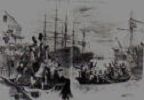





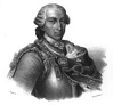





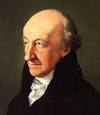



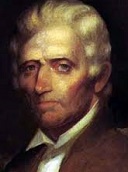

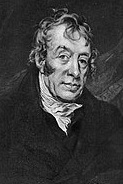






1773 On Jan. 12 the first public museum in America is established in Charleston, S.C. On Jan. 17 British explorer James Cook (1728-79) and his crew become the first to cross the Antarctic Circle as they search for a possible continent of Antarctica, but they sight no land while becoming the first to circumnavigate it; en route they visit the Friendly Islands (AKA Tonga) (Polynesian "Tonga" = south) during the yearly festival of first fruits to the god Tu'i Tonga, and the chiefs want to kill him but can't agree on a plan, causing him to think them real friendly? On Feb. 20 Sardinian king (since 1730) Charles Emmanuel III (b. 1701) dies, and his son Victor Amadeus III (1726-96) becomes king of Sardinia-Piedmont (until 1796). In Mar. the Va. Assembly proposes the formation of an intercolonial network of Committees of Correspondence, which are called by a loyalist in Mass. "the foulest, subtlest, and most venomous serpent ever issued from the egg of sedition" - welcome to the Twitter-Facebook American Spring? Lipton Broken sleeps with the fishes? On Apr. 27 Parliament (put up to it by Lord North to help his friends) passes the Tea Act (British East India Co. Regulating Act) to save the British East India Co., which is on the verge of bankruptcy but has 17M pounds of surplus tea in British warehouses; it dumps tea on the Am. colonies by refunding the British duty of twelve pence a pound, leaving only the three pence duty to collect at the colonial port; although this makes English tea cheaper than Dutch black market tea, it also lets the EIC bypass the existing wholesalers and establish a monopoly which cuts out the colonials; the outraged colonists force the tea back in New York City and Philly, cause it to be mothballed in warehouses in Charleston, S.C. (later used to finance the Revolution), but face determined opposition in Boston, where two of Gov. Hutchinson's sons are among the consignees. In Apr. Ahmed Shah Durrani (b. 1722) dies, and his 2nd son Timur Shah Durrani (1748-93) becomes Durrani shah #2 of Afghanistan in Khorasan (until May 18, 1793). On May 8 after returning to Egypt, Egyptian sultan Ali Bey Al-Kabir (b. 1728) is defeated and killed by one of his sons-in-law near Cairo. On July 4 14-y.-o. ever-seasick Horatio Nelson (1758-1805) leaves England to search for a Northwest Passage under Capt. Constantine Phipps; they give up by Sept. - breathe into the bag? On July 21 Pope (since 1769) Clement XIV follows through on his campaign promise, and issues the brief Dominus ac Redemptor, suppressing the evil scheming troublesome Satanic (but well-dressed and well-heeled) Jesuits (Society of Jesus) "in the name of peace of the Church and to avoid a secession in Europe", and HRE Joseph II gleefully expels them from the empire; too bad, the Jesuits load onto ships in Spain and Portugal, and are not wanted by Italy, and after being warned off they end up in Corsica; the whole thing was backed by Louis XV, who blamed them for starting the Seven Years' War which caused them to lose their colonies, and Clement XIV did it for political not theological reasons; coincidence or not, neither Clement XIV nor Louis XV last much over a year before croaking; a coincidence that Napoleon, who comes from Corsica signs a concordat in 1801 with Pope Pius VII, who crowns him emperor of France in 1804 and then restores the Jesuits in 1814? - you are like a hurricane, there's calmness in your eye, and I'm getting blown away? On July 25 the Boston and Maine Railroad, the first major line in British North Am. is completed. In Sept. Daniel Boone (1734-1820) returns to Ky. (Kentucky County, Va.), with several settler families (50 people); on Oct. 9 after his son James Boone and several others leave camp for supplies, a band of Delawares, Shawnees, and Cherokees attack them, capture James Boone and another boy, and gruesomely torture them to death, causing the whole party to turn back. On Nov. 30 the Boston town meeting in Old South Church warns officials not to assist the landing of the hated tea ships, but to wait until Dec. 16, when it would be legal to seize the cargo after 20 days in port; either way the ships cannot legally leave the harbor without discharging their cargo. In Nov. after reforming Viennese opera to rid it of too much Italian influence, German composer Christoph Willibald Ritter von Gluck (1714-87) moves to Paris, where he demonstrates his new Italian-French fusion opera with eight operas. On Dec. 3 the First Charleston Tea Party in S.C. sees townsmen lock the hated tea in the Exchange bldg. rather than dump it in the water; 2nd on Nov. 21, 1774. The political protest that turns Americans into coffee drinkers? On Dec. 16 (Thur.) at 4 p.m. about 50 colonials and members of the Committee of Correspondence meet at the home of Boston Gazette ed. Benjamin Edes (1732-1803), who serves them from an ever-full China rum punchbowl (replentished by his son Peter) (later given to the Mass. Historical Society); about 6 p.m. Samuel Adams says "This meeting can do nothing more to save the country", and the drunken bums, er, patriots leave to get more drunk at the Green Dragon Tavern on Union St. in North End, Boston (founded 1743), home of the Freemason Lodge of St. Andrew, then dress up in Edes' office and stage the Boston Tea Party during the moonlit night, as a mob of 200 Am. colonists, incl. Samuel Adams (1722-1803), John Hancock (1737-93), Thomas Wells (a blacksmith), and Samuel Smith (1714-85) (grandfather of Mormonism founder Joseph Smith Jr.) (not really - just Mormon propaganda?) disguised as negroes and Mohawks with soot-darkened faces (the English taxes were based on a desire to make the Americans pay their expenses in the French and Indian War - get it?) gather at Griffin's Wharf, then board and dump three shiploads (342 chests) (45 tons) of tea valued at £18K into the S end of Boston Harbor (between modern-day Congress St., Atlantic Ave., and Northern Ave.), while another 2K-8K people urge them on from the docks; the ships they take over are the Dartmouth, Eleanor, and Beaver (dart eleanor beaver mouth jokes here?); the William was destroyed in a storm and didn't make it; four days later Paul Revere gallops into New York City with the news, and 18-y.-o. Charlestown, West Indies-born Alexander Hamilton (1755-1804), a student at King's (later Columbia) College in New York pub. his first political piece in John Holt's New-York Journal, titled Defence and Destruction of the Tea; Boston merchants are not happy with the wanton destruction of property by the rebels, and Ben Franklin calls on Boston to pay for the tea and apologize to prevent the Brits from closing the port, but instead of trying to undermine the credibility of the radicals and defuse the situation, mad king George III writes to Lord North that "The colonists must either submit or triumph", and instructs him to discipline all of Boston. On Dec. 25 after Benjamin Franklin brings to the attention of the Mass. Assembly certain Letters by Royal Gov. Thomas Hutchinson in which he asks for "abridgment of what are called English liberties", it sends a petition to Parliament requesting Hutchinson's removal. Warren Hastings (1732-1818), becomes British gov.-gen. of India #1, founding the Indian Civil Service; there is a famine in Bengal. Denmark cedes the duchy of Oldenburg to Russia. Cossack serf (former Russian army lt.) Yemelyan Ivanovich Pugachev (1741-75) claims to be assassinated Tsar Peter III, starting Pugachev's Rebellion by Yaik Cossacks in Russia; after he proclaims a new govt. and promulgates an end to serfdom from the Volka River to the Urals, he is captured and beheaded in Jan. 1775, causing Catherine II's ideas about reforming serfdom to turn sour, clamping down on them even harder. The Tay Son brothers of Vietnam capture the city of Qui (Quy) Nhon, freeing merchants from restrictive laws and earning their financial support, scaring the Ngyuen lords, who make peace with Siam and give up some conquered lands, ending the Nguyen War (begun 1770), making Siamese king Taksin go for the title of Great, and causing him to send an envoy to Chinese emperor (since 1736) Qing Qian Long, who recognizes him as king of Siam; too bad, unifying his realm proves so hard that he goes nuts, claiming he's the Buddha and flogging monks who don't worship him?; meanwhile the rival northern Trinh lord Tringh Sam sees his chance and ends a cent. of peace, capturing Nguyen capital Phu Xuan (Hue City), and forcing the Nguyen lords to flee to Gia Dinh (Saigon), allowing the Tay Son brothers to kick butt and gain support. Narayan Rao Peshwa (b. 1749) is assassinated by his uncle Raghunath Rao, who usurps the throne of the Maratha Empire in India; too bad, the dead guy's widow Gangabai gives birth to son Sawai ("One and a Half") Madhav Rao II Peshwa (1774-95), causing 12 Maratha chiefs, led by Nana Phadnis (1742-1800) to side with him, starting the First Anglo-Maratha War (ends 1782). The Irish parliament considers an Absentee Landlord Tax, which terrifies English MPs even though it fails to pass. Am. colonial govts. begin purchasing large numbers of rifles. Black Russian Gen. Abram Petrovich Gannibal helps facilitate the visit of French Encyclopedist Denis Diderot to Russia at the invitation of Catherine II the Great. Scottish merchant capt. John Paul (b. 1747) kills the leader of a mutinous crew in Tobago, then escapes prison before trial, returning to his adopted home of Fredericksburg, Va. and becoming a fugitive from British justice, causing him to take on the surname of Jones to hide his identity - your attorney wants to take you to his office right now? The British East India Co. founds a settlement at Balambangan in Sabah in N Borneo, but the natives force them out by 1775. Toronto ("meeting place"), Canada (modern pop. 640K/2.8M) is founded as a British garrison. The first shipment of ginseng from Boston to China begins, starting a shipping boom. Samuel Enderby (1717-97) a whaling co. called Southern Fishery, which becomes Samuel Enderby & Sons in 1775 when an embargo is placed on whale oil exports from New England due to the Am. Rev. War. The Swedish Nat. (Royal Dramatic) Theater is founded in Stockholm by Gustavus III, becoming known as the Venice of the North. The Philadelphia Museum of Art in Penn. is founded. James Rivington founds the New-York Gazeteer at the foot of Wall Street, becoming the rival to the New York Journal. German lit. giant Christoph Martin Wieland (1733-1813) founds Der Teutsche Merkur, which becomes the #1 lit. review in Germany (until 1789). English explorer James Bruce (1730-94) returns from Abyssinia with three copies of the long-lost Book of Enoch. James Bowell is admitted to Dr. Johnson's circle, and they make a trip together to Scotland and the Hebrides. 14-y.-o. William Pitt the Younger is given one bottle of port wine a day for his gout. Architecture: Christ Church (brick with white stone quoins and keystones in the window arches) in Alexandria, Va. (begun 1767) is finished; construction costs are paid in tobacco. Queen Square in London, England is completed. Inventions: The Shropshire Process for making iron is invented in England, and in 1779 the first cast iron bridge begins construction over the Severn River at Coalbrookdale in Shropshire (finished 1792). C.G. Kratzenstein of Copenhagen succeeds in reproducing human vowels mechanically using resonance tubes connected to organ pipes. Swiss inventors Pierre Jacquet Droz (1721-90) and Henry Louis Jaquet-Droz (1752-91) invent the first automaton that can write - but does it have a short skirt and a big pair of knockers? Nonfiction: Charles Bonnet (1720-93), Recherches Philosophiques Sur les Preuves du Christianisme (Philosophic Research Concerning the Proofs of Christianity). Charles Burney (1726-1814), The Present State of Music in Germany, the Netherlands, and the United Provinces; gets him chosen as a fellow of the Royal Society - too many choices, or maybe too playful, wild, or romantic, or maybe too off the beaten path, or maybe not sacred enough? Madame Louise d'Epinay (1726-83), Conversations with Emilie; dialogue with her daughter on how to get an education in a Dick Almighty world. John Erskine of Carnock (1695-1768), Institutes of the Law in Scotland (posth.). Johann Wolfgang von Goethe (1749-1832), Johann Gottfried von Herder (1744-1803), and Justus Moser (1720-94), Von Deutscher Art und Kunst: Einige Fliegende Blatter (Blätter) (Of German Art and Style: A Loose Leaf); manifesto of the German Sturm und Drang (Ger. "storm and stress", "storm and urge") Romantic movement, inspired by Johann Gottfried von Herder which digs on German folk songs, Gothic architecture, and Shakespeare, and lasts until the early 1780s. Wilhelm Heinse (1749-1803), Die Kirschen. Johann Gottfried von Herder (1744-1803), Voices of the People in Their Songs (Stimmen der Volker in ihren Liedern). Extract from a Correspondence about Ossian and the Songs of Ancient Peoples (Auszug aus einem Briefwechsel über Ossian und die Lieder alter Völker); "A poet is the creator of the nation around him, he gives them a world to see and has their souls in his hand to lead them to that world." William Kenrick (1725-79), Dictionary with Guide to Pronunciation; indicates vowel sounds and incl. new words used by the Romantic movement. Friedrich Gottlieb Klopstock (1724-1803), Die Gelehrtenrepublik; a scheme for the regeneration of German letters. Gotthold Lessing (1729-81), Zur Geschichte und Literatur (1773-81). Samuel Johnson (1709-84) and George Steevens (1736-1800), The Works of Shakespeare with the Corrections and Illustrations of Various Commentators (10 vols.). Charles White (1728-1813), A Treatise on the Management of Pregnant and Lying-in Women; recommends natural childbirth, with the delivery not assisted until the baby's shoulders have been expelled, and that new mothers should get out of bed ASAP, also recommending cleanliness and ventilation. Music: Gottfried August Burger (1747-94), Lenore (ballad). Wolfgang Amadeus Mozart (1756-91), Exsultate Jubilate (K.165) (motet) (Jan. 17) (Church of San Antonio, Milan); his first masterpiece? Art: Dirk van der Aa (1731-1809), Playing Putti on Clouds (Spielende Putten auf Wolken). Philip Dawe (-1832), The Macaroni: A Real Character at the Late Masquerade (drawing) (Scavor Vivre and Theatrical Mag., June 24). Jean-Antoine Houdon (1741-1828), Denis Diderot [1713-84] (sculpture). Augustin Pajou (1730-1809), Madame du Barry (1743-93] (sculpture). Sir Joshua Reynolds (1723-92), The Graces (Three Ladies) Decorating a Statue of Hymen. Plays: Johannes Ewald (1743-81), Pebersvendene (Old Bachelors) (comedy). Oliver Goldsmith (1730-74), She Stoops to Conquer (comedy) (Mar. 15) (London); a big hit; Kate Hardcastle; "O, confound my stupid head. I shall be laughed at over the whole town... the Dullissimo Maccaroni" (Marlow); "Give me the young, the gay, the men of spirit./ Ye travell'd tribe, ye macaroni train/ Of French friseurs, and nosegays, justly vain,/ Who take a trip to Paris once a year/ To dress, and look like awkward Frenchmen here." Johann Wolfang von Goethe (1749-1832), Gotz (Götz) von Berlichingen (tragedy); a 16th cent. German robber knight leads a Romantic nat. German revolt against Roman Catholic control; helps kick off the zoom zoom zoom iPod I worship I love it Sturm und Drang movement; Urfaust (first version of Faust). William Kenrick (1725-79), The Duellist (Covent Garden, London) (Nov. 20) (1 perf.). Henry Mackenzie (1745-1831), The Prince of Tunis (Edinburgh); his first and only dramatic hit. Mercy Otis Warren (1728-1814), The Defeat; pub. anon.; another attack on Mass. gov. Thomas Hutchinson. Poetry: Anon., The Adulteress. Thomas Day (1748-89), The Dying Negro; an English adherent of Rousseau denounces Negro slavery in North Am. William Heard, The Tryal of Dramatic Genius. John Trumbull (1750-1831), The Progress of Dulness (1772-3); satire of current educational methods. Phyllis Wheatley (1753-84), Poems on Various Subjects, Religious and Moral; written by a freed slave after a trip to England, where it is pub., becoming the first book pub.by an African-Am., throwing a tire iron into the whites' "inherent Negro inferiority" window?; "Twas mercy brought me from my Pagan land,/ Taught my benighted soul to understand/ That there's a God, that there's a Saviour too;/ Once I redemption neither sought nor knew./ Some view our sable race with scornful eye,/ 'Their colour is a diabolic die.'/ Remember, Christians, Negros, black as Cain,/ May be refin'd and join th'angelic train"; To the Right Honorable William, Earl of Dartmouth; compares the desire of the Am. colonies for independence with her own desire to be free; too bad, after returning to Am., she marries freed black John Peters, and her fame fades. Novels: Benjamin Franklin (1706-90), Rules by Which a Great Empire May Be Reduced to a Smaller One (parody); Edict of the King of Prussia (parody). Albrecht von Haller (1708-77), Alfred. Henry Mackenzie (1745-1831), The Man of the World. Births: British snubbed ambassador (gov.-gen. of India in 1823-8) William Amherst, 1st Earl Amherst (d. 1857) on Jan. 14; nephew of Jeffrey Amerst, 1st Baron Amherst (1717-97), inheriting his title. French "Biographie Universelle" publisher-writer Louis-Gabriel Michaud (d. 1858) on Jan. 19 in Castle Richemont; brother of Joseph Francois Michaud (1767-1839). English prince (Freemason) Augustus Frederick, Duke of Sussex (d. 1843) on Jan. 27 in Buckingham House, London; 6th son of George III and Charlotte of Mecklenburg; created duke in 1801; asthma keeps him from joining the military, making him George III's only son who doesn't pursue a military career. U.S. Whig pres. #9 (1841) "Tippecanoe" William Henry Harrison (d. 1841) on Feb. 9 in Berkeley, Charles City County, Va.; last pres. born before the Am. Rev. begins; son of DOI signer Benjamin Harrison V (1726-91); father of U.S. Sen. John Scott Harrison, father of U.S. pres. #23 Benjamin Harrison (1833-1901); educated at Hampden-Sidney College (Va.). Am. Navy commodore Isaac Hull (d. 1843) on Mar. 9 in Shelton (Derby), Conn. Am. mathematician-navigator Nathaniel Bowditch (d. 1838) on Mar. 26 in Salem, Mass. French PM #13 (1834) marshal Etienne Maurice Gerard (Gérard), Comte Gerard (Gérard) (d. 1852) on Apr. 4 in Damvilliers, Lorraine. French ultraroyalist PM #6 (1821-8) Jean-Baptiste Guillaume Joseph Marie Anne Seraphin (Séraphin), comte de Villele (Villèle) (d. 1854) on Apr. 14 in Toulouse. Austrian reactionary statesman-diplomat prince Klemens Wenzel Nepomuk Lothar von Metternich Winneburg (d. 1859) on May 15 in Coblenz; his personal experience with the French Rev. sets off his reactionary circuits? Swiss historian-economist ("the Rollin of French History" - Charles Augustin Sainte-Beuve) Jean Charles Leonard Simonde de Sismondi (d. 1842) on May 19 in Geneva; claims descent from House of Sismondi in Pisa. German Romantic poet-novelist-critic Johann Ludwig Tieck (d. 1853) on May 31 in Berlin. Am. Dem.-Repub. (Old. Repub.) (Quids) states rights' politician-statesman-orator John Randolph of Roanoke (d. 1833) on June 2 in Cawsons, Prince George County, Va.; 2nd cousin of Edmund Jennings Randolph; claims Pocahontas as an ancestor; educated at Princeton and Columbia U.; a childhood illness leaves him impotent, beardless and high-voiced. English polymath physician-physicist-linguist (Quaker) ("the last man who knew everything") Thomas Young (d. 1829) on June 13 in Milverton, Somerset; educated at the U. of Edinburgh, U. of Gottingen, and Emmanuel College, Cambridge U. Am. architect Asher Benjamin (d. 1845) on June 15 in Hartland, Conn. French astronomer Claude Messier (d. 1817) on June 26. French zoologist Frederic Cuvier (d. 1838) on June 28 in Montbeliard, Doubs; younger brother of Georges Cuvier (1769-1832). German Romantic writer-jurist Wilhelm Heinrich Wackenroder (d. 1798) on July 13 in Berlin; life friends (gay?) with Johann Ludwig Tieck (1773-1853). Czech #1 philologist-poet Josef Jungmann (d. 1847) on July 16 in Hudlice (near Beroun). Am. scholar (pres. #9 of Yale College, 1817-46) Rev. (Congregationalist) Jeremiah Day (d. 1867) on Aug. 3 in New Preston, Conn.; educated at Yale U. Am. Dem.-Repub. U.S. war secy. #12 (1828-9) and military leader Peter Buell Porter (d. 1844) on Aug. 14 in Salisbury, Conn; educated at Yale College. German philosopher Jakob Friedrich Fries (d. 1843) on Aug. 23. French anti-Napoleon marshal Louis-Auguste-Victor, Counte de Ghaisnes de Bourmont (d. 1846) on Sept. 2. U.S. First Lady (1801-9) Martha Washington Jefferson Randolph (d. 1836) on Sept. 27 in Monticello, Va.; daughter of Thomas Jefferson (1743-1826) and Martha Wayles Skelton Jefferson (1748-82); wife (1790) of Thomas Mann Randolph Jr. (1768-1828). France's last king (1830-48) ("the Citizen King") Louis Philippe I, Duke of Orleans (Duc d'Orléans) (d. 1850) on Oct. 6 in Paris; son of Louis Philippe Joseph, duke of Orleans (1747-93), of the house of Bourbon-Orleans, who is executed during the Terror; known as the duc de Valois until 1785, then the duc de Chartres until 1793, when he goes into exile until 1815; married to the niece of Maximilian of Lorraine. Scottish lit. critic and jurist Francis Jeffrey, Lord Jeffrey (d. 1850) on Oct. 23 in Edinburgh. U.S. Sen. (Whig-Tenn.) (1825-40) Hugh Lawson White (d. 1840) on Oct. 30 in Iredell County, N.C. English Peterloo Massacre radical speaker Henry "Orator" Hunt (d. 1835) on Nov. 6 in Upavon, Wiltshire. English Whig politician Henry Richard Vassall Fox, 3rd Baron Holland (d. 1840) on Nov. 21 in Winterslow House, Wiltshire; grandson of Henry Fox, 1st Baron Holland (1705-74); nephew of Charles James Fox (1749-1806); wife of Elizabeth Vassall (1770-1845). Scottish Browning Motion botanist Robert Brown (d. 1858) on Dec. 21 in Montrose; becomes known for his collecting work in Australia. English aviation pioneer ("father of aviation") Sir George Cayley (d. 1857) on Dec. 27 in Brompton-by-Sawdon (near Scarborough), Yorkshire. Am. slave breed mare (black) Sally Hemings (d. 1835) in Shadwell, Albemarle County, Va.; three-quarters white; daughter of Elizabeth "Betty" Hemings (1735-1807) and white plantation owner John Wayles (1715-73); half-sister of Martha Wayles Skelton Jefferson (1748-82), wife of her owner Thomas Jefferson (1743-1836), who hooks up with her after Martha dies and fathers six children by her. Scottish utilitarian philosopher-historian-economist James Mill (d. 1836) in Northwater Bridge, Montrose; father of John Stuart Mill (1806-73); educated at the U. of Edinburgh. Deaths: English statesman-writer Lord Chesterfield (b. 1694); leaves a bunch of good quotes: "It is an undoubted truth, that the less one has to do, the less time one finds to do it in"; "In scandal, as in robbery, the receiver is always as bad as the thief"; "[History is] a useless heap of facts." Scottish nonconformist clergyman John Glas (b. 1695) in Nov. German Baroque flutist-composer Johann Quantz (b. 1697) on July 12 in Potsdam. French-English engraver Hubert-Francois Gravelot (b. 1699) on Apr. 20 in London in Paris. English librettist Charles Jennens (b. 1700) on Nov. 20. Italian sculptor Pietro Bracci (b. 1700) in Rome. English inventor Chester Moore Hall (b. 1703) on Mar. 17 in Sutton, Surrey. Italian architect-engineer Luigi Vanvitelli (b. 1700) on Mar. 1 in Caserta. English writer John Entick (b. 1703) in May. English poet George Lyttleton (b. 1709). English writer Father Alban Butler (b. 1710) on May 15 in Saint-Omer, France. Spanish naval officer Jorge Juan y Santacilia (b. 1713) on June 21 in Madrid (cerebral amoebic infection?) Saxon-born Russian gen. Count Gottlieb Heinrich Tottleben (b. 1715) on Mar. 20 in Warsaw. Afghani emir Ahmed Shah Durrani (b. 1722) in Apr. Egyptian Mamluk ruler (1760-72) Ali Bey Al-Kabir (b. 1728) on May 8 near Cairo (KIA).


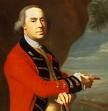








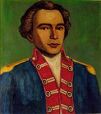

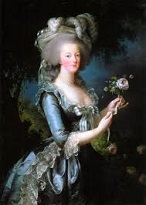


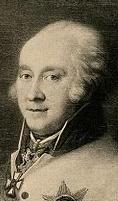
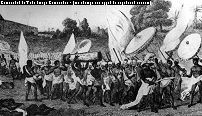



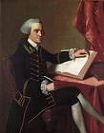

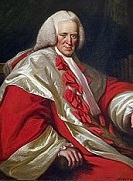


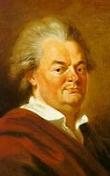


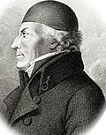


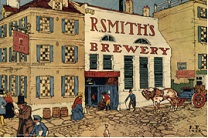
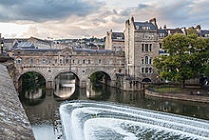
1774 On Jan. 16 the Creek War breaks out between settlers in Ga. and the Creek Indians over recently stolen, er, ceded lands; on Mar. 31 Head Turkey is murdered near Augusta, Ga. by Thomas Fee while on his way to Savannah to negotiate a peace treaty; Fee is jailed, escapes, and a $100 reward is posted to pacify the Creeks. On Jan. 21 sultan (since 1757) Mustafa III (b. 1717) dies, and his caged (for 43 years) younger brother Abdul Hamid (Abdulhamid) I (1725-89) becomes Ottoman sultan #27 (until Apr. 7, 1789), going on to become known for his religiosity and graciousness and passion for breeding Arabian horss while attempting to revive the Janissaries - if only these walls could speak? On Jan. 25 John Malcolm, comptroller for the customs service in Boston, Mass. is attacked by Am. revolutionaries and beaten, tied to a Liberty Tree, and tarred and feathered, with the pine tar applied so hot that his skin strips off his back, after which Malcolm sailes back to London with samples for display. On Jan. 29 Benjamin Franklin (1706-90), Mass. agent to the British govt. (dressed in blue spotted Manchester velvet) is excoriated in Parliament's Privy Council (meeting in the Cockpit) by Scottish barrister Alexander Wedderburn, 1st Earl of Rosslyn (1733-1805) for his role in pub. some purloined letters damaging to Mass. Gov. Thomas Hutchinson; the Mass. petition against Hutchinson is denied; the next day Franklin is removed from his job as Am. postmaster, and he lies low in England for the rest of the year. On Feb. 22 British Law Lords rule that authors do not have perpetual copyright. On Apr. 27 the Battle of Pipe Creek between white British settlers in Ky. and the Shawnee tribe of the Ohio sees a few wounded on both sides, but escalates the tensions, and on Apr. 30 some Mingo Indians, still at peace with the whites go to Baker's Tavern on the W bank of the Ohio River at Yellow Creek for their usual rum, and take a small white child with them, pissing-off the settlers, who get them drunk and then massacre them to rescue the child, causing Mingo chief Logan to declare war on the palefaces and quit acting as the buffer between them and the Shawnee, and begin pillaging frontier settlements on the W side of the Monongahela River; causing Va. gov. Lord Dunmore to launch Lord Dunmore's War (ends Oct. 1774), calling on the House of Burgesses to send an elite volunteer militia force to kick Shawnee and Mingo butt S of the Ohio River. In Apr. the outraged British Parliament passes the Intolerable (Coercive) Acts in reaction to the Boston Tea Party; civil liberties are suspended; on Mar. 31 the Boston Port Bill orders the port of Boston closed on June 1; on May 12 after Observations on the Boston Port Bill by Josiah Quincy appears, clearly indicating war as the only option with independence the goal, the British colonists vote to renew their non-importation policies; on May 13 Thomas Hutchinson is replaced as military gov. of Mass. by Gen. Thomas Gage (1719-87), and returns to England; Gage brings four British regiments with him to keep the peace. On Apr. 22 a group of sea captains led by Alexander McDougall dress up as Mohawks and storm the British ship HMS London in New York Harbor to stage a copycat tea party. On May 10 after uttering the immortal soundbyte [The state will last my time], "Apres moi le Deluge" (After me the Deluge), French king (since Sept. 1, 1715 - 58 years 8 mo.) Louis XV the Well-Beloved (b. 1710) (of his many mistresses?) dies of smallpox (a coverup for syphilis, or murder by the Jesuits?), as signaled by a candle in his window being snuffed out; after he and his bubble-headed Austrian wife Marie Antoinette cry it out, on June 11 Louis XV's peasant-faced oldest (20-y.-o.) grandson Louis XVI (1754-93) is crowned as Bourbon king #5 of France (until 1793); he is ordinary but well-meaning, an amateur locksmith and excellent shot, letting himself be ruled by kinda-beautiful-sexy blonde Austrian wife Marie Antoinette (1755-93), and by his brothers the Count of Artois and the Count of Provence, letting the country go to Hell in a handbasket while she enjoys a no-limit credit card and mounts up big gambling debts at backgammon, stays up all night while he sleeps, and plays with pretty boys in what is thought a shocking manner, even though she is probably faithful to him; during his reign the female hairstyle grows even more extravagant, Antoinette wearing a 3-foot tower, and reaching the ultimate of the Coiffure a la Fregate (l'Independance) (le Triomphe de la Liberte), complete with a model ship on top right before the French Rev.; Louis XVI banishes Louis XV's mistress Comtesse du Barry from court, and she lives in her chateau at Luciennes, fleeing to England when the French Rev. begins; how could he know that the July 4, 1776 Am. Rev. will end up getting him executed before he reaches 40? On May 23 the Chestertown Tea Party on the Chester River in Md. is a copycat of the Boston Tea Party. On June 22 the Quebec (British North Am.) Act of 1774 is passed by the British Parliament, allowing for Roman Catholics to hold office, reestablishing old boundaries of Canada, extending Quebec's boundaries S to the Ohio River, and imposing Roman-based French civil law; this all angers Americans who fear that priest-ridden Roman Catholicism is being "established" there. On June 20 the Russians led by Gen. Alexander Suvorov badly defeat the Ottomans at the Battle of Kozludzha, forcing the Turks back to the negotiating table, sealing Suvorov's rep and causing the village to be renamed after him. On July 6 the Sons of Liberty holds a mass meeting near the grassy Common (the Fields) near King's College in Manhattan, in the shadow of an 80-ft. pole with the word LIBERTY on its gilded weather vane; 19-y.-o. Alexander Hamilton gives a spontaneous speech which causes him to become a youthful hero? In the summer the New York Provincial Congress declares that anyone aiding the British enemy is to be disarmed, imprisoned, or exiled. On July 11 the Klck Incident shows the way the Mohawks are being cheated of their lands by the stinking British settlers. On July 12-15 the Battle of Kazan sees Yemelyan Pugachev's rebels defeat Russian troops and siege the rest in the Kazan Kremlin, causing many of them to defect to his side, after which two battles on July 13 and 15 are a V for Russian forces under Estonian-born Lutheran Gen. Ivan Ivanovich Michelson (Johann von Michelsohnen) (1740-1807), causing the remaining 500 of 25K incl. Pugachev to retreat across the Volga River and wait for the inevitable. On July 21 the Fifth Russo-Turkish War (begun 1768) ends with a Russian V and the Treaty of Kuchuk Kainarji (Kucuk Kaynarca), giving Russian trading ships freedom to navigate in Turkish Black Sea waters, and control of the Crimean seaports of Azov and Kerch; the Crimean Khanate becomes independent under Russian suzerainty; Russia receives full possession of Azov and land S to the Kuban River, along with the territory between the Dnieper and S Bug Rivers, making the Dnieper River the Russian border; Turkey renounces claims to Kabarda in the N Caucasus; Russia becomes the official protector of Orthodox Christians in the Ottoman Empire; Turkey is forced to pay 4.5M rubles reparations, and promise lenient treatment of Moldavia and Wallachia, which is placed under Russian protection despite Turkish suzerainty since the year 1411; Turkey is forced to cede NW Moldavia (Bukovina) to the Hapsburgs; instead of bringing peace, the Russkies use the treaty for excuses to go to war to take more territory from the sick Ottoman Empire, expanding S and E until it bumps up against the Western powers. By late Aug. after Penn. assemblyman James Smith (1719-1806) proposes it, all of the colonies except Georgia have picked their delegates to the First Continental Congress, which convenes on Sept. 5 in Philadelphia in the red-black brick Carpenters' Hall; on Sept. 7 it starts its first session with a 3-hour prayer and Bible study, in which Psalm 35 ("Contend, O Lord, with those who contend with me; fight against those who fight against me") is read, wowing Samuel Adams, who takes it as a divine omen that that that; Peyton Randolph (1723-75) of Williamsburg, Va. is unanimously elected pres.; William Bradford (1722-91) becomes the official printer; the delegates sit for 6 weeks in Windsor chairs after starting out by praying that war may be averted, then reaffirm their loyalty as British subjects; shortly after this King George III begs his famous retired (and backstabbed) Gen. Amherst to return to America as CIC with "an olive branch in one hand, while the other should be prepared to obtain submission", but Amherst replies that he would rather resign from the army? On Sept. 1 the Powder Alarm starts when Mass. Bay gov. Gen. Thomas Gage orders the removal of gunpowder from a magazine by British soldiers, after which rumors of bloodshed cause an alarm to spread through the countryside as far as Conn., causing thousands of militiamen to head for Boston and Cambridge, while mobs force loyalists and British officials to flee to the British army for protection until it's proved to be a false alarm, becoming a dress rehearsal for the Battles of Lexington and Concord. On Sept. 6 amid unfounded rumors that the British had burned Boston to the ground, 40K colonial militia are quickly mobilized, only to be disbanded when it is learned that the rumors are false; this freaks Gen. Thomas Gage, who commands the 3K British soldiers garrisoned in Boston to fortify the city with a full regiment supported by field guns. On Sept. 9 at Doty's Tavern in Suffolk County, Mass. the Suffolk Resolves, drafted by Dr. Joseph Warren are passed, and carried to Philadelphia by Paul Revere, who arrives on Sept. 16; on Sept. 17 the Continental Congress adopts them, becoming the point of no return?; Warren is a member of the first three provincial congresses of Mass. (1774-5), is pres. of the third, and also becomes a key member of the committee of public safety; too bad this budding U.S. pres. gets killed at Bunker Hill? On Sept. 22 anti-Jesuit Pope (since 1769) Clement XIV (b. 1705) dies - which Jesuit should we thank for that cup of Borgia? On Sept. 22 Tory Joseph Galloway (1729-1803) of Penn. places before the Continental Congress a moderate reaction to the Coercive Acts, calling upon the colonies to pursue a plan for reunion with England after a complete overhaul of govt. within the colonies; the new govt. would consist of a pres.-gen. appointed by the king and a grand council elected by the colonial assemblies; James Duane of N.Y. arouses violent opposition by supporting Galloway; the Pennsylvania Plan is defeated on Oct. 22 by a margin of one vote (6-5), and the revolution is on and revvin'. In Sept. Josiah Quincy sails to England as agent of the Patriot Party of Boston; he dies on the voyage home next year on Apr. 26. On Oct. 10 the Battle of Point Pleasant (Kanawha) (first battle of the Am. Rev.?) is a V for 1.1K troops of the Va. militia under Irish-born Col. Andrew Lewis (1720-81) defeat Ohio Confederate Indians under Shawnee Chief Cornstalk (Hokoleskwa) (1720-77), after which they agree to a peace, which the Mingos won't accept, after which a force of 240 under Maj. William Crawford (1732-82) (who used to do surveying work with George Washington) destroys the Mingo village of Salt Lick Town (Seekunk), causing them to accept it; the Indian chief agree to lose their hunting privileges and to recognize the Ohio River as the boundary; too bad, some tribesmen feel that their chiefs have sold them out, and after the Am. Rev. War starts they see their chance and begin attacking white colonists again. On Oct. 14 the Continental Congress votes to endorse the Declaration of Resolves, a document containing ten resolutions which set forth the rights of the colonies, denounce the Coercive Acts, and declare that the power to make and execute law and levy taxes within the colonies should be the right and privilege of those colonies; the idea that every citizen of the colonies should have the right to "life, liberty and property" without interference by Britain is contained in the document. On Oct. 20 the Creek War in Ga. (begun in Jan.) ends with a peace treaty. On Oct. 20 the Continental Congress puts teeth behind a total trade embargo and boycott of the mudda cuntry with a system of committees called the (Continental) Association to police the embargo with a network of local committees. On Oct. 26 the Continental Congress approves the drafting of two letters, the first to be directed to Canada, requesting the Quebec Province to join the Americans in their stand of unity, the second, by "penman of the Am. Rev." John Dickinson (1732-1808) (richest farmer in Del.), a Declaration of Rights to the king; the Continental Congress adjourns on Oct. 26 after calling for a second Congress to meet next year on May 10 in Philadelphia - the ball's in your court, kingey? In Oct. the Provincial Congress orders the militias to reorganize as an Army of Observation to defend against sorties out of Boston by British regulars; each town is to place one quarter of its militia into minutemen cos. On Nov. 16 Alexander Hamilton duels wits with Am. Episcopal minister Rev. Samuel Seabury (1729-96) of Westchester, Conn. (signer of the 1775 White Plains Protest), who pub. a series of pro-Tory pamphlets this year signed by A.W. (A Westchester) Farmer, starting with Free Thoughts on the Proceedings of the Continental Congress; Hamilton's The Farmer Refuted is pub. on Dec. 15, causing Seabury on Nov. 28 to pub. Congress Canvassed; or An Examination into the Conduct of the Delegates at Their Grand Convention, which Hamilton answers with A Full Vindication of the Measures of the Congress from the Calumnies of Their Enemies, causing Seabury on Dec. 24 to dig deep for his 3rd (greatest?) A View of the Controversy between Great Britain and Her Colonies in a Letter to the Author of a Full Vindication of the Measures of the Congress. On Nov. 21 the Second Charleston Tea Party in S.C. is a copycat of the Boston one. On Dec. 14-15 former Portsmouth, N.H. atty. Gen. John Sullivan (1740-95), warned by Paul Revere that the British plan to send soldiers to Portsmouth leads the first military action by colonial soldiers in opposition to the British, capturing Ft. William and Mary with 400 Minutemen; there are no casualties on either side - strike the Jack? In Dec. Boston loyalist lawyer Daniel Leonard (1740-1829) begins pub. articles in the Boston Gazette under the alias "Massachusettensis" (until Apr. 1775), decrying the idea of turning America into a new Scotland that has no allegiance to the British crown, and pointing out that Am. will then have no benefit of the British constitution, and can end up as a dozen different warring states, causing John Adams to reply under the alias "Novanglus", admitting the Scotland thingie, but pointing out that Am. has 3M people and the British kingdom 12M, and that it doesn't get 25% of the MPs, hence Britain is imposing an oligarchy on it, and concluding with the soundbyte "We are a part of the British dominions, that is, of the King of Great Britain, and it is our interest and duty to continue so. It is equally our interest and duty to continue subject to the authority of parliament, in the regulation of our trade, as long as she shall leave us to govern our internal policy, and to give and grant our own money, and no longer"; too bad, before he sticks his foot in his mouth any further, Adams' last article is interrupted by the Battle of Lexington. The Gaol Act attempts to clean up British jails. Conflicts on the NW frontier of Va. erupt into full-scale battles which force the Shwanees to surrender their claims in dark and bloody Kentucky; N.C. judge Richard Henderson (1734-85) ("Political Father of Kentucky") buys a dubious title to the land between the Kentucky and Cumberland Rivers, forms a plan for white settlement of the area, and organizes the Transylvania Co.; meanwhile, the first permanent settlement in Kentucky is established by James Harrod (1742-93), becoming the first region W of the Alleghenies settled by white Am. pioneers (bringing in all the baggage of Europe). Austria annexes Galicia (Bukovina). Taksin the Great of Thonburi overthrows the Burmese domination of the Lanna Thai Kingdom over Chiang Mai, which becomes a tributary state of Thonburi. King (since 1740) Tegbessou dies, and his son Kpengla (1735-89) becomes king #7 of Dahomey in W Africa (until 1789), going on to extend Dahomey territory into Togo and kick Nigerian butt for interfering with his slade trade using his new trade flintlocks. John Wilkes is returned to his Commons seat, and introduces a bill for sweeping parliamentary reform, incl. a significant broadening of the franchise. Samuel Hearne (1745-92) of Hudson's Bay Co. establishes the trading post of Cumberland House on the E border of Saskatchewan, making the French jealous. Fort Henry (originally Fort Fincastle, named for Va. gov. Lord Dunmore, Viscount Fincastle, then rename for Patrick Henry) near Wheeling, Va. is built by Ebenezer Zane (1747-1811); it is abandoned in 1784. The Jesuits are expelled from Poland. Rhode Island agrees to abolish slavery. Maria Theresa of Austria issues a decree mandating the use of German in intermediate schools in Bohemia, pissing-off the Czech nobles and clergy, and causing a revival of Czech nationalism and pan-Slavism, along with interest in the nearly extinct Czech language - Hapsburg hits an iceberg? Spain establishes a garrison in the Falkland Islands to defend the Straits of Magellan. A Spanish royal decree orders Philippine parishes to be turned over by the friars to secular priests, incl. indio and mestizo ones to counter the concentration of wealth and power by the Church and head off peasant revolts, all without success; in 1776 the replacement of Spanish clerics by mestizo and indo priests is halted. Exiled (since 1768) French economist Pierre Samuel du Pont de Nemours (1739-1817) is recalled by new French comptroller-gen. Anne Robert Jacques Turgot, Baron de Laune (1727-81). Charles James Fox (1749-1806), 3rd son of Baron Henry Fox, who resigned as junior lord of the admiralty in Lord North's ministry in 1772 in order to oppose the Royal Marriage Act, then is appointed junior lord of the treasury this year is dismissed after angering the king with his sympathy for the Am. colonists, and goes on to join the Whig opposition, becoming a brilliant orator and advocating granting the colonies their independence on friendly terms. Joseph Brant becomes secy. to Guy Johnson, supt. of Indian affairs. Indian Mughal emperor Aurangzeb abolishes 80 types of taxes and reinstitutes the Muslim jizya tax for adult males who don't serve in the military, pissing non-Muslim Hindus off. Spanish explorers are sent N along the Calif. coast to counter British and Russian activity (until 1776). James Cook returns to New Zeland, visiting Easter Island, Norfolk Island (Oct. 10), and New Caledonia about 1K mi. NE of Sydney; he also charts and names the Y-shaped New Hebrides, 80 islands lying between New Caledonia and Fiji, discovering the Friendly Islands (Tonga), and visits Totoya Island and Vanuatu, where he discovers a panpipe, which later inspires Mozart's "The Magic Flute" and ends up on display in Vienna; when he returns from his 2nd Pacific voyage to London, he brings the first Polynesian native to England, who becomes an overnight sensation. By this year all that's left of the Wampanoags of Cape Cod, who live on reservations in Mashpee on Cape Cod and Aquinnah on Martha's Vineyard are six men and 19 women (400 in 1700). Marie Antoinette laughs at the inept dancing of Marquis de Lafayette? Hawk-nosed Thetford, Norfolk, England-born Freethinker-abolitionist Thomas "Tom" Paine (1737-1809) arrives in Philadelphia, Penn. with introductions from Benjamin Franklin (1706-90), and turns into the firebrand of the Am. Rev., churning out cool pamphlets that appeal to the masses. The first Unitarian Church is founded on Essex St. in London, England. Swiss educator Johann Heinrich Pestalozzi (1746-1827) founds a school for orphaned and neglected children in Zurich. Chinese emperor Qing Qian Long orders all Chinese works in his gigantic library censored of all derogatory references to the Manchus and their N China predecessors, causing 2.5K works to be destroyed by 1782. Self-taught Boston, Mass. portrait painter John Singleton Copley (1738-1815) goes to Rome to follow Benjamin West's footsteps, going to England after 1775 - good timing or bad? English poet-dramatist Hannah More (1745-1833) visits London and meets David Garrick and his wife, and they introduce her to the lit. society of the city, where she is accepted as one of the guys and begins writing plays for Garrick; too bad, she gets accused of plagiarism in 1779 by Hannah Cowley (1743-1809), and switches to poetry and religious works. Benjamin Franklin's wife (since 1730) Deborah implores him to come home as her health is failing, and dies before he does, having spent a total of 26 years abroad without her, leaving her to rear their daughter and run his enterprises alone; he later dreams that he goes to heaven to reclaim her, and she won't have him, saying, "I have been your good wife... almost half a century. Be content with that." Robert Smith's Ale Brewery is founded in Philly by Joseph Potts; in 1786 it is acquired by Henry Pepper (-1898), who supplies Indendence Hall with a clock and bell; in 1845 English immigrant Robert Smith (1807-93) purchases it, introducing Smith's Tiger Head Ale; in 1888 a new brewery is built W of the Schuykill River next to the Philly Zoological Gardens; in 1896 it becomes a branch of Schmidt's Brewery; it goes on to become the oldest brewery in continuous operation in the U.S. (64.4K barrels in 1907) until it closes in 1920; Schmidt's continues selling Tiger Head until they close in 1987. The Single Brothers Brewery and Distillery opens in the Moravian religious settlement of Salem, N.C. Sports: On Feb. 25 the official rules of the game of cricket are first drawn up at the Star and Garter Pub in Pall Mall, London, and pub. next year by W. Read; next year the third (middle) stump of the wicket is introduced after Lumpy Stevens bowls three successive deliveries to John Small that go straight through the two stumps. Architecture: The Old Bailey in London is rebuilt; a 2nd courtroom is added in 1824. Pulteney Bridge over the River Avon in Bath, England (begun 1770) is completed, designed in Palladian style by Robert Adam and covered by shops on both sides. Inventions: A frosty but good year for inventors? Eiswein (Icewine) (sweet wine from grapes that are allowed to freeze on the vine) is discovered by accident in the Franconia wine region of Germany near Wurzburg. Ice cream is first mentioned in British Am. William Forsyth constructs the first rock garden in England. Paper whitener is invented in Sweden. John "Iron-Mad" Wilkinson (1728-1808) of England constructs a boring mill to manufacture steam engine cylinders - not that kind of boring? Science: Records of sea level begin to be kept in Stockholm, Sweden, showing a yearly decrease of 3.81 +/- 0.32 mm/year, which modern global warmists modify to account for supposed land uplift to become a rise of 1.55 mm/year, increasing to 3 mm/year starting in 1980. Swedish chemist-metallurgist Johan Gottlieb Gahn (1745-1818) of Falun, Sweden discovers manganese (It. "by metathesis") (Mn) (#25). Austrian physician Franz Anton Mesmer (1733-1815) invents "animal magnetism", hypnosis for your health. Pompignan-born French surgeon Bernard Peyrilhe (1737-1804) of the Paris Ecole de Chirurgie pub. the first essay on cancer, and becomes the first surgeon to treat breast cancer by radical masectomy after claiming that it is spread by the lymphatics; he claims that cancer is called by a virus of unspecified type, and unsuccessfully tries to inject fluid from a human breast cancer into a dog. Karl Wilhelm Scheele discovers ammonia, Barium (Ba) (#56), Chlorine (Cl) (#17) and baryta, and, along with English chemist Joseph Priestley (1733-1804) and French chemist Antoine Lavoisier (1743-94) discovers the element Oxygen (O) (#16), which is first isolated by Priestley on Aug. 4 by focusing sunlight through a lens onto mercuric oxide (red calx), calling it "dephlogisticated air", finding that breathing it gives him an uplifted sensation, with the soundbyte: "‘The feeling of it in my lungs was not sensibly different from that of common air, but I fancied that my breast felt peculiarly light and easy for some time afterwards"; the belief that there are just four elements (earth, fire, water, and air) is exploded with the discovery that air is a mixture of gases. German zoologist Johann August Ephraim Goeze (1731-93) first describes the Kleiner Wasserbahr (Ger. "little water bear"); in 1777 Lazzaro Spallanzani gives it the name Tardigrada (Lat. "slow walker"). Explorer Thomas Kitchen pub. a map claiming to show a waterway between the Atlantic and Pacific Oceans in Nicaragua; it is verified in 2010 by Col. John Blashford-Snell. Pompignan-born French surgeon Bernard Peyrilhe (1737-1804) of the Paris Ecole de Chirurgie pub. the first essay on cancer, and becomes the first surgeon to treat breast cancer by radical masectomy after claiming that it is spread by the lymphatics; he claims that cancer is called by a virus of unspecified type, and unsuccessfully tries to inject fluid from a human breast cancer into a dog. Nonfiction: J.E. Bode, Astronomisches Jahrbuch (#1 of 51 yearly vols.) Edmund Burke (1729-97), Speech on American Taxation. Charles Burney (1726-1814), A Plan for a Music School. John Campbell, A Political Survey of Great Britain (Dublin). John Cartwright, American Independence, The Glory and Interest of Great Britain. Lord Chesterfield (1694-1773), Letters to His Son (posth.); a depiction of English aristocratic society, a classic exposition of polished urbane English courtly manners, causing the term "Chesterfieldian" to be coined; addressed to his illegitimate son Philip Stanhope, who dies, causing him to name his godson after him - how British gentlemen should behave between blow-dries? Johann Gottfried von Herder (1744-1803), This Too a Philosophy of History for the Formation of Humanity; champions the individuality of cultures, believing that each Volk is adapted to a particular ecological niche; "If every one of these nations had remained in its place, the Earth might have been considered as a garden, where in one spot one human national plan, in another, another, bloomed in its proper figure and nature"; too bad, "As man are not firmly rooted plants, the calamities of famine, earthquakes, war and the like, must in time remove them from their place to some other more or less different", and almost every Volk "has migrated at least once, sooner or later, to a greater distance, or less." Henry Home, Lord Kames (1696-82), Sketches of the History of Man (3 vols.) (2nd ed. 1788); advocates polygenism, claiming that the environment can't account for racial differences, therefore the races must have been created by God in separate regions. Thomas Jefferson (1743-1826), A Summary View of the Rights of British America. Dr. Samuel Johnson (1709-84), The Patriot, Addressed to the Electors of Great Britain; blasts the Bostonian "patriots"; "He that wishes to see his country robbed of its rights cannot be a patriot." Sir William Jones, Commentaries on Asiatic Poetry (Latin). Jorge Juan y Santacilia (1713-73), Estate de la Astronomia en Europa. Antoine-Laurent Lavoisier (1743-94), Opuscules Physiques et Chimiques. William Mitford (1744-1827), Essay on the Harmony of the Language. Thomas Paine (1737-1809), African Slavery in America; pub. in Penn. Journal and Weekly Advertiser; the first voice in the Am. colonies to advocate abolition?; causes the formation of the first anti-slavery society in Am. next year in Philly. Hermann Samuel Reimarus (1694-1768), Criticism of the Gospels (posth.); prof. of Oriental languages in Hamburg questions their historicity and authenticity, launching theology-and-doctrine-free Higher (Historical) Criticism; Thomas Paine takes on the job of bringing it down to the masses? Christian Friedrich Daniel Schubart (1739-91), German Chronicle (Deutsche Chronik) (1774-8); too bad, an attack on the Jesuits gets him imprisoned in Hohanasperg Fortress in 1777-87. James Smith (1719-1806), Essay on the Constitutional Power of Great Britain over the Colonies in America; Penn. assemblyman proposes a boycott of British goods and a Continental Congress. James Wilson (1742-98), Considerations on the Nature and Extent of the Legislative Authority of the British Parliament; learned Scottish-born Penn. assemblyman argues that Parliament has no authority to pass laws for the Am. colonies. John Woolman (1720-72), Journal (posth.); repub. in 1871 ed. by John Greenleaf Whittier. Music: Johannes Ewald (1743-81), Balder's Dod (Balder's Death) (opera). Christoph Willibald Gluck (1714-87), Iphigenie en Aulide (opera) (Apr. 19) (Paris Opera); French libretto by Leblanc du Roullet, based on Jean Racine's "Iphigenie"; done for patron and former pupil Marie Antoinette; causes a war between Gluckists and Piccinnists, with Niccolo Piccini being brought from Naples to prove that Neapolitan opera is better than German opera - like asking a bass player to blow flute? Art: Francis Edward Adams, The Musical Pair (Feb. 28). Jacques-Louis David (1748-1825), The Sabine Women Enforcing Peace by Running Between the Combatants. Thomas Gainsborough (1727-88), Lord Kilmorey. Francisco de Goya (1746-1828), Frescos for the Charterhouse of Aula Dei (near Saragossa). Plays: Charles Dibdin (1745-1814), The Wate/rman (opera) (Drury Lane Theatre, London). Johann Wolfang von Goethe (1749-1832), Clavigo. Hannah More (1745-1833), The Fatal Secret. Poetry: Mary Scott (1751-93), The Female Advocate; dedicated to her friend Anna Steele (1717-78); praises female poets. Christoph Martin Wieland (1733-1813), Die Abderiten, Eine Sehr Wahrscheinliche Geschichte. Novels: Johann Wolfang von Goethe (1749-1832), The Sorrows of Young Werther (Die Leiden des Jungen Werthers) (first novel); rev. ed. pub. in 1787; written after being jilted by Charlotte Buff, who marries his friend; Werther ends his sorrows by committing suicide (because he isn't a literary giant who can get off by writing?); the first important excessively sentimental Sturm und Drang novel. Albrecht von Haller (1708-77), Fabius and Cato. Wilhelm Heinse (1749-1803), Geheimnisse; Sturm und Drang novel. Christoph Martin Wieland (1733-1813), The Story of the Abderites. Births: English navigator-cartographer Capt. Matthew Flinders (d. 1814) on Mar. 16 in Donington. German printing press inventor Friedrich Gottlob Koenig (d. 1833) on Apr. 17. English "Baily's Beads" (1836) astronomer Francis Baily (d. 1844) on Apr. 28 in Newbury, Berkshire. German geologist Christian Leopold von Buch (d. 1853) on Apr. 26 in Stolpe, Pomerania; student of Abraham Gottlob Werner (1749-1817). U.S. Commodore William Bainbridge (d. 1833) on May 7 in Princeton, N.J. Irish hydrographer and British rear adm. Sir Francis Beaufort (d. 1857) on May 27 in Navan, County Meath; inventor of the Beaufort wind strength scale (1805); descended from French Huguenots who fled after St. Bartholomew's Day in 1572; knighted in 1848 - blow-fart? Austrian historian and Orientalist Baron Joseph von Hammer-Purgstall (d. 1856) on June 9 in Graz; knighted in 1824. Am. New York Bible Society founder David Low Dodge (d. 1852) on June 14 in Brooklyn, Conn. U.S. Repub. vice-pres. #6 (1817-25) (alcoholic) Daniel D. (Decius?) Tompkins (d. 1825) on June 21 in Fox Meadows (Scarsdale), Westchester County, N.Y. French marshal Auguste Frederic Louis Viesse de Marmont, 1st Duke of Ragusa (d. 1852) on July 20. English writer-scholar-biographer-historian and Romantic poet laureate (Lake Poet) Robert Southey (d. 1843) on Aug. 12 in Bristol; educated at Westminter School, and Balliol College, Oxford U. ("All I learnt was a little swimming... and a little boating.") Am. "Lewis and Clark" explorer (Freemason) Meriwether Lewis (d. 1809) on Aug. 18 near Charlottesville, Albemarle County, Va.; of Welsh ancestry; partner of William Clark (1770-1838). Am. first native-born Roman Catholic saint Mother Elizabeth Ann Bayley Seton (d. 1821) on Aug. 28 in New York City. German "Chalk Cliffs of Rugen", "Wanderer Above the Sea of Fog" Romantic landscape painter Caspar David Friedrich (d. 1840) on Sept. 5 in Greifswald, Hither Pomerania; pupil of Johann Gottfried Quistorp. German Roman Catholic Augustinian mystic nun Anne Catherine Emmerich (d. 1824) on Sept. 8 in Flamschen, Coesfeld, Munster, Westphalia. Italian hyperpolyglot cardinal (1838-) giuseppe Caspar Mezzofanti (d. 1849) on Sept. 19 in Bologna; speaks 39+ (78?) languages. Scottish "The First Book of Napoleon" solicitor Michael Linning, Writer to the Signet (d. 1838) on Sept. 24; educated at Glasgow College. Am. frontiersman and apple seeder (Swedenborgian) ("primitive Christian") Johnny Appleseed (John Chapman) (d. 1845) on Sept. 26 in Leominster, Mass.; goes around barefooted wearing a tin pot on his head. Spanish physician (to Kamehameha I) Don Francisco de Paula Marin (Marín) Grassi (d. 1837) on Nov. 25 in Jerez de la Frontera. Irish kyanizing process inventor (1832) John Howard Kyan (d. 1850) on Nov. 27 in Dublin. English musician William Horsley (d. 1858) in London; father of John Callcott Horsley (1817-1903). Scottish Bell's Palsy surgeon-physiologist-anatomist Sir Charles Bell (d. 1842) in Nov. in Doun, Monteath, Edinburgh; brother of John Bell (1763-1820). Deaths: French political economist Francois Quesnay (b. 1694) on Dec. 16 in Paris. German painte Elias Gottlob Haussmann (b. 1695) on Apr. 11. English naturalist Henry Baker (b. 1698) on Nov. 25 in London. Prussian gen. Heinrich August de la Motte Fouque (b. 1698) on May 3. French scientist Charles de La Condamine (b. 1701) on Feb. 4. Am. Quaker writer Sophia Hume (b. 1702) in London, England. Am. gen. John Winslow (b. 1703) on Apr. 17 in Hingham, Mass.; namesake of Winslow, Maine. French architect Jacques-Francois Blondel (b. 1705) on Jan. 9. Italian pope (1769-74) Clement XIV (b. 1705) on Sept. 22 in Rome. English statesman Henry Fox, 1st Baron Holland (b. 1705). Am. Ben Franklin's wife Deborah Read (b. 1708) on Dec. 24 in Boston, Mass. (stroke). French king (1715-74) Louis XV (b. 1710) on May 10 in Versailles (smallpox): [The state will last my time], "Apres moi le Deluge" (After me the Deluge). Irish fur trader Sir William Johnson (b. 1715) on July 11 in Johnstown, N.Y. - he finally gets to rest his johnson? Ottoman sultan (1757-74) Mustafa III (b. 1717) on Jan. 21. British gov. of Bengal Robert Clive, 1st baron Clive of Plassey (b. 1725) on Nov. 22 in Berkeley Square, London (suicide via a pen knife after an illness). Irish-born British playwright-poet-novelist Oliver Goldsmith (b. 1730) on Apr. 4; dies broke despite an ample income through bad money mgt., which breaks his health and kills him; buried in the churchyard of the Temple (Church of St. Mary) in London; Dr. Samuel Johnson's Club gets a memorial erected to him in Westminster Abbey.



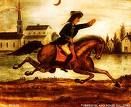
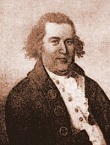




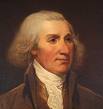
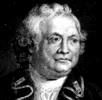




















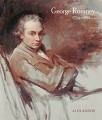
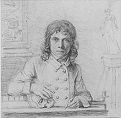


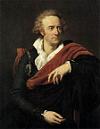
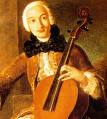
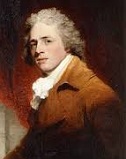






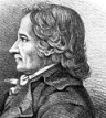

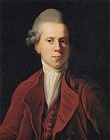
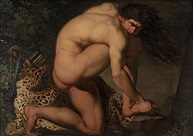
1775 "Already, in 1775, the many disastrous circumstances of Irish history had driven great bodies of Irishmen to seek a home in America" (Lecky); do the cents. of oppression of the Irish and Scots catch up with the stankin' English in Am. and fuel the Am. Rev. with a critical mass of volunteers? On Jan. 17 Concord, Mass. musters its 1st co. of minutemen under Capt. Charles Miles, and its 2nd on Jan. 30 under Capt. John Buttrick, who is later demoted to major. On Jan. 22 Marshal Oscar von Lubomirski expels the Jews from Warsaw - they later get even by having Poland partitioned? On Jan. 23 Alexander Hamilton's 80-page pamphlet The Farmer Refuted is pub. in New York City, crushing his opponent Rev. Samuel Seabury to the size of a vending machine peanut, predicting how rebel guerrilla tactics will ensure a V, and that France and Spain will come to the aid of the rebel colonies. In Jan. Capt. Cook discovers South Georgia and the South Sandwich Islands, then returns from his 2nd voyage. On Feb. 15 after a long conclave, Cesena-born Giovanni Angelico (Angelo) (Gianangelo) Braschi (Brachi) is elected Pope (#250) Pius VI (1717-99), going on to live to see the disturbing (to a Catholic) Am. Rev., French Rev., and Emperor Napoleon I - Pius VI in 76? On Feb. 21 Mass. colonists vote to buy military equipment for 15K men. On Mar. 6-7 the Treaty of Surat is signed, giving Britain the territories of Salsette and Bassein and part of the revenues from Surat and Bharuch in return for propping usurper Raghunath Rao on the throne of the Maratha Empire in India based in Pune by sending 2.5K soldiers; too bad, the treaty is negotiated with the Brits in Bombay rather than Calcutta, and when the latter hear about it they send Col. Upton to have it annulled. On Mar. 19 Benjamin Franklin spends the afternoon with Whig MP Edmund Burke; on Mar. 22 Burke makes a Speech on Conciliation with America in the House of Commons urging the govt. to adopt a policy of reconciliation with America, with the soundbyte: "A great empire and little minds go ill together." On Mar. 23 Patrick Henry (1736-99) gives his Give Me Liberty or Give Me Death Speech to the Va. Provincial Convention in Richmond, Va., with the soundbyte: "I know not what course others may take, but as for me, give me liberty or give me death"; armed revolt is on the way - and give me the governor's job? On Mar. 30 the New England Restraining Act forbids trade with any country other than Britain and Ireland by Mass., N.H., Conn. and R.I.; on Apr. 13 Lord North extends it to S.C., Va., Penn., N.J., and Md. In Mar. Ben Franklin leaves for America, arriving on May 5; he and Benjamin Rush (1745-1813) form the first abolition society at sea on Apr. 14. In the spring dissolute champagne-and-mistress-loving British Maj. Gen. John "Gentleman Johnny" Burgoyne (1722-92), whose first play is winning critical acclaim in London is assigned to duty in Boston, Mass., where he becomes an observer at the Battle of Bunker Hill - there's a man who lives a life of danger, to every man he meets he stays a stranger? In the spring peasants in Bohemia rise against servitude, led by Mathias Chwoja, causing the Austrian govt. to send 40K men to occupy Bohemia for two years. Daniel Boone was a man, yes a bi-i-i-g man? On Apr. 1 after Richard Henderson organizes a band of 30 expert woodsmen led by Daniel Boone to blaze the 200-mi. Wilderness Trail (Road) from the upper Holston River in Virginia's Shenandoah Valley, over the Appalachians, and through Cumberland Gap in SW Va., they cross the Kentucky River, terminating at Boonesville, where they build the stockade Ft. Boonesborough and found the colony (proposed 14th U.S. state) of Transylvania, with Boone's wife Rebecca Bryan and daughter being among the first women settlers in Ky. On Apr. 14 the first anti-slavery society in Am. is founded in Philadelphia, Penn. by Thomas Paine et al. April showers of bullets bring May flowering patriots? The Am. Rev. begins? On Apr. 14 Mass. gov. Thomas Gage is secretly ordered by the British to enforce the Coercive Acts and suppress open rebellion by an iron hand; on Apr. 17 John Adams ridicules Gov. Hutchinson, calling him a man "of piddling genius"; on Apr. 18 Gage secretly orders 800 troops to Concord to capture Samuel Adams and John Hancock and destroy the rebel weapons depot in Concord, but the rebels have spies, and the same day at 10 p.m. 18-y.-o. church sexton Robert Newman (1752-1804) hangs two lanterns ("one if by land, and two if by sea") in the 191-ft.-high steeple of the Anglican Old North Church (built 1723) (highest point in Boston) (most patriotic church in America, with a backbone of sea captain members who were hit hard by all the British shenanigans) to warn riders that the British are leaving Boston by boat to march on Concord, causing Paul Revere (1735-1818) to make his famous midnight ride on the borrowed horse Brown Beauty, shouting, "The British are coming!" after slipping by the 400-crew HMS Somerset (launched July 18, 1748) (which rescued British troops after the battles of Lexington and Concord, bombarded Bunker Hill, and sinks on Nov. 2, 1778 after being driven by a storm onto shallow sandy Peaked Hill); William Dawes Jr. (1745-99) also rides to Concord, but his role is later forgotten; "Listen my childen, and you shall hear/ of the midnight ride of Paul Revere/ on the eighteenth of April, in seventy-five;/ hardly a man is now alive/ who remembers that famous day and year" - Henry Wadsworth Longfellow (1807-82), Paul Revere's Ride. On Apr. 19 (dawn) the Battle of Lexington Green and Concord Bridge begins with a volley on 77 armed farmers known as Mass. Minutemen on Lexington Green under Capt. John Parker (1729-75) trying to block the British advance guards under Maj. John Pitcairn (1722-75); Parker commands, "Stand your ground. Don't fire until fired upon. But if they mean to have a war, let it begin here"; the volley leaves 8 colonists dead and 10 wounded, becoming "the shot heard around the world"; the British rout the colonials then destroy the weapons depot in Concord as ordered, although the Minutemen make a better stand on Concord Bridge; the first command to the colonials to fire on the British is given by Maj. John Buttrick (1731-91), who shouts "Fire fellow soldiers, for God's sake, fire!"; on the way back to Boston the Brits are harassed all the way by snipers hiding behind walls and fences, and the town of Arlington, Mass. (6 mi. NW of Boston) (founded 1700) becomes the scene of a ' hand-to-hand battle between Minutemen and the retreating Brits; the British end up with a total of 273 casualties, the colonials 95; John Adams says, "The die was cast, the Rubicon passed"; 78-y-o. patriot Samuel Whittemore (1696-1793) becomes a hero when he single-handedly ambushes the British Grenadiers of the 47th Regiment, killing two and wounding one before being shot in the face, bayoneted 19x, and left for dead, after which fellow minutemen find him lying in a pool of blood trying to reload; he goes on to live another 18 years., dying on Feb. 2, 1793 1 mo. before U.S. pres. #1 George Washington is sworn-in for his 2nd term. the town of Lexington, Ky. names itself when it receives news of the battle - it's a shooting war now? On Apr. 23 the Provincial Congress in Mass. orders mobilization of soldiers, who encamp around British-held Boston and seige it. On Apr. 23 New York receives news of the Lexington-Concord battle and an insurrection overtakes the city; the City Hall is pilfered of 1K weapons, which are used to start volunteer militia companies; on Apr. 24 a crowd of 8K patriots mass in front of City Hall, and many Tories book quick trips to England; on May 10 hundreds of patriots try to tar and feather Tory King's College pres. Myles Cooper, but his pupil Alexander Hamilton helps him escape to England. In Apr. Lord Dunmore removes powder stores from Williamsburg, Va. to the British warship Magdalen, causing colonists under the leadership of Patrick Henry to organize an armed resistance. Washington worship achieves critical mass? On May 5 Ben Franklin arrives in Philly from Portsmouth, England as bells ring to celebrate his arrival; delegates are already gathering there for the Second Continental Congress, incl. plantation squire George Washington (1732-99), who is greeted by a thousand militiamen at Philly's outskirts; Franklin is selected a member of Congress on May 6; at 70 he is the oldest of the 63 members. On May 8 New England delegates to the Second Continental Congress are warmly welcomed as they pass through New York; on May 10 the Second Continental Congress meets in Philly, and reelects Peyton Randolph (b. 1723) as pres., but he dies, and they elect John Hancock (richest man in Boston) as pres., then authorize the colonies to adopt their own constitutions. On May 10 the Continental Congress in Philly issues Continental Money to finance the Am. Rev. War (until May 31, 1781), issuing $2M worth on June 22. On May 10 Ethan Allen (1738-89), joined by Col. Benedict Arnold (1741-1801) of Conn. lead the Green Mountain Boys of Vt. (founded 1764) in conquering Ft. Carrillon, AKA Ft. Ticonderoga in N.Y., obtaining needed military supplies for the siege of Boston, followed on May 12 by Crown Point (on the W shore of Lake Champlain in N.Y., 10 mi. N of Ft. Ticonderoga), paving the way for an invasion of Canada. On May 20 the Mecklenburg Declaration, the first battle cry for Am. independence is issued in Mecklenburg, N.C., and N.C. becomes the first colony to declare independence. On June 1 a riot occurs during a session of the Va. House of Burgesses after it resolves to observe the anniv. of the closing of the port of Boston as a day of public fasting, causing Lord Dunmore to dissolve it and transfer his seat of govt. to the British man-of-war Fowey 12 mi. off Yorktown; on June 24 the burgesses meet for the last time, declaring that he had abdicated, creating a committee of safety with executive powers; nonplussed, on Oct. 24-25 Dunmore unsuccessfully attacks Hampton, Va. with a flotilla. On June 7 the United Colonies change their name to the United States in Congress Assembled after the name is suggested by Oliver Ellsworth. On June 11-12 the Battle of Machias (the Margaretta), the first naval action of the Am. Rev. War sees the colonials capture the British sloop Margaretta off Machias on the Maine coast; on Oct. 17 the British Navy burns the town of Falmouth, Mass. (modern-day Portland, Maine). On June 14 the U.S. Army is created by the Continental Congress; on June 15 strapping, reticent 43-y.-o. Virginian (hardly a virgin) George Washington (1732-99), who carries himself with unusual poise and habitually wears a colonel's uniform is appointed maj. gen. and CIC by a unanimous vote after Md. rep. Thomas Johnson Jr. (1732-1819) (gov. of Md. in 1777-9) proposes him; with one-fifth of the pop., Va. gets its leadership role, and the South is placated for the first but hardly last time; on June 16 other senior army officers are authorized, and on June 22 after a long debate Congress decides to appoint four maj. gens. (each with 2 aides and 8 brig. gens.) under Big GW, incl. Artemas Ward (1727-1800) of Mass., Charles Lee (1732-82) of Va., Philip John Schuyler (1733-1804) of N.Y., and Israel Putnam (1718-90) of Conn.; half of Washington's army ends up being made up of Irish regiments; many brigades are formed from entire Presbyterian congregations, with the minister acting as col.; 33-y.-o. Nathanael Green (1742-78), a handsome Quaker from R.I. with a limp and no military experience becomes the youngest brig. gen. in the U.S. army (after Trenton), and ends up second only to Washington, and the latter's choice for CIC if he is captured or killed; Greene later says of his boss, "He will be the deliverer of his own country"; London-trained Philly atty. Joseph Reed (1741-85) becomes Washington's secy., and later becomes army adjutant gen. with the rank of col.; Washington spends the rest of the year trying to break his army's individualistic and dem. spirit, ending the election of officers by the men, introducing a military hierarchy with distinctive dress and gradations in pay, led by aristocratic Southern states and objected to by Mass.; Washington gets frequent advice and supplies from Conn. gov. (1769-84) Jonathan Trumbull Sr. (1710-85), whom he refers to as "Brother Jonathan", later using the term to refer to Congress after he becomes pres. in 1789; Bible-thumper Washington introduces floggings, and tries in vain to get Congress to authorize 500 lashes as the max instead of 39; "New lords, new laws... The strictest government is taking place, and great distinction is made between officer and soldiers. Everyone is made to know his place and keep it." On June 15 word reaches the Continental Congress of British plans to occupy the Charlestown peninsula. On June 17, after the rebels learn of British plans to reinforce Bunker (Bunker's) Hill in Charleston, Mass. (modern-day Suffolk County) N of Boston, and beat them to the punch under Lt. Col. John Robinson (1735-1805), reinforcing nearby Breed's Hill instead, the British assault them, resulting in the Battle of Bunker Hill (Breed's Hill); the rebels are ordered by their ranking officer (cmdr. of Conn. forces since the Battle of Concord), pudgy-faced Maj. Gen. Israel "Old Put" Putnam (1718-90) not to fire until they can see "the whites of their eyes"; the Brits win when the rebels run out of gunpowder and have to retreat, but sustain 1K casualties (226 dead, 828 wounded) vs. 400 (140 dead, 301 wounded) for the rebels; Dr. Joseph Warren (b. 1741), who was appointed maj. gen. on June 14 and offered to fight as a private then insists on leading a charge is KIA in the battle after uttering the soundbyte: "These fellows say we won't fight! By Heavens, I hope I shall die up to my knees in blood", becoming a martyr despite Gen. Gage claiming that his death is worth 500 rebels; former slave Salem Poor (1747-1802) kills British Lt. Col. James Abercrombie (b. 1732); freed slave Peter Salem (1750-1816) (Muslim?) kills British leader Maj. John Pitcairn (b. 1722), allowing the rebels to escape; Mass. pres. James Warren fights in the battle alongside his wife Mercy Otis Warren's brother James Otis Jr., then is appointed a gen. but refuses to serve in the Continental Army under officers of lesser rank, and ends up as Washington's paymaster; the song Yankee Doodle, originally used by the British to ridicule Yankee ineptitude is adopted as an "in your face" American marching song because of this battle? On June 25 Washington crosses the Hudson River on the Hoboken ferry, then stages a triumphant procession along Broadway in a carriage pulled by white horses, wearing a purple sash across his blue uniform and a big plume in his hatty hat hat - If I can make it here, I can make it anywhere? On July 3 George Washington takes command of the 17K-man Continental Army at Cambridge, Mass. under an old elm tree. On July 5 the Continental Congress sends the Olive Branch Petition directly to King George III, fishing for a reconciliation (Congress still has its wannabe loyalists who blame America's troubles on his "artful and cruel" ministers, not the king); Ben Franklin signs it even though he has made the decision to go rebel by now. On July 6 the Continental Congress issues a Declaration of the Causes and Necessity of Taking Up Arms, written by Thomas Jefferson and John Dickinson; "Our cause is just. Our union is perfect... being with one mind resolved to die freemen rather than to live slaves" - ahem, forgot about the darkies? On July 12 Spanish capt. Bruno de Hezeta (Heceta) Y Dudagoitia (1744-1807) et al. of the ship Santiago land in Grenville Bay and claim Nueva Galicia (the Pacific NW of Am.) for Spain, becoming the first Euro landing in the future U.S. state of Washington; on Aug. 17 he discovers the mouth of the Columbia River, and names it Rio de San Roque, and the mouth Bahia de la Asuncion - and Kennewick Man is not interested? On July 26 the Continental Congress creates the position of U.S. Postmaster Gen., bringing the U.S. Post Office into existence, with Benjamin Franklin as the first. On July 27 Newport, R.I.-born Benjamin Church III (1734-78), grandson of Am. frontiersman Benjmain Church becomes the first surgeon gen. of the U.S. Army; too bad, on Oct. 17 he is caught secretly a betting the British during the siege of Boston as a spy for Gen. Thomas Gage, and is imprisoned until 1777, when he sails to the West Indies in a schooner that disappears at sea. On Aug. 5 Spanish Lt. Juan Manuel de Ayala (1745-97) (who left Monterey on July 26) becomes the first Euro explorer to sail through the Golden Gate of San Francisco Bay in Calif., naming three islands incl. Alcatraz (Sp. "pelican") Island and anchoring his packet ship Punta de San Carlos (which he takes command of by luck after captain Don Miguel Manrique goes mad?) at Angel Island (Isla de Los Angeles) to wait for the overland expedition of Capt. Juan Bautista de Anza, then on Sept. 18 returns to San Blas via Monterey, telling them how the harbor beats Monterey for having less fog, and how friendly the natives are. On Aug. 16 Edmund Pendleton (1721-1803) becomes pres. of the Va. Committee of Safety (until July 5, 1776), followed by pres. of the Va. Convention that authorizes the signing of the DOI, followed by first speaker of the Va. House, going on to work with Thomas Jefferson et al. to revise the Va. law code. On Aug. 23 in the biggest mistake in English kingly history, refusing to even look at it, not-yet-mad king George III appears before Parliament and issues a Proclamation of Rebellion against the Am. colonies, proclaiming them to have "proceeded to open and avowed rebellion", and calling for a "speedy end" to it, which finally causes Am. support for the rebellion to crystallize; overconfident kingy hires 29K German mercenaries to kick their rebel butts - hear hear, pip pip and all that rot? On Aug. 23 (Proclamation Day) Alexander Hamilton and 15 King's College volunteers move the heavy artillery of exposed Ft. George to the Common as the British warship Asia bombards them, blowing a big hole in the roof of Fraunces Tavern and sending thousands of panicky New Yorkers fleeing from their beds into the streets - and no FDNY to Rescue Me? In Aug. citizens of Bermuda sympathetic to the Am. rebel cause steal gunpowder, so alarming military gov. Bruere that he urgently requests that British troops be sent. On Sept. 17-Nov. 3 Am. Brig. Gen. Richard Montgomery (1738-75), serving under Gen. Philip Schuyler sieges St. John's (Jean) in Quebec, and brings about the surrender of 600 British troops after Col. Benedict Arnold leads the assault; on Nov. 13 Montgomery captures Montreal in Quebec. On Sept. 25 British troops capture Ethan Allen, the hero of Ticonderoga when he leads a handful of rebels in an attack on Montreal. In Sept. the Khasa Treaty settles the border between Nepal and China. In Sept. Veera Kerala Varma dies, and Rama Varma VIII (-1790) becomes king of Cochin in SW India (until Aug. 16, 1790). The original Hannah and her sisters? On Oct. 13 the Continental Congress orders the construction of a naval fleet; the first ship constructed is the schooner Hannah (Heb. "grace"), commissioned by George Washington and outfitted at Beverly, Mass.; prosperous Boston merchant Elbridge Gerry (1744-1814), an ally of Samuel Adams introduces and secures the passage of a bill to arm and equip ships to harass British maritime commerce. On Oct. 30 Father Junipero Sierra founds Mission San Juan Capistrano (#7); Indian unrest causes it to be abandoned, and a new one is founded on Nov. 1, 1776; the Acagchemem Indians build a small church now called the Serra Chapel (the oldest bldg. still in use in Calif.); every year on St. Joseph's Day (Mar. 19) the swallows return from their winter migration in Argentina. On Nov. 9 Archibald Robertson, lt. of royal engineers arrives in Boston, Mass. to supervise construction of defenses against the rebels, keeping a Diary containing numerous sketches (ends 1780). On Nov. 10 soldier-politician George Germain, 1st Viscount Sackville (1716-85) (AKA Lord George Germain) is appointed as British secy. of the Am. colonies by George III, and says the rebellion can best be solved with one "decisive blow"; the same day the U.S. Marine Corps (USMC) is established in Philly by the Continental Congress, with two battalions; it was originally founded in 1740 in New York as a branch of the British army; Tun Tavern(1693-1781) in Philly holds the first recruitment drive, also becoming one of the "birthplaces of Masonic teachings in America". On Nov. 12 Gen. Washington orders that "neither Negroes, Boys unable to bare Arms, nor old men unfit to endure the fatigues of the campaign" are to be recruited into the Continental Army. The British invent Deal or No Deal? On Nov. 15 the Battle of Kemp's Landing in Va. is a V for the British under cottish-born royal gov. John Murray, 4th Earl of Dunmore (1730-1809), who offers freedom to all slaves who will take up arms to defend the Crown, and to any child "born behind British lines", driving Am. slaveholders into the arms of the rebels and 80K Am. slaves into the arms of the Brits until the colonies (except Ga. and S.C.) reluctantly recruit slaves and freedmen into the army, made more palatable when owners are allowed to send them as substitutes for themselves; wherever the Brits march, escaped slaves flock to them for protection (which they repeat during the War of 1812 and Sherman's March to the Sea in 1864), totaling 100K during the war; Lord Dunmore's Ethiopian Regiment of black slaves wearing a patch reading "Liberty to Slaves", reaches 300 men incl. escaped slave Col. Tye (Titus Cornelius) (1753-80) reaches 300 men by Dec., and after seeing action is disbanded next year after most die from smallpox. On Nov. 17 George Washington and his ragtag army faceoff against 12K Redcoat regulars in Boston. On Nov. 19 prosperous skipper captain and patriot Isaac Sears (1730-86), the "king of the New York streets", together with a 100-man Conn. Light Horse Militia kidnap Rev. Samuel Seabury in Westchester, then parade him through New Haven, unsuccessfuly trying to make him confess to being the Westchester Farmer; on Nov. 23 Sears raids James Rivington's print shop in Manhattan, putting the New-York Gazeteer out of biz for its articles critical of the Sons of Liberty; Alexander Hamilton rises unsuccessfully to his defense. On Nov. 28 the Continental Congress formally establishes the U.S. Navy; Boston Tea Party veteran John Kendrick (Kenrick) (1740-94) commands its first ship Fanny after being commissioned on May 26, 1777; black Sambos, er, blacks are prohibited from enlisting until WWII; Va. planter and Continental Congress member Carter Braxton (1736-97) spends his fortune equipping ships. On Nov. 29 Congress appoints a secret committee to seek help from Europeans. On Dec. 22 Esek Hopkins (1718-1802) of R.I. is named the first adm. (CIC) of the Continental Navy, which has a total of seven small converted merchant ships, with HQ in Philadelphia. On Dec. 23 George III closes the Am. colonies to commerce and trade, effective next Mar. On Dec. 31 after Col. Benedict Arnold (1741-1801) is appointed by Washington to lead a disastrous march through the Maine forests, the Battle of Quebec sees 1.2K Am. forces (900 regulars, 300 militia) under Gen. Richard Montgomery attack the Quebec City in Canada in a raging snowstorm, and are defeated by 1.8K British and Quebec forces under Sir Guy Carleton; Montgomery is KIA, Arnold is wounded and Daniel Morgan is taken POW along with 400 men; the Am. offensive in Canada is ended; Congress grants Gen. Washington's request to make Arnold (his favorite?) a brig. gen., holding Montreal (captured Nov. 13) until next June; "If Arnold had not been wounded, few doubt that Canada would be the 14th state." (Washington) On Dec. 31 George Washington and Martha Washington attend a service at Christ Church (founded 1759) in Harvard Square in Cambridge, Mass., which has been used to house Conn. troops since the Battle of Lexington in 1775. In Dec. France informs Congress that it may offer support in the war. Russia, which used to let Jews live anywhere they wanted, begins to restrict them to the Pale of Settlement. The British military is expelled from Sulu in the S Philippines. Monterey becomes the capital and principal city of Alta (Upper) Calif. (until 1846). Infant Ang Eng (Ang Non II) (1773-96), a refugee in the Thai court is installed as king of Cambodia in Odongk by Thai troops (until 1779); meanwhile Thailand annexes Cambodia's three N provinces and brings the NW provinces under vassalage. George Pigot, 1st Baronet Pigot (b. 1719) (of Patshul) returns to become East India Co. gov. of Madras, going on to attempt to suppress corruption and gaining many enemies. After being sent by Antonio Maria Bucareli y Ursua, viceroy of New Spain to explore N Calif. to see if there are Russian settlements, Spanish explorer Bruno de Heceta (Hezeta) y Dudagoitia (1743-1807) discovers the Columbia River in W N. Am.; New England ship captain Robert Gray names it in 1792. Tucson, Ariz. (2,389-ft. alt.) is founded as a Spanish presidio, AKA "Old Pueblo" by Hugo O'Conor to protect settlers from Apache raids. Bodega Bay, Calif. is founded by the Spanish. Juan Manuel de Ayala names Alcatraz Island for its pelicans. Louis XVI sends playwright Pierre Augustin Caron de Beaumarchais (1732-99) (who gives his daughter harp lessons) on a secret mission to England to negotiate a settlement with Chevalier D'Eon over the embarrassing gender matter (and to get back secret documents he/she obtained as a spy that could be even more embarrassing); D'Eon agrees to return the documents in exchange for a pension and a royal statement that he/she is a woman; starting in 1777 he/she spends the rest of his/her life (till 1810) dressed as a woman (the first time in history a man does an Orlando or reverse Joan of Arc at midlife?); since he/she refuses to be examined, and leaves the bettors up in the air, he/she sinks into poverty, occasionally entering British fencing tournaments to earn some money, and gaining a rep as the best female (dress-wearing) sword fighter on earth (she brings up the rear of the women's movement?); while in England negotiating with Chevalier D'Eon, Beaumarchais meets Arthur Lee, the 3rd Am. commissioner to England (brother of William and Richard Henry Lee), who convinces him to lobby the French king to supply arms for the upcoming Am. Rev. Phalo ka Tshiwo (b. ?), ruler (since 1736) of the Xhosa, southernmost of the Bantu peoples dies, beginning a series of succession disputes until 1782. In Mexico the Monte de Piedad (Mount of Pity) nat. pawn shop is founded on the site of Moctezuma's brother's palace in Mexico City by the Count of Regla. The Horse You Came In On Saloon is founded in Fell's Point, Baltimore, Md., becoming a favorite of Edgar Allan Poe. In Mexico Manuel Arroyo of Real del Monte confesses to 30 counts of oral sex (fellatio) on men, claiming that his doctor told him it was good for his health and a way to avoid evil thoughts about women; he is sentenced to three years in prison by the Inquisition - or 3K more priests, whichever cums first? Catherine II the Great of Russia receives the Sultan's Feather, an ornament containing 1K+ diamonds from Turkish Sultan Abdul Hamid I. The last Hanseatic League trading station (kontor) is closed, leaving only two in London (closes 1852) and Augsburg (closes 1863). Moscow U. is founded. The first clearinghouse for British banks is established on Lombard Street in London. The British Parliament requires notice to be posted in a parish before a petition to enclose communal farmland can be sent to them; too bad, the consent of the owners of 75% of the land to be enclosed is sufficient to initiate the petition, locking out small landowners and contributing to the demise of the yeomen class, who are forced to move to the cities and/or work in industry. A decision by the Court of Common Pleas abolishes the Stationers' Co. monopoly (granted by James I) on publishing almanacs in England, but it continues on as the main publisher. German literary genius Goethe settles in Weimar, capital of the duchy of Saxe-Weimar after being invited by heir apparent Charles Augustus, turning it into the center of German intellectual and literary life while associating with poet Christoph Martin Wieland (1733-1813), Charlotte von Stein, Johann Gottfried von Herder et al., and holding various govt. posts - Weimar, future site of some nice concentration camps? Welsh-born Sarah Kemble Siddons (1755-1831) debuts at London's Drury Lane as Portia in Shakespeare's "The Merchant of Venice; too bad, London critics pan her, causing her to begin performing in provincial theatres until 1782. Dutch #1 poet Johannes Ewald (1743-81) founds the Danish Lit. Society. London portrait painter George Romney (1734-1802) becomes fashionable. English sculptor John Flaxman (1755-1826) begins working for pottery maker Josiah Wedgwood (until 1787). Spanish Franciscan priest Friar Pedro Font (1737-81) visits the Indians of Calif., reporting female same-sex marriages; "Among the women I saw some men dressed like women, with whom they go about regularly, never joining the men", adding "There will be much to do when the Holy Faith and the Christian religion are established among them"; in 1777 Francisco Palou writes "The couple was caught in the act of committing the nefarious sin. They were duly punished for this crime, but not with the severity it properly deserved... the layman answered that the Joya was his Wife!... Almost every village has two or three. But we place our trust in God and expect that these accursed people will disappear with the growth of the missions. The abominable vice will be eliminated to the extent that the Catholic faith and all other virtues are firmly implanted there, for the glory of God and the benefit of those poor ignorants" - what California Proposition was that? Caughley (Salopian) soft-paste porcelain begins to be manufactured in Shropshire, England, with the first-ever willow pattern, becoming known for cabbage-leaf jugs with molded mask spouts; in 1799 they are purchased by Coalport. Josiah Wedgewood begins producing Jasper Ware, fine blue-stained stoneware with white relief figures. The Continental Congress rations soldiers to one quart of spruce beer or cider per man per day. Architecture: The Bromberg Canal (begun 1772) is finished. Sports: On June 23 the first Thames Regatta is held. Inventions: A banner year for underwater inventions? Am. Yale engineer David Bushnell (1740-1824) invents the first torpedo, and itches to use it on the anally-retentive British? The first chain-driven machine is invented in England by Crane. British watchmaker Alexander Cummings of Bond St., London patents the first toilet with a U-shaped pipe underneath to keep the odor from cumming, er, rising, becumming, er, becoming the first modern toilet. 10-y.-o. Pierre-Simon Girard (1765-1836) of France invents a water turbine. Science: A small but accurate Map of the Moon by German scientist Johann Tobias Mayer (1723-62) is pub., which is unsurpassed for 50 years; a crater on the Moon is later named for him. Joseph Priestley discovers hydrochloric acid and sulfuric acid. Scottish inventor James Watt (1736-1819) perfects his steam engine and begins manufacturing them for sale (until 1800). English botanist William Withering (1741-99) of Birmingham becomes the first to use digitalis (digitalis purpurea from purple foxglove) as a drug (as a diuretic in dropsy) after he learns about it from a gypsy woman in Shropshire, who tells him it has been used as an herbal remedy for ages. Nonfiction: James Adair (1708-83), The History of the American Indians... Containing an Account of their Origin, Language, Manners, Religious and Civil Customs; revives the Ten Lost Tribes of Israel theory for Native Ams., pointing out their division into tribes, worship of a great spirit like Jehovah, notions of a theocracy, ablutions, and uncleanness, cities of refuge, and practices as regards divorce and raising seed to a deceased brother. Jean-Sylvain Bailly (1736-93), A History of Ancient Astronomy. Torbern Olaf Bergman (1735-84), Dissertation on Elective Attractions; contains the largest table of chemical affinities yet pub., first using the A, B, C etc. system for chemical equations. Edmund Burke (1729-97), Speech on Conciliation with America. Fredrik Henrik af Chapman (1721-1808), Treatise on Shipbuilding; pioneering work on modern naval architecture. Johann Joachim Eschenburg (1743-1820), William Shakespeare's Plays (13 vols.) (Zurich) (1775-82); based on the 1762-6 tr. by Christoph Martin Wieland, becoming the first complete trans. in German prose of Shakespeare's plays. Johan Christian Fabricius (1745-1808), Systema Entomologiae; first of several treatises on entomology by a Danish student of Carl Linnaeus which name and classify a total of 9,776 species, founding the field of entomology. Dr. Samuel Johnson (1709-84), A Journey to the Western Islands of Scotland; his 1773 trip with Boswell to Scotland and the Hebrides; Boswell's account is pub. after Johnson's death in 1785. Johann Kaspar Lavater (1741-1801), Physiognomische Fragmente zur Beforderung der Mennschenkenntnis und Menschenliebe (1775-8); popularizes the pseudo-science of physiognomy; Goethe, his friend since 1774 at first goes for it, then wises up and accuses him of being a hypocrite - down that primrose path of the honest face? Justus Moser (1720-94), Patriotische Phantasien (1775-86); a plea for one unified Germany with natural instead of arbitrary laws imposed by a sovereign, making him the German Edmund Burke. William Robertson (1721-93), The Situation of the World at the Time of Christ's Appearance, and Its Connexion with the Success of His Religion, Considered; sermon preached before the Society in Scotland for Propagating Christian Knowledge, Jan. 6, 1775. Louis Claude de Saint-Martin (1743-1803), Des Erreurs et de la Verite (Of Errors and Truth); pub. under alias "The Unknown Philosopher". Thomas Sheridan (1719-88), Lectures on the Art of Reading. Hugh Williamson (1735-1819), The Plea of the Colonies; physician-scientist who helped Benjamin Franklin with his electricity experiments defends the Am. colonies' rebellious acts, and becomes an army doctor. Music: C.P.E. Bach (1714-88), Symphony No. 1; Symphony No. 2; Symphony No. 3; Symphony No. 4; Die Israeliten in der Wuste (oratorio). Luigi Boccherini (1743-1805), String Quintet in E major, Op. 11, No. 5; incl. The Celebrated Minuet. Vicente Martin y Soler (1754-1806), Il Tutore Burlato (first opera); adapted from Giovanni Paisiello's "La Frascatana", based on the play by Filippo Livigni; debuts in 1778 in Madrid as "Il Madrilena o El Tutor Burlado". Wolfgang Amadeus Mozart (1756-91), La Finta Giardiniera (The Pretend Garden-Girl), K.196 (opera buffa) (Salvatortheater, Munich) (Jan. 13); libretto by Giuseppe Petrosellini; converted into German Singspiel "Die Garternin aus Liebe" in 1780; Il Re Pastore (The Shepherd King), K.208 (Salzburg) (Apr. 23); last major stage work from his Salzburg period. Art: Nicolai Abraham Abildgaard (1743-1809), The Wounded Philoctetes. Jean-Honore Fragonard (1732-1806), The Bathers. Francisco de Goya (1746-1828), Self-Portrait (1775-80). Jean-Antoine Houdon (1741-1828), Gluck (sculpture). Pietro Longhi (1701-85), The Morning Chocolate (Venice) (1775-80). Denis Diderot [1713-84] (sculpture). Augustin Pajou (1730-1809), Michel-Jean Sedaine (sculpture). Sir Joshua Reynolds (1723-92), Miss Bowles. Plays: Vittorio Alfieri (1749-1803), Cleopatra (tragedy) (first play) (Turin). Pierre-Augustin Caron de Beaumarchais (1732-99), The Barber of Seville (Le Barbier de Seville) (comedy). Gen. John Burgoyne (1722-92), The Maid of the Oaks (Drury Theatre, London); a hit for a soldier-dramatist? Charles Dibdin (1745-1814), The Quaker (comic opera) (Drury Lane Theatre, London); folds after one quaking performance. Richard Brinsley Sheridan (1751-1816), The Rivals (comedy of manners) (first play) (Covent Garden Theatre, London) (Jan. 17); prologue by David Garrick; about "The deceptive nature of appearances, the fickleness of reputation, the often disreputable guise behind which goodness and honesty can conceal itself"; chars: Sir Anthony Absolute, his son Capt. Jack Absolute, Lydia Languish and her guardian Mrs. Malaprop (whose misuse of language, e.g., "Put The Innocent Adultery into The Whole Duty of Man" causes the term "malapropism" to be coined); St. Patrick's Day; or, The Scheming Lieutenant (Convent Garden Theatre, London) (May 2); written in two days for lead actor Lawrence Clinch to reward him fror playing Sir Lucius O'Trigger in "The Rivals". Richard Brinsley Sheridan (1751-1816), Thomas Linley the Elder (1733-95), and Thomas Linley the Younger (1756-78), The Duenna (opera) (Covent Garden Theatre, London) (Nov. 21) (75 perf); makes fans of Dr. Samuel Johnson, William Hazlitt, and Lord George Byron, who calls it "The best opera ever written." Mercy Otis Warren (1728-1814), The Group; pub. anon.; satire of what would happen if George III abrogated the Mass. Charter of Rights. Births: French Ampere's Law physicist-mathematician Andre-Marie Ampere (André-Marie Ampère) (d. 1836) on Jan. 20 in Poleymieux, Lyons; at 18 he takes his first Communion, reads Thomas' "Eulogy of Descartes", and witnesses the taking of the Bastille. Spanish tenor composer-teacher Manuel de Populo Vicente Garcia (d. 1832) on Jan. 22 in Seville; father of singers Maria Malibran (1808-36), Pauline Garcia-Viardot (1821-1910), and Manuel Patricio Rodriguez Garcia Jr. (1805-1906). Am. painter John Rubens Smith (d. 1849) on Jan. 23 in London, England; educated at the Royal Academy. emigrates to the U.S. in 1807. German philosopher Friedrich Wilhelm Joseph von Schelling (d. 1854) on Jan. 27 in Leonberg, Wurttemberg. English "Rose Aylmer", "Imaginary Conversations" poet-writer Walter Savage Landor (d. 1864) on Jan. 30. Hungarian mathematician Farkas (Wolfgang) Bolyai (d. 1856) on Feb. 9 in Bolya (Bia), Transylvania; father of Janos Bolyai (1802-60). English essayist-critic (Shakespeare nut) Charles Lamb (d. 1834) (AKA Elia) on Feb. 10 in London; brother of "Mad" Mary Lamb (1764-1847). English "Rejected Addresses" writer James Smith (d. 1839) on Feb. 10 in London; brother of Horace Smith (1779-1849). U.S. First Lady (1825-9) (first foreign born) Louisa Catherine Johnson Adams (d. 1852) on Feb. 12 in London, England; Am. father, English mother; wife (1797-) of John Quincy Adams (1767-1848). French adm. Guy-Victor Duperre (Duperré) (d. 1846) on Feb. 20 in La Rochelle. Am. businessman Francis Cabot Lowell (d. 1817) on Apr. 7 in Newburyport, Mass.; uncle of James Russell Lowell (1819-91); educated at Harvard College; namesake of Lowell, Mass. English politician-naturalist Edward Smith-Stanley, 13th Earl of Derby (d. 1851) on Apr. 21; only son of the 12th earl of Derby (1752-1834); patron of Edward Lear; educated at Eton College, and Trinity College, Cambridge U. English "Fighting Temeraire" #1 Romantic landscape painter ("Painter of Light") ("the Shakespeare of Landscape" - Alfred Lord Tennyson) J.M.W. (Joseph Mallord William) Turner (d. 1851) on Apr. 23 in Covent Garden, London; known for atmospheric effects, elevating landscape painting to the level of historical painting. Corsican prince Lucien Bonaparte, Prince of Canino and Musignano (d. 1840) on May 21 in Ajaccio; 3rd son of Carlo Buonaparte and Letizia Ramolino; younger brother of Joseph Bonaparte (1768-1844) and Napoleon Bonaparte (1769-1821); the most gifted of the Bonapartes? German philologist (decipherer of Babylonian cuneiform) Georg Friedrich Grotefend (d. 1853) on June 9 in Hann, Munden; educated at the U. of Gottingen. U.S. war secy. #11 (1825-8) James Barbour (d. 1842) on June 10; brother of Philip Pendleton Barbour (1783-1841). Italian poet Carlo Porta (d. 1821) on June 15 in Milan. Am. Mormon mom Lucy Mack Smith (d. 1856) on July 8 in Gilsum, N.H.; wife (1796-) of Joseph Smith Sr. (1771-1840); mother of Joseph Smith Jr. (1805-44). Spanish "Mysterious Night" poet-theologian Jose Maria (Joseph) Blanco White (d. 1841) on July 11 in Seville; Irish father, Spanish mother. English sculptor Sir Richard Westmacott Jr. (d. 1856) on July 15 in London; son of Richard Westmacott Sr. (1747-1808); student of Antonio Canova (1757-1822); father of Richard Westmacott III (1799-1872); knighted in 1837. French scientist Etienne-Louis (Étienne-Louis) Malus (d. 1812) on July 23 in Paris. U.S. First Lady #9 (1841) Anna Tuthill Symmes Harrison (d. 1864) on July 25 in Morristown, N.J.; wife (1795-) of pres. William Henry Harrison (1773-1841). English Shakespearean play forger William Henry "Samuel" Ireland (AKA Vortigern) (d. 1835) on Aug. 2 in London; son of Samuel Ireland (1744-1800), who becomes his son's main victim. Irish nationalist leader, MP (1828-30), and atty. ("the Liberator") ("the Emancipator") Daniel O'Connell (d. 1847) on Aug. 6 in Cahirsiveen, County Kerry. French philologist-classicist Jean Louis Burnouf (d. 1844) on Sept. 14 in Urville; father of Eugene Burnouf (1801-52). Am. Least Squares mathematician Robert Adrain (d. 1843) on Sept. 30 in Carrickfergus, Ireland; emigrates to the U.S. in 198. Am. Presbyterian minister (co-founder of the Am. Temperance Society) Lyman Beecher (d. 1863) on Oct. 12 in New Haven, Conn.; educated at Yale U.; husband (1799-1816) of Roxana Foote; father of 13 children, incl. Catharine Esther Beecher (1800-78), Edward Beecher (1803-95), Harriet Beecher Stowe (1811-96), Henry Ward Beecher (1813-87), and Charles Beecher (1815-1900). British (Scottish) rear adm. ("the Sea Wolf") Thomas Cochrane, 10th Earl of Dundonald (d. 1860) on Dec. 14 in Annsfield (near Hamilton), Lanarkshire, Scotland. English "Pride and Prejudice" novelist Jane Austen (d. 1817) on Dec. 16 in Steventon; born in the parsonage; grows up with her father (d. 1805), sister, and brothers, who like to read aloud together and put on plays. Am. Rocky Mt. Fur Co. frontiersman Maj. Andrew Henry (d. 1832) in Fayette County, Penn. French comic opera composer Francois-Adrien Boieldieu (d. 1834) on Dec. 16 in Rouen. Am. La. gov. #1 (1804-16) William Charles Cole Claiborne (d. 1817) in Sussex County, Va. German jurist-philosopher (originator of the psychological-coercive or intimidation theory) Paul Johann Anselm von Feuerbach (d. 1833) near Jena; father of philosopher Ludwig Feuerbach (1804-72). Deaths: Arab ruler of Palestine Sheikh Daher el-Omar (b. 1690) on Aug. 21 in Acre. Italian Passionist priest St. Paul of the Cross (b. 1694) on Oct. 18 in Rome; canonized on June 29, 1867. Italian composer Giovanni Battista Sammartini (b. 1700) on Jan. 17; leaves 3 operas, 70 symphonies, and 10 concertos, and 450 chamber music works. Buddhist poet-artist-nun Chiyo-ni (b. 1703). English type designer John Baskerville of Birmingham (b. 1706) on Jan. 8 in Birmingham. German sculptor Johann Joachim Kandler (b. 1706). Moravian-born Am. Moravian bishop Peter Boehler (b. 1712). British adm. Sir Charles Saunders (b. 1715) on Dec. 7. English-born Am. architect Peter Harrison (b. 1716) on Apr. 30 in New Haven, Conn.; designed Touro Synagogue and Redwood Library in Rhode Island. English writer Sir John Hill (b. 1716) on Nov. 21. Am. political leader Peyton Randolph (b. 1721) on Oct. 23 ("apoplectic stroke") - talk about bad timing? British Maj. John Pitcairn (b. 1722) on June 17 in Boston, Mass. (KIA). Am. Rev. Gen. Richard Montgomery (b. 1738) on Dec. 31 in Quebec City, Canada. Am. Rev. Gen. Dr. Joseph Warren (b. 1741) on June 17 in Boston, Mass. (KIA in the Battle of Bunker Hill); British Capt. Walter Laurie "stuffed the scoundrel with another rebel into one hole, and there he and his seditious principles may remain", after which his body is exhumed 10 mo. later by Paul Revere, who IDs him by an artificial tooth, becoming the first recorded example of post-mortem ID by forensic odontology?; his children are financially supported by Benedict Arnold, who gets the Continental Congress to take over; 14 states later name a county after him. Am. Rev. leader Josiah Quincy II (b. 1744) on Apr. 26; dies at sea while sailing from England. Danish-Norwegian queen (1766-72) Caroline Matilda (b. 1751) on May 10 in Celle Castle in Hanover.

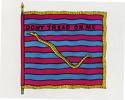



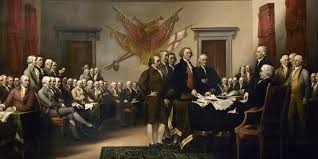

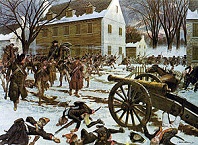



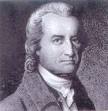



























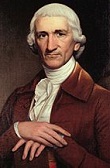










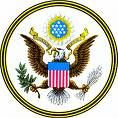
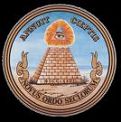
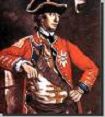






















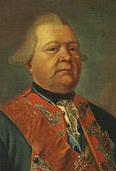


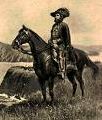
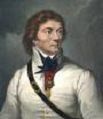
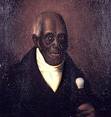







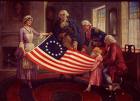

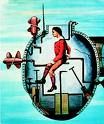

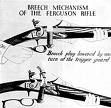


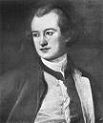

























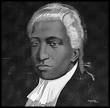











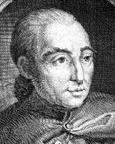








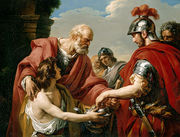
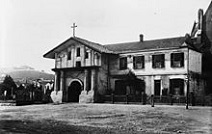


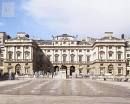
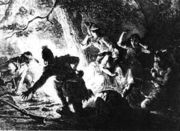
1776 A leap year; Hebrew year: 5536/7. Jan. 1 falls on Mon. in the Gregorian Calendar, and Fri. in the Julian Calendar, which is 11 days behind. Pop.: Philadelphia: 40K; New York City and Boston combined: 24K; slave pop. in the Am. colonies: 500K. A foot-and-mouth disease panzootic hits Europe (ends 1779). During the Am. Rev. War Loyalists comprise 15%-20% of the white pop., while patriots comprise 40%-45%, and the rest are indifferent; John Adams estimates that one-third of the Am. people support the rebels, one-third support the British, and one-third are indifferent - the pesky Scots and Irish are used to fighting the stankin' English and facing impossible odds, and take them over the top? At the start of the Am. Rev. the daily Hartford Courant (founded as "The Connecticut Courant" on Oct. 29, 1764 by Thomas Green) is the most popular newspaper in the U.S., although pamphlets get far more circulation, of which most are church sermons; the newspaper goes on to adopt the slogan "Older than the nation", and "America's oldest continously published newspaper"> In 1776-1781 Britain sends 60K troops to America, incl. 29K Hessian soldiers from the German states of Brunswick, Hesse-Cassel (landgrave Frederick II), Hesse-Hanau, Waldeck, Anspach-Bayreuth and Anhalt-Zerbst; 7K Hessians die in the war and another 5K desert and settle down; Russia refuses to supply troops. On Jan. 1 King George III's speech to Parliament, calling his Am. subjects "deluded", and their leaders "traitorous", with designs for an "independent empire" arrives, laying out his plan to ramp up British forces with the assistance of foreign troops to crush the rebellion, pumping up the rebels to wage all-out war for independence, starting with burning it. On Jan. 1 the British Siege of Boston by the Continentals under Gen. Washington begins (ends Mar. 17); the Grand Union Flag modeled on the Union Jack with 13 red-and-white stripes is hoisted by Washington on Prospect Hill in a ceremony commemorating the 1776 inauguration of the Continental Army; when it is mistaken for a token of surrender, the need for a new nat. flag is recognized, and the Stars and Stripes vies with the Rattlesnake Flag for the honor; during the siege, George Washington quarters his troops in the bldgs. of Harvard Yard in Cambridge. On Jan. 1 Lord Dunmore shells Norfolk, Va., destroying almost two-thirds of it; later this year after the rebels drive him from his station on Gwynn's Island in Chesapeake Bay, he sends his fleet to the West Indies and skedaddles to England; meanwhile early in the year U.S. adm. Esek Hopkins is ordered by the Continental Congress to attack the British fleet in Chesapeake Bay, but decides against suicide and instead attacks the British post at New Providence in the Bahamas, capturing valuable war materiel; when he returns he fights an inconclusive battle on Apr. 7 with HMS Glasgow off Brenton's Point on Long Island Sound, and when he returns to Philly he is censured by the Continental Congress for disobeying orders then letting his fleet lay idle in Narragansett Bay: John Adams attempts an eloquent defense, but they don't buy it. On Jan. 2 George Washington writes a letter to his aide-de-camp Stephen Moylan from Cambridge, Mass. during the Siege of Boston, using the term "United States of America" - proving he invented it? Kingie, what will you do about the Constitution Solution? On Jan. 5 New Hampshire (N.H.) adopts the first U.S. state constitution, followed by South Carolina (S.C.) on Mar. 26, Georgia (Ga.) in Apr. (temporary constitution); Virginia (Va.) on June 29, New Jersey (N.J.) on July 2, Pennsylvania (Penn.) on Sept. 28, Maryland (Md.) on Nov. 11, and North Carolina (N.C.) on Dec. 18. On Jan. 8 English Roman Catholic actor John Philip Kemble (1757-1823) debuts as as Nathaniel Lee's "Emperor Theodosius" in Wolverhampton, going on to become one of the top Shakespearean actors of his day, #3 behind Edmund Kean and David Garrick, although his Macbeth tops theirs? On Jan. 10 (Wed.) self-taught English immigrant and former corset maker and excise officer Thomas "Tom" Paine (1737-1809), who arrived in Philly two years earlier pub. his anon. 46-page incendiary pamphlet Common Sense in Philadelphia, calling George III the "royal brute of Britain", calling for a declaration of independence and convincing Am. leaders of the need for a separation from England; 120K copies are printed in 3 mo., and 500K by the end of the year, and every tavern is buzzing about it (even without the Internet?); "The cause of America is, in great measure, the cause of all mankind"; "The laying a country desolate with fire and sword, declaring war against the natural rights of all mankind, and extirpating the defenders thereof from the face of the earth, is the concern of every man to whom nature hath given the power of feeling"; "Society in every state is a blessing, but government even in its best state is but a necessary evil [and] in its worst state an intolerable one"; "There is something exceedingly ridiculous in the composition of monarchy; it first excludes a man from the means of information, yet empowers him to act in cases where the highest judgment is required" "We have it in our power to begin the world anew"; John Adams later issues the soundbytes "History will ascribe the American Revolution to Thomas Paine", and "Without the pen of Paine the sword of Washington would have been wielded in vain"; Paine is given a position as aide to Am. Gen. Nathanael Greene (1742-86), and his future seems so bright he takes to wearing shades; too bad, after the war his Bible-rejecting Rationalist pubs. and support of the French Rev. turn the U.S. power structure against him, causing a misguided attempt to erase and/or defame his memory, and he dies a bitter, wronged man? On Jan. 16 Benjamin Franklin argues for an instrument of confederation in the Continental Congress, but is defeated. On Jan. 20 S.C. loyalists led by Robert Cunningham (1741-1813) sign a petition from prison agreeing to all demands by the newly formed state govt. of S.C. On Jan. 24 gregarious double-chinned 280 lb. U.S. Col. Henry "Ox" Knox (1750-1806) (former Boston bookseller, and friend of Gen. Nathanael Greene) finishes a 600 mi. trek over wintry terrain and delivers 60 tons of artillery from Ft. Ticonderoga to Cambridge, Mass. In Jan. Benjamin Franklin's loyalist son William Franklin (1731-1813) is deposed as royal gov. of N.J. under order of the Continental Congress, then captured in Perth Amboy, and imprisoned in June - erin go bragh? In Jan. French comptroller gen. Jacques Turgot presents Louis XVI with Six Edicts, ending the monopoly of the guilds, abolishing the hated corvee (instituted 1738) et al., causing the clergy, courtiers, nobility, and queen Marie Antoinette to demand his dismissal, and letters to be forged alleging him to have made offensive remarks about Louis XVI, but the latter doesn't buy it, saying, "Only Monsieur Turgot and I really love the people"; too bad, after more pressure he requests Turgot's resignation in May - the king lost his head right there? In Jan. after public faith in paper money declines to the point of worthlessness, the Continental Congress passes a resolution backing its money, with the soundbyte: "that if any person shall hereafter be so lost to all virtue and regard for his country, as to refuse to receive said bills in payment, or obstruct or discourage the currency or circulation thereof,... such person shall be deemed, published, and treated as an enemy of his country, and precluded from all trade or intercourse with the inhabitants of these colonies." On Feb. 27 the Battle of Moore's Creek Bridge sees 1.6K upper N.C. British regulars and Scottish Highlanders under Gen. Donald McDonald marching to meet up with expected British sea-born reinforcements at Cape Fear spot what they believe to be a small force of rebels, then charging over a bridge 18 mi. NW of Wilmington, N.C., only to find out that they number 1K, commanded by Col. John Alexander (Alexander John) Lillington (1725-86) and Col. Richard Caswell (1729-89); the rebels lose only one KIA and one wounded, kill several loyalist leaders, and take 900 POWs, seizing arms, supplies, and 15K British pounds in cash; the rebel V stops British gen. Sir Henry Clinton (1730-95) from landing an expeditionary force in the Southern colonies. No more mopping that floor with that burning inside? On Feb. 29 Lord North tells the House of Commons that it will be cheaper in the long run to hire mercenaries than to recruit men at home for the Am. army, and he makes a motion that treaties between George III, the landgrave of Hesse-Cassel, duke of Brunswick, and the hereditary prince of Hesse-Cassel be referred to the committee of supply; he is supported by Am. secy. (since 1775) George Germain, 1st Viscount Sackville, who notes that in every war or rebellion England has hired foreigners to help it; opponents counter that hiring mercenaries even at £7 per man would cost too much and would disgrace Britain in the eyes of all Europe; the Lords pass it by 100-32, and the Commons by 242-88, and seven small German states end up supplying 30K mercenaries, incl. 17K from Hesse-Cassel, most skilled at using bayonets. On Mar. 1 French foreign minister (since 1774) Charles Gravier, Comte de Vergennes (1717-87) advises his Spanish counterpart to support the Am. rebels against the English. On Mar. 1 after intervention by the Brits in Calcutta, the Treaty of Purandhar annuls last year's Treaty of Surat, negotiated by the Brits in Bombay; Raghunath Rao is promised a pension, and the British East India Co. retains the revenues of Salsette and Bharuch; too bad, the Brits in Bombay get pissed off at this and give refuge to Rao, and the First Anglo-Maratha War (begun 1773) goes on. On Mar. 2 the newly-equipped rebels under Shrewbury, Mass.-born Gen. Artemas Ward (1727-1800) begin shelling British troops in Boston, and on Mar. 4 capture Dorchester Heights overlooking Boston Harbor using night guerrilla tactics; a harsh winter storm prevents a British counterattack, and on Mar. 17 the British evacuate to New York and points south, while Gen. William Howe evacuates 900 loyalists to Nova Scotia (many of whom settle in New Brunswick), after which Gen. Washington marches his men back into the streets of Boston; Am.-born Tory scientist Benjamin Thompson (1753-1814), who spied for the British leaves Boston with them, going to Europe after the war ends and eventually entering the service of science-loving Palatinate prince-elector (since 1742) Karl Theodor (Charles Theodore) (1724-99), who gives him the title of Count Rumford; on Mar. 24 Washington writes a letter to the Continental Congress describing how he had made the city of Boston safe from British attack, causing them to give him a medal on Mar. 25; Tea Leaves, a collection of papers by the East India Tea Co. relating to the 1773 Boston Tea Party is taken by an unknown Boston person to Halifax, N.S., and pub. in 1884 by Francis S. Drake. Once again Chen I take your yen? Fledgling capitalist U.S.A. has a bible written by a stingy Scot? On Mar. 9 Scottish U. of Glasgow economist and Calvinist minister ("Father of Economics") Adam Smith (1723-90) pub. his epic 1K-page capitalist Bible Inquiry into the Nature and Causes of the Wealth of Nations, which advances the theory of laissez-faire economics, a "system of natural liberty", and the concept of the "invisible hand", becoming a bestseller, selling out in a few weeks; "Consumption is the sole end and purpose of all production, and the interest of the producer ought to be attended to, only so far as it may be necessary for promoting that of the consumer"; "The real price of everything is the toil and trouble of acquiring it"; "The propensity to truck, barter, and exchange... is common to all men, and to be found in no other race of animals"; "It is not from the benevolence of the butcher, the brewer, or the baker that we expect our dinner, but from their regard to their own interest"; "Every individual endeavors to employ his capital so that its produce may be of greatest value. He generally neither intends to promote the public interest, nor knows how much he is promoting it. He intends only his own security, only his own gain. And he is in this led by an invisible hand to promote an end which was no part of his intention. By pursuing his own interest he frequently promotes that of society more effectually than when he really intends to promote it"; "To found a great empire for the sole purpose of raising up a people of customers may at first sight appear unfit for a nation of shopkeepers, but extremely fit for a nation whose Government is influenced by shopkeepers"; "The discovery of America, and that of a passage to the East Indies by the Cape of Good Hope, are the two greatest and most important events recorded in the history of mankind." On Mar. 31 Abigail Smith Adams (1744-1818) writes to her hubby John Adams from Boston to put in her two pence worth from the sidelines: "This intelligence will make a plain truth for you, though a dangerous one. I could not join today in the petitions of our worthy pastor for a reconciliation between our no longer parent state, but tyrant state, and these Colonies. Let us separate: they are unworthy to be our brethren"; she adds: "By the way, in the new code of laws which I suppose it will be necessary for you to make I desire you would Remember the Ladies, and be more generous to them than your ancestors. Do not put such unlimited power into the hands of the husbands. Remember, all men would be tyrants if they could [quoting Daniel Defoe]. If particular care and attention is not paid to the ladies, we are determined to foment a revolution, and will not hold ourselves bound by any laws in which we have no voice or representation"; when he writes back, calling her saucy, she retorts, "I can not say that I think you very generous to the Ladies for whilst you are proclaiming peace and goodwill to Men, Emancipating all Nations, you insist upon retaining absolute power over Wives." - no nooky for you when you get back? In Mar. Spanish Capt. Juan Bautista de Anza Bezerra Nieto (1736-88), Lt. Jose Joaquin de la Santisima Trinidad Moraga (1741-85), and Franciscan priest Friar Pedro Font (1737-81) arrive at the tip of San Francisco, and De Anza plants a cross at what is now Ft. Point, becoming the start of the city of San Francisco, Calif. (named after St. Francis of Assisi)(modern pop. 8.7M/870K), founding Laguna de los Dolores (the Friday of Sorrows) (later Mission San Francisco de Asis). On Apr. 3 Harvard College awards the first honorary Doctor of Laws degree to George Washington to go with his new medal. On Apr. 6 the Continental Congress declares all shipping ports open to all traffic except the British. On Apr. 6 King's College in Manhattan is commandeered by the patriots for use as a military hospital. On Apr. 12 N.C. issues the Halifax Resolves, becoming the first colony to empower its congressional delegates to vote for independence from Britain. On Apr. 23 Comanches attack Spanish-held Ft. Cibolo in Texas. On May 1 (May Day) Jesuit-trained anti-Jesuit former Bavarian canon law prof. Johann Adam Weishaupt (1748-1830) of the U. of Ingolstadt (who got his job in 1773 after the Jesuits were suppressed by Pope Clement XIV) founds the secret Bavarian Order of the Illuminati ("the Very Perfectibles") in Ingolstadt, Bavaria, with five members, allegedly secretly backed by German Jewish big brain internat. bankerMayer Amschel Rothschild (1744-1812), with the alleged aim of the destruction of Christendom and the Christian order of Europe by dividing and conquering and playing one nation off against the other via internat. bank financing et al., with the ultimate goal of the establishment of a New World Order (NWO), and which is behind the Am. Rev., French Rev., European revs. of the 19th cent., U.S. Civil War, Russian Rev., League of Nations, and United Nations (9/11?); deciding to work inside the Freemasons, the membership is up to 54 in 1779, branching through Europe and attracting Goethe, Schiller, Herder, and Mozart; after it is suppressed on June 22, 1784, its few thousand members are exterminated from C Europe, but either it goes totally underground and keeps growing, or it generates one heck of a myth?; the Columbian Faction of the Illuminati is strong in North Am.? On May 2 King Louis XVI of France commits 1M livres in arms and munitions to the Am. rebels, and Spain promises to do the same; in June they establish the fictitious co. Roderique Hortalez et Cie to facilitate the transfer of arms to the rebels under the management of French dramatist Pierre Augustin Caron Beaumachais (1732-99); in Oct. Swiss-born Jacques Necker (1732-1804) (father of Madame de Stael) becomes French minister of finance (until Sept. 4, 1790), keeping Pierre du Pont de Nemours on as economist; the French end up supplying 90% of the rebels' munitions during the first two years of the war, incl. virtually all their guns and gunpowder; meanwhile this exacerbates the public debt and bread shortages, leading to rioting - and comments about eating cake? On May 4 Rhode Island declares independence from Britain. On May 6 the Va. Convention in Williamsburg votes unanimously to break ties with Britain after 169 years, and on May 15 becomes the first colony to send a delegate, Richard Henry Lee, to the Continental Congress with instructions to propose complete independence. On May 10 the Continental Congress authorizes all 13 colonies to form local govts; only Va., Penn. and Mass. are commonwealths. On May 10 John Paul Jones (1747-92), who entered Continental naval service in Philly in 1775 as senior lt. of the flagship Alfred is promoted to capt. of the sloop Providence, cruising the West Indies, Nova Scotia and British coast getting even with the Brits for past injustices, er, doing his patriotic duty; after captaining the Alfred, he is given the new 18-gun sloop Ranger, the first U.S. steam warship, one of 13 war vessels built by the rebels this year. On May 17 John Witherspoon (1723-94) (pres. of Princeton U. since 1768) delivers his sermon The Dominion of Providence over the Passions of Men in Princeton, N.J., arguing for independence, with the soundbyte: "There is a tide in the affairs of men, a nick of time. We perceive it now before us. To hesitate is to consent to our own slavery"; he goes on to sign the DOI after getting a phrase about "not only soldiers of our common blood, but Scotch and foreign mercenaries" deleted. Do it to it? On June 7 Richard Henry Lee (1732-94) of Va. proposes Lee's Resolution(s), calling for a committee to draft a Declaration of Independence (DOI), and containing the soundbyte "That these United Colonies are and of right ought to be be free and independent states", but is prevented by illness from becoming a member, and Thomas Jefferson is appointed to take his place; the moderates vote for a 3-week delay, and on June 11 Congress appoints a Committee of Five to draft a DOI; other members are Benjamin Franklin (1706-90) of Penn., John Adams (1735-1826) of Mass., Robert R. Livingston (1746-1813) of N.Y. (not to be confused with N.Y. Sen. Philip Livingston (1716-78), who later signs the DOI with him), and Roger Sherman (1721-93) of Conn.; John Adams (1735-1826), "the atlas of American independence", knowing he's the force driving the whole shebang, and was the first to stick his neck out and call for independence (proved by being at the top of the British hanging list), actually hands Jefferson the job that he could have had, thinking that it will be just another forgotten declaration; too bad, in later years, when people don't remember it that way, and July 4 and Jefferson's DOI are celebrated instead of him and his longtime work, he goes ape? - that's me, Joe the process server? On June 8 the Battle of Trois-Rivieres (halfway between Montreal and Quebec) is a D for the Am. rebels led by Gen. John Sullivan, who are attacked as they attempt to siege Quebec in the face of British artillery, then driven back toward Montreal by the Brits under Sir Guy Carleton, only to counterattack at you know where and get their cans kicked, after which the survivors return to Montreal. On June 11-28 the Declaration of Independence (DOI) is written by Thomas Jefferson (1743-1826) of Va. from a rough draft by English-born Thomas Paine (1737-1809) which he gave to John Adams (1735-1826), and which ends up with "some of the most manly sentiments expunged", according to Abigail Adams (incl. the abolition of slavery?); Jefferson makes a Freudian slip and writes "fellow subjects", then changes it to "fellow citizens"; on June 28 Jefferson reads it to the Continental Congress, thrilling them with the immortal soundbytes: "When in the course of human events it becomes necessary for one people to dissolve the political bonds which have connected them with another, and to assume among the powers of the earth, the separate and equal station to which the Laws of Nature and of Nature's God entitle them, a decent respect to the opinion of mankind requires that they should declare the causes which impel them to the separation. We hold these truths to be self-evident, that all men are created equal, that they are endowed by the Creator with certain unalienable Rights, that among these are Life, Liberty and the pursuit of Happiness. That to secure these rights, Governments are instituted among Men, deriving their just powers from the consent of the governed... And for the support of this Declaration, with a firm reliance on the protection of Providence, we mutually pledge to each other our Lives, our Fortunes and our sacred Honor"; the phrase "Life, liberty, and the pursuit of happiness" are adopted from "Father of Liberalism" John Locke (1632-1704): "Life, health, liberty, or possessions"; the rough draft used inalienable instead of unalienable, which means the same thing; the eternal debate begins about whether the U.S. is founded on the Bible because it mentions a Creator and the great majority of Founding Fathers claim to be Bible believers, even though the Bible contains no mention of the merits or defects of the Athenian democracy or the Roman Republic, and sanctions slavery, polygamy and male supremacy while clearly favoring a theocracy, and the intellectual elite of the Founding Fathers tend towards Deism, which takes notice of the investigations of naturalists into the wondrous designs in Nature, yet also takes notice of Bible skeptics who lampoon the Bible as the flawed and often incomprehensible work of primitive superstitious people who fall for fairy tales, and consider the Bible God Jehovah as a Hebrew tribal god far removed from the real Creator; do Bible believers merely try to accommodate to the New World Order and cling to the Old Time Religion while not being the intellectual sparks for it?; is the Bible being given a bad rap from comically flawed translations and actually harmonizes with Science? On June 12 Va. becomes the first colony to adopt a bill of rights, the Va. Declaration of Rights, drafted by George Mason (1725-92), which influences Thomas Jefferson. On June 15 the Delaware gen. assembly votes to suspend govt. under the British Crown. On June 15 the Continentals under Gen. Benedict Arnold abandon Montreal after attempting to burn it, uttering the soundbyte "Let us quit... and secure our own country before it is too late." On June 16 the Continentals seize Scottish-born British Lt. Col. Archibald Campbell (1739-91) (veteran of the 1775 Battle of Quebec) in Boston Harbor, and hold him as a POW (until May 1778). Meanwhile, on the other side of the North American continent? On June 17 Lt. Jose Joaquin Moraga leads a band of colonists from Monterey Presidio 125 mi. NW to San Francisco, and on Sept. 17 they found the Presidio of Yerba Buena (Sp. "good herb") (later the Presidio of San Francisco); on Oct. 9 a group of Spanish Franciscan missionaries arrives led by Father Junipero Serra's companion Father Francisco Palou (1722-90) and founds Mission San Francisco de Asis (Dolores) (#6 of 21). On June 19 the King's Royal Regiment of New York is raised by exiled loyalist leader Sir John Johnson, 2nd Baronet of New York (1741-1830) (formerly of Johnstown, Tyron County, N.Y.), going on to engage in operations in the Mohawk Valley of New York. Big Bill and Black Dick are coming, the jig is up, rebel scum? On June 25 a massive British war fleet from Halifax (280 ships, 10K sailors, 33K soldiers, incl. 9K Hessians, paid 25 cents a day) (largest British force of the cent., and largest amphibious force so far in history) under Gen. William Howe (1729-1814) and his swarthy older brother Vice-Adm. Lord (Viscount) Richard "Black Dick" Howe (1726-99) arrives off Sandy Hook in E N.J. at the S entrance to Lower New York Bay, causing the Continentals that left Montreal to retreat by way of Lake Champlain, leaving Gen. Benedict Arnold behind to build and command a fleet to control the lake. On June 28 Thomas Hickey, a bodyguard of Gen. George Washington is hung for mutiny, becoming the first person executed by the U.S. army after he reveals a plot to deliver Washington to the enemy in cahoots with New York City mayor David Matthews and New York colony gov. William Tryon. On June 28 400 Continental troops under eccentric former British Army officer (Irishman born in England) Maj. Gen. Charles Lee (1732-82) win the Battle of Ft. Sullivan (Sullivan's Island) on Sullivan's Island in Charleston Harbor against a heavy British naval bombardment under Adm. Sir Peter Parker, 1st Baronet (1721-1811) (no relation to Spiderman?), after which Charleston-born Col. William Moultrie (1730-1805), who supervised the construction of the palmetto fort surrounded by a 16-ft. sand wall and manned by 31 guns is promoted to brig. gen., and the fort renamed Ft. Moultrie. On June 29 Va. Patrick Henry (1736-99) becomes the first gov. of rebel Va. (until 1779). On June 29 a letter signed "Republicus" appears in the Penn. Evening News, referring to the "United States of America" - yee-ooh-nighted states of ah-mer-ah-kah? By June 5.5K of the 10K-man Continental Army in the Northern colonies are incapacitated by the dread smallpox, to which the British troops are generally immune as a result of mild childhood bouts with the disease or by inoculation; Philly-born Continental Army physician-in-chief (first U.S. surgeon-gen.) John Morgan (1735-89) writes the pamphlet A Recommendation of Inoculation. In June gov. of Spanish La. (1769-77) Luis de Unzaga y Amezaga (1721-90) (pr. "oon-THAH-gah") secretly gives five tons of gunpowder to Va. rebel capt. George Gibson (1747-91) and Md. lt. William Linn (1734-81), who move it up the Mississippi River under the protection of the Spanish flag, then up the Ohio River, after which it is used to defend Ft. Pitt, where Gibson heads "Gibson's Lambs", after which both get promoted to col.; meanwhile Jesuit-hating Charles III of Spain secretly supports the Am. rebels, and tells Unzaga to keep the Brits from cutting off Am. supplies from the S. In June after selling his interest in Drury Lane Theatre and giving a series of farewell performances in favorite roles, David Garrick appears in The Wonder: A Woman Keeps a Secret (1714) by Susanna Centlivre (Carroll) (nee Freeman) (1667-1723), becoming his last stage appearance. In June recently widowed Betsy Ross (1752-1836) (as she later claims to her daughter privately) is visited in Philly by Congressional reps., incl. Washington, Robert Morris of Penn. and George Ross of Penn., who ask her to make a flag, and switch from a 6-pointed to a 5-pointed star after she claims she can make it with a single scissors cut; her grandson William J. Canby makes the first public claim about this in 1870 to the Penn. Historical Society; in 1917 letters from Francis Hopkinson (1737-91) of N.J. are found which point to him as the flag's creator. On July 1 the Cherokees begin attacking settlements along the S.C. frontier, and on Aug. 1 after doing a Paul Revere and galloping from farm to farm to sound the alarm, Jewish plantation owner Francis Salvador (b. 1747) (who in 1774 was elected to the S.C. assembly, becoming the first Jew to be elected to an Am. colonial legislature) is scalped, being found by militia cmdr. Maj. Andrew Williamson before he dies, asking whether they had beaten the enemy, receiving an affirmative answer, then shaking his hand before dying, becoming the first Jew to die for Am. independence - the original Spock? Firecracker hot weather sparks a complete split with old pop? On July 1, 1776 (Mon.) after debates presided over by Va. rep. Benjamin Harrison V (1726-91) (father of future U.S. pres. William Henry Harrison, and great-grandfather of U.S. pres. Benjamin Harrison) the Congressional vote for independence is 9-3; on July 2 the final draft of the DOI is made, and Lee's Resolutions are adopted; on July 3 after the heat is turned up, and lifelong bachelor Caesar Rodney (1728-84) of Del. rides 80 mi. through a thunderstorm at night on July 1-2 to break the deadlock in the Del. delegation, the vote becomes 12-0 (N.H. votes for it first, and N.Y. abstains), and on July 4 (Thur.) the Continental Congress in Philly unanimously approves the DOI, solemnizing the Am. Rev. (War) (Apr. 19, 1775 to Sept. 3, 1783) (the rebels prefer to call it the Am. Civil War, the religious ones saying they aren't rebelling but obeying God) after James Wilson (1742-98) breaks the deadlock in the Penn. delegation by getting a 3-week delay so he can go back home and convince his voters, who had been against independence but finally okay it; after Ben Franklin convinces holdouts with the observation "We must all hang together or assuredly we shall all hang separately", it is signed first on July 4 by cocky Continential Congress pres. John Hancock (1737-93) (AKA Hancocky) of Mass. with a huge signature and the cocky comment "There, King George will be able to read that without spectacles" (actually a myth?); John Dickinson, suddenly getting cold feet, warns against "launching our fortunes into the storm on a sheet made of paper", and refuses to sign it, uttering the soundbyte "My conduct this day I expect will give the finishing blow to my once too great, and my integrity considered, now too diminished popularity"; the 1,335-word DOI contains the immortal soundbyte: "We hold these Truths to be self-evident, that all Men are created equal, that they are endowed by their Creator with certain unalienable Rights, that among these are Life, Liberty, and the Pursuit of Happiness. That to secure these Rights, Governments are instituted among Men, deriving their just Powers from the Consent of the Governed, that whenever any Form of Government becomes destructive of these Ends, it is the Right of the People to alter or to abolish it, and to institute new Government"; it is first printed on the evening of July 4 by Irish-born Am. printer John Dunlap (1747-1812) (1784 founder of the "Penn. Packet", first daily newspaper in Am.) of 48 High St., Philly, becoming known as the Dunlap Broadsides (24 of 200 copies survive to modern times), and the original finds shelter in 10 different cities and five different states until 1952, when it finds a permanent home in the U.S. Nat. Archives in Washington, D.C.; the remaining delegates sign on Aug. 2, except peachy keen multitasker Thomas McKean (1734-1817) of Del., who is busy defending New York City, and can't sign until next year; a total of 56 (out of 3M in the Am. colonies) sign, incl. 24 lawyers and jurists, 11 merchants, and nine farmers and large plantation owners; 24 have seminary degrees; 21 have some Scottish ancestry; nine will die of wounds or from hardships suffered in the war; five will be captured as traitors and tortured before they die; two will lose their sons; one will have his two sons captured; 12 will have their homes ransacked and burnt; every signer except John Adams owns or has owned slaves; only one dude named Penn signs, John Penn (1741-88), but he was born in Va. and represents N.C.; Irish-born Philly merchant Charles Thomson (1729-1824), secy. of state of Congress (1774-89) signs the DOI and later (1782) designs the Great Seal of the U.S. with William Barton (1754-1817); on July 8 Col. (later Brig. Gen.) John Nixon (1727-1815) of Mass. gives the first public reading of the DOI, announced by the Liberty Bell (3'2" long clapper) to a crowd gathered at Independence Square in Philly; on July 9 news of the DOI reaches New York City, and Gen. Washington has it read to his troops, uttering the soundbyte "The fate of unborn millions will now depend, under God, on the courage and conduct of this army"; after they return to their barracks and campgrounds, a crowd rampages through town, breaking the windows of prominent loyalists; only 16% of able-bodied Am. males participate in the war, and more fight for the British than the rebels; a large percentage of the rebel army is Irish or Scottish; loyalist Philly merchant Joseph Stansbury (1750-1809) gets caught singing "God Save the King" with others in his house, and ends up imprisoned in Burlington, N.J., then bounces back when the Brits take Philly, gets imprisoned again in 1780 when they lose it, and after promising to be good sits out the war in New York City, while writing Loyal Verses in support of the king (pub. 1860); loyalist Capt. John Butler of Conn. flees to Canada after the war starts, and is made deputy commissioner of Indian affairs by British supt. of Indian affairs Guy Johnson - if it weren't for the Irish and Scots, who have been used to fighting the stankin' English since the 1066 Norman Invasion, Americans would still be loyal subjects of the British crown, and Washington would become a mere footnote in history books, a despicable rebel who cracked his teeth on walnuts and got what's coming to him when his rebellion fell apart and he was hanged, and the Bible would be cited to justify the king, starting with Romans 13:1, "Let every person be subject to the governing authorities, for there is no authority except from God, and those that exist have been instituted by God. Therefore he who resists the authorities resists what God has appointed, and will incur judgment"? On July 2 the huge British fleet under Adm. Richard Howe arrives off Staten Island, and makes a show of force by sending HMS Phoenix and HMS Rose up the Hudson River with guns blazing, all the while offering amnesty to all God-defying rebels who will lay down their arms and grovel at the authorities' feet; former colonial gov. William Tryon, forced to remain aboard ship since returning from England more than a year ago is finally allowed to debark; John Dickinson, who refused to sign the DOI is made brig. gen. in the Continental Army in charge of 10K soldiers of the Penn. militia, and leads them to Elizabeth, N.J. to protect against a British invasion from Staten Island, but when his bad rep catches up with him he resigns in Dec. 1776 and goes into a Quaker-conscience 2-year funk. On July 2 the huge British fleet under Adm. Richard Howe arrives off Staten Island, and makes a show of force by sending HMS Phoenix and HMS Rose up the Hudson River with guns blazing, all the while offering amnesty to all God-defying rebels who will lay down their arms and grovel at the authorities' feet; former colonial gov. William Tryon, forced to remain aboard ship since returning from England more than a year ago is finally allowed to debark; John Dickinson, who refused to sign the DOI is made brig. gen. in the Continental Army in charge of 10K soldiers of the Penn. militia, and leads them to Elizabeth, N.J. to protect against a British invasion from Staten Island, but when his bad rep catches up with him he resigns in Dec. 1776 and goes into a Quaker-conscience 2-year funk. On July 2 N.J. adopts a 1776 N.J. Constitution; suffrage is given to "all inhabitants of this colony of full age who are worth 50 pounds proclamation money clear estate in the same, and who have resided in the county... twelve months", allowing women and blacks to vote (until 1807), although one catch is that married women legally own no property unless their hubbies give it to them as a "gift". On July 9 New York becomes the 13th colony to ratify the DOI; the 2-ton lead equestrian statue of King George III in Bowling Green by English sculptor Joseph Wilton (1722-1803) (commissioned in 1766 and erected in Aug. 1770) is torn down by an angry mob led by the Sons of Liberty, its head sawn off, and the rest made into 42K musket balls for the Continental Army by the wife and daughter of the gov. of Conn.; the old English-Scottish game of lawn bowling is given up during the Am. Rev., and becomes extinct in the U.S. until 1879. On July 12 after the New York Hospital opens its first facility (£4K) on Pearl St., it treats its first patients, two Continental Army soldiers wounded in an engagement between shore batteries and two British men-of-war trying to force their way up the Hudson. On July 14 (Sun.) Daniel Boone's Big Rescue begins after his daughter Jemima Boone (1762-1829), along with Elizabeth "Betsey" Callaway (1761-) and Frances "Fanny" Callaway (1762-) are kidnapped by a Shawnee-Cherokee war party outside of Ft. Boonesborough, Ky. while canoeing; on July 17 Boone and his party ambush them during their morning meal while making a fire, with Jemima uttering the soundbyte "That's daddy's gun", later claiming they hadn't been raped yet ("The Indians were kind to us"), creating a big legend which ends up in James Fenimore Cooper's "The Last of the Mohicans" (1826); in Aug. Elizabeth marries Samuel Henderson, and next year Jemima marries rescue party member Flanders Callaway (1752-1829) (later having daughter Elizabeth Callaway and Capt. James Callway, and in whose home Daniel Boone spends his old age), while Frances marries Capt. John Holder. On July 15 the DOI is read to every brigade in New York City; on July 19 Congress resolves to have the "Unanimous Declaration" engrossed on parchment for the signature of the delegates, and on Aug. 2 most members of the Continental Congress attach their signatures to it. On July 25 Rev. Timothy Dwight (1752-1817) delivers the valedictory address at Yale College, calling America the "favorite land of Heaven", which was born at the time of the Englightenment and the Scientific Rev., "when every species of knowledge, natural and moral, is arrived to a state of perfection, which the world never before saw", and "mankind have in a great degree learned to despise the shackles of custom, and the chains of authority, and claim the priviledge of thinking for themselves"; the American people are a new people "who have the same religion, the same manners, the same interests, the same language, and the same essential forms and principles of civic government"; the "boasted British constitution [is] but an uncouth Gothic pile, covered and adorned by the elegance of modern architecture", and its institutions bore the "gross traces of antient folly and savageness"; "It is a very common and just remark that the progress of Liberty, of Science and of Empire has been with that of the sun, from east to west, since the beginning of time"; "The Empire of North America will be the last on earth"; he then joins the Continental Army as a chaplain, and becomes pres. #8 of Yale College in 1795-1817. On July 29 after Charles III creates a military gen. commandancy of N New Spain incl. New Mexico and Arizona to protect mining from English and Indian incursion, Father Escalante and his superior Father Dominguez leave Santa Fe, New Mexico to explore the Upper Colorado River and its tributaries, looking for a land route to Calif.; they find and name the Dolores River on Aug. 13, then discover the Anasazi Ruins. In July Conn. diplomat and merchant Silas Deane (1737-89) goes to France to solicit support for the rebel cause, and helps arrange France's first secret aid shipment using as middleman dramatist Pierre de Beaumarchais. I know a place, I'll take you there? In July after dining in London with James Boswell (1740-95), who tells him he wants to accompany him on his next voyage, saying "One is carried away with the general, grand, and indistinct notion of a voyage round the world", and Dr. Samuel Johnson talks him out of it, saying "A man is to guard himself against taking a thing in general" Capt. James Cook starts his Third Voyage (last) (ends 1779) to the Pacific to search of an Atlantic-Pacific Northwest Passage from Hudson Bay to the Pacific in his ship HMS Resolution, accompanied by HMS Discovery, visiting Kerguelen Island, New Zealand, Hawaii, and NE of the Bering Strait. On Aug. 1 British gen. Sir Henry Clinton arrives on Staten Island. On Aug. 2 the remaining Continental Congress members get brave enough to sign the risky DOI and enter the immortal roll of 56 DOI Signers, incl. Va. plantation owners Carter Braxton (1736-97) of Chericoke and Elsing Green, Benjamin Harrison V (1726-91) of Berkeley Plantation, Thomas Jefferson (1743-1826) of Monticello, Richard Henry Lee (1732-94) and his brother Francis Lightfoot Lee (1734-97) of Westmoreland County; George Wythe (1726-1806) of Va., who was too poor to get his own college degree but through self-study became America's first law prof. and mentor of Thomas Jefferson; Thomas Nelson Jr. (1738-89), creator of the Va. militia; Annapolis, Md.-born atty.-planter Charles Carroll of Carrollton (1737-82), who received the 10K-acre Carrollton Manor in Frederick County, Md. from his father in 1766; future U.S. Supreme Court justice (1796-1811) Samuel Chase (1741-1811) and future federal district judge for Md. (1790-99) William Paca (1740-99); 70-y.-o. >Benjamin Franklin (1706-90) of Penn. (oldest DOI signer), along with Philly merchant George Clymer (1739-1813), partner in the prosperous firm of Merediths & Clymer, financier Robert Morris (1734-1806), John Morton (1724-77) (chmn. of the Articles of Confederation committee), George Ross (1730-79) (former crown prosecutor, who flip-flopped), physician Benjamin Rush (1745-1813) (known for treating the poor), Irish-born James Smith (1719-1806), Irish-born ironmaster George Taylor (1716-81), and Scottish-born rich self-made lawyer James Wilson (1742-98); cousins John Adams (1735-1826) and Samuel Adams (1722-1803) of Mass., along with Harvard-educated gerrymandering merchant Elbridge Gerry (1744-1814), and Robert Treat Paine (1731-1814), known as the "Objection Maker" for objecting to nearly every proposal and measure, which ends up in his being treated as a mass pain and ignored?; self-educated atty. Samuel Huntington (1731-96) (who goes on to become the 1st of 10 presidents of the U.S. in Congress Assembled in 1781-9), sheriff, militia leader and former congressional commissioner of Indian affairs (1774) Oliver Wolcott (1726-97), and Conn. merchant William Williams (1731-1811) (Wolcott votes, gets sick, and is replaced by Williams, who signs, although Wolcott later gets to sign when he gets well); Kingston, N.J.-born N.C. merchant Joseph Hewes (1730-79), who has a substantial mercantile and shipping business; N.Y. big landowner Lewis Morris (1726-98), Welsh-born N.Y. merchant Francis Lewis (1713-1802) (who made a fortune supplying British troops and N.Y. Hudson River patroons), Philip Livingston (1716-78) and Robert Robert Livingston (1746-1813) of N.Y.; George Read (1733-98) of Del. (pres. of the committee that drafted the DOI); 27-y.-o. Oxford-educated Edward Rutledge (1749-1800) of S.C. (youngest DOI signer), along with jurists Thomas Heyward Jr. (1746-1809) (ancestor of "Porgy and Bess" author DuBose Heyward) and Arthur Middleton (1742-87), who inherited his plantation on the Ashley River through his mother; Kittery, Maine-born Portsmouth, N.H. merchant William Whipple Jr. (1731-85), who gave up slave trading and deep-water sea voyages in 1760 to form a mercantile partnership with his brother Joseph Whipple; N.J. surveyor Abraham Clark (1726-94), N.J. farmer John Hart (1711-79) (owner of fulling factories and grist mills), Philly-born Francis Hopkinson (1737-91) (composer, poet and satirist, and first graduate of the College of Philadelphia, founded by his father along with Benjamin Franklin, who claims to have designed the U.S. flag), wishy-washy Princeton man Richard Stockton (1730-81) (who ends up getting captured and maltreated by the Brits), and Scottish-born Rev. John Knox Witherspoon (1723-94) of N.J. (pres. of Princeton U. in 1768-94)) (only clergyman to sign); future abolitionist William Ellery (1727-1820) and longtime agitator Stephen Hopkins (1707-85) of R.I. (speaker of the R.I. assembly and brother of Esek Hopkins); English-born ne'er-do-well political schemer Button Gwinnett (1735-77) of Ga. (first signature on the left) and his rivals, plantation owner-physician Lyman Hall (1724-90) and George Walton (1749-1804) - I'm Barack Obama, and I approved this message? On Aug. 5 the Continental Congress appoints Rufus Putnam (1738-1824) of Mass. (cousin of Gen. Israel Putnam) as engineer with the rank of full col.; after he insists on his own Army Corps of Engineers and they fail to take action, he resigns and accepts command of a Mass. regiment, going on to rise to brig. gen., and there is no ACE until 1779. On Aug. 9 Bunker Hill hero John Nixon is promoted to brig. gen. and given command of Governor's Island in New York Harbor; New York City-born Gen. William Alexander (1726-83) of N.J., who claims the title of Earl of Stirling and serves under Washington at Brooklyn with valor is the only U.S. gen. with a British title of nobility; Thaddeus (Andrzej Tadeusz Bonawentura) Kosciuszko (1746-1817) of Poland enters the Continental Army as a volunteer after being wounded by the retainers of Grand Hetman Sosnowski of Sownowicka while trying to elope with his youngest daughter; having studied fortifications and naval tactics at Polish govt. expense in Prussia, France, and Italy, he impresses Gen. Washington, who ends up making him his adjutant and raising him to the rank of artillery col.; freeborn black New Englander Agrippa Hull (1759-1838) becomes Kosciuszko's orderly - the original water gate? On Aug. 15 the first Hessian troops land on Staten Island. Bold Washington saves the American Revolution from an early grave? On Aug. 22 after Gen. William Howe decides on a quick knockout punch, 10K-15K British troops and 7.8K battle-hardened Hessians under Seven Years' War veteran Lt. Gen. Leopold Philip von Heister (1707-77) leave Staten Island, cross the Narrows in 75 flatboats with planked-up sides, and land at Gravesend Bay and Denyse Ferry (later Ft. Hamilton) with cannon, horses, munitions, and supplies, beginning the Battle of Brooklyn, part of the larger battle of Battle of Long (Nassau) Island (in modern-day Prospect Park in Brooklyn), with Gen. Washington's 7.5K Continental troops (6K with military experience) well dug-in at Brooklyn Heights and in forward positions, but failing to defend Jamaica Pass except for five mounted militia officers with instructions to send warning if threatened; Continental musket fire takes a heavy toll on the British troops as they try to advance uphill, causing Gen. Howe to switch tactics and position about half his men near the three southern passes to feign an attack, then gather 10K troops at Flatlands and march them under a nearly full moon N to Jamaica Pass, surprising and capturing Washington's officers there at about 2:00 a.m. on Aug. 27 without firing a shot; after waiting in vain for a surrender offer, Howe personally fires two shots at 9:00 a.m. in Bedford, signalling 4K British soldiers to attack, and 1.2K Continentals under Gen. Israel "Old Put" Putnam hold them until another 8K redcoats arrive at about 10:00 a.m., gain support from local loyalists who know the terrain, and come up from behind to surround them, after which most surrender before/after many are massacred in the Gowanus marshes; a band of 400 badass Marylanders then launch a daredevil assault on the 10K encircling British and Hessian forces, and are forced back after losing 150, making a stand at the stone Vechte-Cortelyou (Old Stone) House (built 1699), giving their fellow troops time to retreat across a bridge over Gowanus Creek to find refuge in the forts on Brooklyn Heights, having lost 1,407 men KIA, wounded, or missing, vs. minimal losses for the gorgeous Brits; Washington crosses the East River from Manhattan to take charge, and sets up HQ at the Cornell Mansion on Pierpoint Place on Brooklyn Heights, then brings over reinforcements from New York, until his aides persuade him that Manhattan offers better opportunities for defensive action; on Aug. 29 (night) a lucky storm and a failure of Adm. Howe to block them allows Washington to retreat over the 1-mi. East River with his 9.5K remaining men from Fulton Ferry Landing under cover of fog and rain to Manhattan without loss of life, the boats manned by the Marblehead mariners, led by col. (later brig. gen.) John Glover (1732-97), and Washington being the last man on the last boat to cross; they then march up Manhattan to Harlem Heights after losing a total of 500 killed and wounded, and 1.1K taken POW, incl. Gen. John Sullivan; British casualties are under 400; Washington and his troops spend most of Sept. on Harlem Heights observing Gen. Howe's movements on Manhattan and attempting to avoid a direct battle. In Aug. R.I. Quaker Jemima Wilkinson (1752-1819) is dismissed from her Friends meeting after pissing them off by attending meetings of late evangelist George Whitefield during his final revival tour of New England; after coming down with a fever in Oct. and recovering, she announces that she had a vision in which she died and was sent back to Earth to preach to a "lost and guilty, gossiping, dying World", and adopts the name Publick Universal Friend, going on to preach total sexual abstinence and claim to be Jesus Christ. On Sept. 2 after Gen. Nathanael Greene urges torching two-thirds loyalist New York City, Gen. Washington writes to the Continental Congress that "They would derive great convenience from it on the one hand, and much property would be destroyed on the other"; Congress writes back that they hope it can be recaptured and oppose a scorched-earth policy; after many regiments vote to disband and return home in the wake of the Brooklyn defeat, Washington also urges Congress to enlist a regular army for the duration of the war, and on Sept. 10 Congress resolves to reform the Continental Army into 88 battalions to be "enlisted as soon as possible, and to serve during the war", but its members are so fearful that a standing army may bring "military despotism" that they retain the old method of levying troops by requisitions upon the states, and the appointment of officers without proper regard to their qualifications. On Sept. 6 a hurricane hits Guadeloupe, killing 6K. But all is not lost! Herr Vashington has secret veapons? On Sept. 6-7 (at night) the pioneering 1-man submarine of David Bushnell, the American Turtle, a 6-ft. pearl-shaped sphere made with oak staves bound with iron hoops and covered with pitch, operated by Sgt. Ezra Lee (1749-1821) is launched in New York Harbor against the British flagship HMS Eagle, but doesn't damage it since his torpedo auger can't screw into the ship's copper plates, and explodes harmlessly after being cast adrift; it never sees another mission - back to the drawing boards? On Sept. 9 the Continental Congress adopts the name United States of America, replacing United Colonies of America. On Sept. 11 (the first U.S. 9/11?) the Continental Congress sends Benjamin Franklin, John Adams, and Edward Rutledge to meet with British Adm. Lord Richard Howe and his secy. Sir Henry Strachey (1737-1810) on Staten Island in the dining room of the 2-story stone Conference House in the Tottenville section (built in 1680 by Capt. Christopher Billopp of the British Navy), then receive the ridiculous surrender terms of "clemency and full pardon to all repentant rebels" laying down their arms; captured U.S. gen. John Sullivan is exchanged for a captured British gen., and sent with Washington's grudging consent to Philly to carry the terms to Congress, and they tell the Brits to stuff it, causing negotiations to break off - ahoo-oo, play something country? You're a nosy protective mother, yes you are? On Sept. 15 after Gen. Washington positions 9.5K men on Harlem Heights and Kings Bridge, 5K along the shore of the East River above New York, and leaves only 5K in Manhattan, the redcoats under Gen. William Howe arrive and fight the Battle of Kips Bay on Manhattan with five frigates, which disperse the defenders with cannon fire, allowing his infantry to climb the steep rocks at the foot of East 34th St. and capture New York City; too bad, horny Howe then accepts an invitation for lunch and tea at the posh Inclenberg (Dutch "beautiful") Mansion on Murray Hill (39th St. and Park Ave.) of pro-rebel Quaker socialite Mary Lindley Murray (1726-82), whose rich loyalist husband Robert Murray (1721-86) (who emigrated in 1732 and got rich in Philly as a miller and trader) rented 29 acres from the city at 38th-39th Sts. and Lexington Ave. to Madison Ave. in 1762 and built it as the #1 mansion in the city, living luxuriously and introducing the first state coach, which he calls his "leathern conveniency"; after the war in 1784 their loyalist son Lindley Murray (1745-1826) flees to England goes on to write English school grammar textbooks that sell 20M copies, making him the best-selling author on Earth until McGuffey's Readers come out in 1836, although the 16M sold in the U.S. are pirate editions because the U.S. is a copyright-dissing pirate nation until 1891; while carrying on an affair with the wife of a subordinate, Howe narrowly misses catching Gen. Washington, who has galloped down from the Jumel Mansion to hold off the British until Gen. Israel Putnam could withdraw troops trapped at the Battery (a setup by Mary Murray, making her a patriot hero, or a myth based on Circe or Siren?); meanwhile another woman near the Battery starts a fire that diverts British attention from Putnam's troops and creates smoke, masking Washington's retreat to Harlem Heights, where he repulses a British attack on Sept. 16 at the Battle of Harlem Heights with help from his sharpshooters, who use Penn. long rifles, accurate to 200-400 yards, vs. 60-80 yards for British muskets, causing British complaints of "unsportsmanlike conduct"; on Sept. 21 a fire starting at the foot of Broad St. in New York City burns one-third of the city, destroying 493 houses, incl. 100 along the Hudson River, and the British accuse the rebels of starting it to deprive them of winter HQ; the entire W side of Broadway between Whitehall and Barclay Sts. is burned, incl. Trinity Church; a citizen bucket brigade saves 10-y.-o. St. Paul's Chapel - yah, it's my town? Speaking of fires? On Sept. 21 21-y.-o. Yale-educated Continental army capt. and former school teacher (1773-5) Nathan Hale (b. 1755) is arrested by British soldiers (carrying his Yale degree) while dining with French and Indian War hero Robert Rogers (who pretended to be a spy like him to set him up), after spying on British troops starting on Sept. 12 and setting numerous fires to harry the British, then taking a boat across Long Island Sound disguised as a Dutch schoolmaster; on Sept. 22 he is hanged by order of Gen. William Howe, his immortal last words being "I only regret that I have but one life to lose for my country" (a paraphrase of Joseph Addison's 1712 play Cato, Act. 4 Scene 4, "What a pity it is that we can die but once to serve our country") - class dismissed? On Sept. 26 Congress elects Benjamin Franklin (1706-90) as commissioner to France, joining Silas Deane and Arthur Lee of Va., with power to negotiate treaties with European govts.; Franklin sails for France on Oct. 26, arrives on Dec. 3, moves into the Auteuil Quarter (16th Arrondisement), becomes a celeb (Le Bonhomme Richard), and wins a loan from France to fight the war, secured by 5M lbs. of Va. tobacco; Deane and Franklin become allies, but ever-suspicious Arthur Lee later accuses Deane of corruption (forcing his recall next year), and then targets Franklin, so that by early 1778 they are hardly speaking to each other. In Sept. the 2.4 km First Great St. Leger Stakes for 3-year-olds, the final leg of the English Triple Crown, founded by Col. Barry St. Leger (1737-89) (pr. SILL-in-jur) is first run in Doncaster, Yorkshire, England; the first winner is brown bay filly Allabaculia; after the race St. Leger leaves to join Gen. Burgoyne in the Hudson Valley. On Oct. 3 the Continental Congress borrows $5M to halt the rapid depreciation of its currency,and on Nov. 18 starts a nat. lottery to raise $1.5M for the army, which becomes a colossal failure. On Oct. 7 Crown Prince Paul (later Tsar Paul I) of Russia marries 2nd wife Sophie Marie Dorothea of Wurttemberg (Maria Feodorovna) (1759-1828), who goes on to have tsars Alexander I and Nicholas I. On Oct. 16 Washington crosses the Harlem River, leaving New York City to the British, and sets up new HQ at the village of White Plains, N.Y. by Oct. 21; British volunteer Thomas Paine marches with Washington's army; Gen. William Howe wins a knighthood for his glorious victory - call me Lord Vader? On Oct. 11 the makeshift U.S. Navy flotilla of schooners and open boats under Brig. Gen. Benedict Arnold on Lake Champlain meets the 12K-man force of British Gen. Sir Guy Carleton (1724-1808) at the Battle of Valcour Bay, and after both sides suffer heavy losses, Arnold's fleet slips through the British fleet at night, but the British pursue and soundly defeat him on Oct. 13, causing Arnold to run his schooner aground and burn it along with the last open boats to keep them from being captured; Congress considers it a V since it causes Carleton to delay his invasion of the U.S., although he does capture Crown Point; meanwhile Congress appoints a commission, which incl. Charles Carroll of Carrollton (Md.) (the only Catholic signer of the DOI) to visit Canada in a vain effort to talk them into joining them; wealthy N.H. shipowner John Langdon (1741-1819) resigns from the Continental Congress to become its naval agent, going on to supervise new warship construction. On Oct. 12 British Gen. William Howe loads a large part of his army into 90 flat boats and lands them on Throg's Neck, while Gen. Washington sends a force to meet them in lower Westchester; Howe takes the heights of New Rochelle, and is joined by a newly-arrived contingent of Hessian troops under Gen. Wilhelm, Baron von Knyphausen (1716-1800). On Oct. 26 (afternoon) George III addresses the opening of Parliament, saying: "Nothing could have afforded me so much satisfaction as to have been able to inform you... that my unhappy people, recovered from their delusion, had delivered themselves from the oppression of their leaders and return to their duty. But so daring and desperate is the spirit of those leaders, whose object has always been dominion and power, that they have now openly renounced all allegiance to the Crown... and have presumed to set up their rebellious confederacies for independent states. If their treason be suffered to take root, much mischief must grow from it"; Lord Germain authorizes more troops to be sent. On Oct. 28-31 as fat horny Franklin wallows in luxury in France, ascetic pious Gen. Washington and his 13K troops suffer heavy casualties against an equal number of British-Hessian troops in the Battle of White Plains, almost holding them until Howe brings up reinforcements and captures Chatterton Hill, then retreating under cover of darkness in the hills of North Castle as Howe falls back to Fordham Heights. In Oct. the Va. gen. assembly meets for the first time, and hears petitions for the disestablishment of the Church of England and the removal of disabilities from dissenters; after Thomas Jefferson asks "Has the state a right to adopt an opinion in matters of religion?", they repeal British statutes requiring church attendance, and exempt dissenters from taxes to support the Anglican Church, but defer action on a proposal to levy a gen. tax on all churchgoing citizens for the support of their ministers. On Nov. 14 after Washington and his 5K troops withdraw across the Hudson River, they establish HQ at Ft. Lee (formerly Ft. Constitution) in N.J. on the Palisades; Irish-born Col. Robert Magaw (1738-90) (a Penn. atty.) is left behind with 3K Penn. volunteers to defend Ft. Washington in Manhattan on Harlem Heights, but despite orders from the Continental Congress to hold it at all costs Magaw finds himself heavily outnumbered and surrenders it on Nov. 16 along with its precious military stores to Hessian troops led by Gen. Wilhelm von Knyphausen, after they lose 458 out of 8K men; the Brits capture 2,828 rebels and execute 53 of them while Washington watches helpless from across the river at Ft. Lee; on Nov. 18 Washington evacuates Ft. Lee across the Hackensack River, leaving it under the command of Gen. Nathanael Greene; on Nov. 20 British Gen. Charles Cornwallis (1738-1805) leads 4K troops across the Hudson River about 6 mi. N of Ft. Lee, hoping to trap the Continental Army between the Hackensack and Hudson Rivers, advancing with 8K men toward Ft. Lee, causing Greene to evacuate, leaving 50 British-made cannon, large stores of ammo and flour, tents blankets, and other provisions; the British gain control of the Hudson, and Greene and his men join Washington across the Hackensack River, beginning a retreat across N.J. on Nov. 21, with 90% of the rebel army gone, down to 3K men, causing Washington to send pleas for help to Maj. Gen. Charles Lee (1732-82) and his 4K men in Penn., who have opted to employ guerrilla tactics, causing Lee to take his time - the rebel cause seems lost? On Nov. 15 the Continental Congress fixes the relative ranks within the U.S. Army; despite John Paul Jones lobbying for the U.S. Navy to have parity, with the soundbyte: "Were that regulation to take place in our Navy, it would prevent numberless disputes and duellings that otherwise would be unavoidable", it takes until July 16, 1862 for Congress to establish the four highest naval ranks of adm., vice-adm., rear-adm., and commodore, until which the highest rank is capt. On Nov. 16 after it advertises itself as selling arms and ammo to anybody who can pay, the Dutch Caribbean island of St. Eustatius, governed by Johannes de Graaff gives the first foreign salute to a U.S.-flagged warship, the 14-gun USS Andrea Dorea, captained by Isaiah Robinson; in 1939 U.S. Pres. FDR visits the island to recognize the importance of the First Salute, presenting them with a brass plaque - ride it, wear it, eat it, slice it off, friskies feed the senses? On Nov. 30 2K militiamen from Md. and N.J. reach the end of their enlistment periods and return home; later George Washington calls Md. the Old Line State to honor the Maryland Line, who stay true to the end. On Nov. 30 N.J. DOI signer Richard Stockton (1730-81) is captured by the loyalists and imprisoned in Provost Prison in N.Y., then released next Jan. 3 after six weeks of brutal treatment and signing an oath of obedience to the king, his health ruined and his estate Morven in Princeton, N.J. looted, after which he only lives four years; during the war over 12K rebel POWS die in prison ships and prisons in N.Y. vs. 4,435 killed in combat. On Dec. 5 the secret Phi Beta Kappa Society (emblem: gold watch key) is organized at the Old Raleigh Tavern in Williamsburg, Va. by undergrads of the College of William and Mary after administrators sever the college's ties with Britain and they decide to meet to debate "Whether French politics be more injurious than New England rum" and "Had William the Norman a right to invade England"; branches are established at Yale in 1780 and Harvard in 1781, where they debate whether Adam had a navel and women have equal intellectual capacity to men; it goes non-secret in 1831, admits women in 1875, and gives Vassar the first woman's college charter in 1898; meanwhile Kappa Beta Phi is founded as an alternative, with members wearing a fob tied to a red ribbon around their necks; their emblem consists of a beer stein, Champagne glass, a pointing hand, and five stars; their motto: "Dum vivamus edimus et biberimus" (While we live, we eat and drink".) On Dec. 6 the naval base at Newport, R.I. is captured by the British. On Dec. 7 Marquis de Lafayette (1757-1834), a friend of George Washington who hates the English for killing his father joins the Am. Rev. army with the Am. rep. in Paris; he is given the rank of maj.-gen., becoming the youngest commissioned regular gen. officer in U.S. Army history (until ?) - the original Luke Skywalker? On Dec. 7-11 after retreating across N.J. to Newark, New Brunswick, Princeton and Trenton with Gen. Cornwallis in pursuit, burning bridges on the Passaic and other rivers as he goes, Washington takes his haggard troops across the Delaware River into Penn., suffering from lack of tents, blankets, food and salt, with 20% having dysentery, and big discipline problems because flogging is not allowed with free Scots, er, Yanks (although prayer meetings and mental hocus pocus are okay); on Dec. 12 Congress runs scared, abandoning Philadelphia for Baltimore; Washington sticks on the W side of the Delaware, awaiting reinforcements, while the British winter in N.J. On Dec. 12 Gen. Charles Lee (oldest U.S. Maj. Gen.) grudgingly marches his men to N.J., and takes quarters at White's Tavern in Basking Ridge, N.J., then denounces Washington in a letter to Gen. Horatio Gates as "a certain great man" who is "most damnably deficient. He has thrown me into a situation where I have my choice of difficulties"; too bad, he's damnably deficient himself, and doesn't realize he's in enemy territory, and on Dec. 13 he is captured in the tavern and taken to New York City, becoming a POW for 18 mo., being threatened with court martial for desertion for forgetting to resign his commission as Lt. Col. in the British Army until several days after accepting his Am. commission, then drafting a plan for a British attack on the U.S. army, which is found in the Howe family archives in 1857, covered-up until then, so that he gets Ft. Lee in N.J. across the Hudson River from Ft. Washington named for him. On Dec. 18 N.C. adopts a Constitution and Declaration of Rights; Col. Richard Caswell (1729-89) becomes gov. #1 (until 1780); N.C. absorbs the Watauga Colony into its new district of Washington. On Dec. 23 Thomas Paine (1737-1809), living with Washington's troops pub. the first of 16 pamphlets (written on a drumhead while serving as Gen. Nathanael Greene's aide-de-camp) titled The American Crisis in the Penn. Journal in Philadelphia, with the soundbyte: "These are the times that try men's souls. The summer soldier and the sunshine patriot will, in this crisis, shrink from the service of their country; but he that stands by it now, deserves the love and thanks of man and woman. Tyranny, like hell, is not easily conquered; yet we have this consolation with us, that the harder the conflict, the more glorious the triumph"; Paine orders reprints, which arrive at camp, and Gen. Washington orders them delivered to every regiment head to be read to his 5K remaining troops (the enlistments of most of whom are due to expire on Dec. 31) on Dec. 24 (Christmas Eve), then prays for a miracle - guess what? They partied hearty all night and planned on sleeping till noon? On Dec. 25 (6 p.m.) knowing the Germans' love for feasting and drinking on Christmas (which they shun as an English custom), after requisitioning heavy open boats used to bring pig iron into Philly, Gen. Washington and 2.6K men march to McKonkey's Ferry, cross the Delaware River in a hailstorm with the help of Col. John Glover and his Marblehead mariners, and land on the N.J. bank at 3 a.m. on Dec. 26, the boats going back to fetch 18 field guns and horses; at 8 a.m. they surprise 1.5K Hessian troops under the command of Col. Johann Gottlieb Rall (b. 1726) outside Trenton, N.J. (at the headwaters of the Delaware River) and score a major V of such stuff as legends are made in the Battle of Trenton, becoming the first U.S. V; 100 Hessians are KIA and 948 POWs are taken (the rest flee), while the halo-wearing rebels suffer only six wounded, incl. Lt. James Monroe (1758-1831), who had dropped out of the College of William and Mary this year to join the 3rd Va. Regiment near New York City and had taken part in the battles of Harlem Heights and White Plains; Rall is shot from his horse and mortally wounded, and formally surrenders to Washington before he croaks on Dec. 28; news of the Big V reaches every colony, raising spirits. On Dec. 27 faced with enlistments expiring on Dec. 31 and an army full of unqualified officers, Congress grants special powers to Gen. Washington for 6 mo. to whip the army into shape; on Dec. 31 he reverses himself on the question of allowing free blacks to join his army; he convinces a number of his men to stay by offering them $10 for six more weeks; he is left with 1.6K troops, and on Dec. 30 leads 1.6K volunteers, Continental Army regulars, and N.J. and Penn. militiamen back into Trenton, where he meets with others that swell his ranks to 6K, compared to 5.5K for British Gen. Cornwallis, then marches N toward Princeton; Col. Henry Knox, whose booming voice was heard over the gale-force winds at the Battle of Trenton is elected artillery chief with the rank of brig. gen., and Washington orders him to establish a U.S. arsenal to manufacture guns and ammo for his army; Knox chooses Springfield, Mass., on the Connecticut River, establishing the Springfield Armory (closes 1967). On Dec. 31 Rhode Island establishes wage and price controls, limiting pay to 70 cents per day for carpenters and 42 cents for tailors. In Dec. after the fledgling but dubiously legal colony of Transylvania in Ky. (14th U.S. state?) sends a delegation to the Continental Congress and is rebuffed, Va. responds to a petition from Harrodsburg settlers and organizes present-day Kentucky as a county of Va. A good harvest in France reduces the price of bread, but the French again abolish internal free trade in grain. Delaware forbids further importation of slaves. Benjamin Franklin's son-in-law (since 1767) Richard Bache (1737-1811) (husband of his daughter Sarah) succeeds him as postmaster gen. (until 1782) - don't ask which govt. he works for? British MP David Hartley Jr. (1732-85) (son of the philosopher) makes the first motion to outlaw slavery in the British colonies, calling it "contrary to the laws of God and the rights of man"; his motion fails; meanwhile John Wilkes (1725-97) introduces the first bill for reform of the British Parliament. Britain's top surgeon ("Father of Modern Scientific Surgery") John Hunter (1728-93) (born in Scotland) becomes surgeon extraordinary to George III, rising to surgeon gen. in 1789; he goes on to become "the Father of Modern Scientific Surgery", building his knowledge from scratch with a collection of 13K specimens, pioneering new methods of repairing damage to the Achilles tendon, and a better method for ligating the arteries to treat an aneurysm, becoming one of the first to understand the importance of pathology, advocating surgery as the last resort to prevent complications from infection; this year he oversees the first successful attempt at human artificial insemination, telling a linen draper suffering from hypospadias to impregnate his wife using a warm syringe - you need a bigger car? In 1776 Chief Cornstalk of the Shawnee signs the First Indian Treaty with the U.S. at Ft. Pitt, agreeing to keep his nation neutral during the Am. Rev. War; too bad, by winter a group led by Blue Jacket (Wehyehpiherhsehnwah) (Weyapiersenwah) (1743-1810) defect and begin attacking white settlers. Pierre Lorillard II (1764-1843) inherits his father's snuff and tobacco biz in New York City; when he dies, his obituary contains the first use in the U.S. of the word "millionaire". The Pay Scale for the U.S. Navy runs from $60 a mo. for 20-gun captains to $8 for seamen. In Eastern Europe, Russia is flexing its expansionist muscles? The Russian Black Sea Fleet is organized by Catherine's favorite Prince Grigory Alexandrovich Potemkin (1739-91), gov.-gen. of Novorossiysk (main Russian port on the Black Sea), who distinguished himself fighting the Turks in 1769. Spanish minister Galvez (Gálvez) organizes the Provincias Internas in Mexico, consisting of the Baja and Alta Calif., New Mexico, Texas, Nueva Vizcaya, Sinaloa, and Sonora, with a cmdr.-gen. directly responsible to the Spanish crown. Spain invades Colonia and other Portuguese territories in the Rio de la Plata region, and creates the Viceroyalty of the Rio de la Plata, causing the Portuguese admin. in S. Am. to be unified, with the Atlantic seaport of Rio de Janeiro (founded 1502) as capital; cattle ranches begin to flourish on the Argentine pampas. The capital of Afghanistan is moved from Kandahar to Kabul. Guatemala City is founded in Guatemala as its capital (modern pop. 1M) after an earthquake destroys Antigua Guatemala in 1773. George Pigot suspends two members of his Madras council and orders the arrest of the city's commandant Sir Robert Fletcher; too bad, his proposal that the raja of Tanjore be restored causes his council to revolt, and with the backing of trader Paul Benfield they take over the govt. of Madras and imprison Pigot, and he dies in custody. The Tay Son army of Vietnam captures the last Nguyen stronghold of Gia Dinh (Saigon), killing the entire Nguyen family, except for one nephew, 15-y.-o. Nguyen Phuc Anh (1762-1820) (later emperor Gia Long in 1802), who escapes to Siam and plots a comeback, hooking up with French Roman Catholic priest Pierre Joseph Georges Pigneau de Behaine (1741-99), who begins talking the French govt. into supporting his comeback. The Xhosa people arrive at the Zeekse River in South Africa, making their first contact with the Dutch - like meeting Casper the Unfriendly Ghost? Padre Francisco Garces (1738-81) of Spain visits the Grand Canyon. Rising nationalism caused by the late unlamented Germanophile dictator Ove Hoegh-Guldberg causes Denmark to amend its constitution with the Law of Indigenous Rights, restricting the king's service to those born in Danish dominions, incl. German-speaking Holstein and Norway, and pub. the official textbook History of Denmark, Norway and Holstein, which is used in school for the next cent., and ends with the soundbyte: "There are indeed some differences between your languages, but God understands you all, and one king rules over you all, therefore fear God and obey your king". Swiss-born English Methodist leader John William Fletcher (1729-85) (being groomed by John Wesley as his successor) writes a tract decrying the Am. Rev., which George III reads and likes, offering him any "plum" ecclesiastical appointment he desires, to whom Fletcher utters the soundbyte "I want only more grace." After killing a servant of the royal household in a duel and fleeing to Boston, Mass., French army officer Jean-Antoine Le Clerc (Louis Le Clerc Milfort or Milford) (1752-1820) travels to Indian territory E of the Miss. River in modern-day Ala. and makes friends with the Creek Indians, leading them into battle against the rebels during the Am. Rev. War, and marrying Jeannet McGillivray, sister of Creek chief Alexander McGillivray. Yes, Mother? Manchester-born Mother Ann Elizbaeth Lee (1736-84) leads nine followers from England to "Immanuel's Land" (America), where they settle in Watervliet, near Albany, N.Y., becoming known as the Shakers, and, when not shaking, becoming good agriculturists and furniture makers (until 1880). Simeon Simon from R.I. (a direct Indian descendant of Pilgrim-loving chief Massasoit) joins the rebel cause, and fights beside Gen. George Washington throughout the Am. Rev. War. George Washington quits taking Anglican Communion after the war begins since the head of the church is his enemy King George III; he occasionally takes it in other churches in Morrison, N.J. and elsewhere; his first proclamation to his troops prohibits drunkenness and profanity, with a punishment of 50 lashes for the first offense and 100 for the second; nobody ever has a third offense?; he keeps a Prayer Diary, which is auctioned off at the end of the 19th cent., and is full of gushing statements about God, Providence, Great Craftsman of the Universe, Great Disposer of Human Events, Sacred Scripture and Christ. Loyalists from Newport, R.I. are exiled near Chepachet ("where rivers meet) in NW R.I. The Prince Hall Masons are formed in Boston, Mass. by free black men Prince Hall (1735-1807) et al. Long Island Quaker minister Elias Hicks (1748-1830) begins preaching tours of the U.S. and Canada, stirring the pot with attacks on slavery and liberal Unitarian leanings, which end up splitting the Quakers by 1827. English good-looking courtesan Elizabeth Chudleigh, Duchess of Kingston (1720-88), known for her numerous affairs with courtiers of George II as well as Frederick II the Great in her naughty youth is found guilty of bigamy after her secret 1744 marriage with Augustus John Hervey, brother of the 2nd earl of Bristol is discovered after she married the well-fixed 2nd duke of Kingston in 1769, inheriting his estates in 1773, causing his nephew Evelyn Meadows (-1826) to bring suit; after fleeing to St. Petersburg, her marriage to Hervey, now the 3rd earl of Bristol is declared valid next year, but she never obtains a divorce from Hervey, and she remains an exile until her death, becoming an example to the British lower classes of the philandering ways of the upper classes, and is later used by William Makepeace Thackeray as a model for his chars. Beatrice and Baroness Bernstein. Norway begins holding military ski competitions and has 1.5K ski troops. Acta Eruditorum of Leipzig, the world's first learned periodical (founded 1682) ceases pub.; the 1776 issue isn't pub. until 1782. The Independent Chronicle newspaper begins pub. in Boston (until 1820), favoring the rebel cause, with contributors John Hancock and Samuel Adams, followed in 1778-86 by the Independent Ledger. Johann Wolfgang von Goethe gets his Sturm und Drang buddy Johann Gottfried von Herder (1744-1803) an appointment as court preacher at Weimar, where he spends the rest of his life. Dublin-born dramatist Richard Brinsley Sheridan (1751-1816), who married Elizabeth Linley in 1773 uses his profits from his smash 1775 hits "The Rivals" and "The Duenna" to buy half (later all) of the Theatre Royal in Drury Lane, London, and in 1778 he gets his elocution teacher daddy Thomas Sheridan (1719-88) appointed mgr. (until 1781). The Public Opera and Ballet Theater of Moscow public prosecutor Prince Peter Vasilyevich Urusov is commissioned by Catherine II the Great, and financially backed by English impresario Michael Maddox (Maddocks) (1747-1822), becoming the predecessor of the Russian Bolshoi ("Great") Theater. Also in 1776 Italian composer Giovanni Paisiello (1740-1816) moves to the Russian court in St. Petersburg at the invitation of Catherine II the Great (until 1784), cranking out operas to make the Cossacks feel civilized? - coyote vs. the nanny? Concerts of Ancient (Antient) Music begin to be held in London for musical works 20+ years old (until 1848). Cook's mate Jacob Wasbie of the USS Alfred is promoted to chief cook, becoming the first use of the word "chief" in U.S. military titles. When her husband dies, Hannah Thomas became the first U.S. woman lighthouse keeper at Plymouth Light in Mass. The Masonic Lodge Les Neufs Soeurs (The Nine Sisters) is founded in Paris, going on to organize French support for the Am. Rev., incl. sculptor Jean-Antoine Houdon et al. Adam Smith writes that garden veggies such as carrots, cabbages and turnips "which were formerly never raised but by the spade... are now commonly raised by the plough". The Reinette d'Orleans apple is mentioned for the first time in print, going on to become France's favorite eating apple. Architecture: Scottish Neoclassical architect Sir William Chambers (1723-96) begins rebuilding Somerset House in London (finished 1786). Horace Walpole's Strawberry Hill mansion in London (begun 1753) is finished. Walnut Street Jail (Gaol) in Philadelphia, Penn. opens to receive overflow from High Street Jail, becoming the first U.S. prison with individual cells and work details; on Jan. 9, 1793 Jean-Pierre Blanchard makes the first manned balloon flight in North Am. from the prison yard in front of a crowd that incl. Pres. George Washington, Vice-pres. John Adams, Thomas Jefferson, James Madison, and James Monroe, crossing the Delaware River and making a safe landing after 45 min. in Deptford, N.J.; 1795 it is converted into Wall Street Penitentiary, pioneering the Quaker idea of combating crime via solitary confinement; it closes in 1838. Inventions: English engineer William Blakey patents a high-pressure water-tube boiler in Rotterdam; too bad, the copper tubes burst under the steam pressure. The rifle that could have defeated the Am. Rev.? On Dec. 2 Scottish-born Seven Years' War veteran Patrick Ferguson (1744-80) (best shot in the British Army) patents the Ferguson Breech-Loading Rifle, an advance on the British Brown Bess musket, with a grooved barrel, improving on the Chaumette breech-loader with a device preventing powder jamming, and capable of 6 shots/min.; he is sent to Am. in 1777 with an experimental rifle co. to fight the rebels, but no more than 200 of his super weapons end up being used in the war. A Staffordshire colliery installs a Watt-Boulton steam engine for pumping water out of flooded passages; another is installed to blow air into the furnaces of ironmaster John Wilkinson, increasing their efficiency dramatically, becoming the first blast furnaces; James Watt spends the next five years in Cornwall with copper and tin mine owners; by the end of the cent. there are 24 steam-driven blast furnaces in England. Science: English physician John Fothergill (1712-80) pub. the first clinical description of Fothergill's Disease (trigeminal neuralgia), prevalent in 45+-y.-o. females - love is a battlefield? Scottish geologist James Keir (1726-1820) suggests that rock formations such as Giant's Causeway in Ireland may have been caused by molten rock crystallizing as it cooled. 27-y.-o. French mathematician brain man Pierre Simon Laplace (1749-1827) pub. the alluring theory that if we know all of the forces on all objects at any one time, then Da Future can be completely predicted - actions can happen at any time, that's why Newton's Law is here? French chemist Joseph Marie Francois de Lassone (1717-88) becomes the first to prepare carbon monoxide by heating zinc oxide with coke, but thinks it's hydrogen because it burns with a blue flame; it takes until 1800 for English chemist William Cruikshank to identify its elements carbon and oxygen. French mathematician Jean Baptiste Marie Charles Meusnier de la Place (1754-93) pub. Meusnier's Theorem, that all curves on a surface passing through a given point and having the same tangent line at that point also have the same normal curvature at that one cool bitchin' point; he also discovers the mathematical pretty woman Helicoid, the 3rd known minimal surface. Swedish chemists Karl (Carl) Wilhelm Scheele (1742-86) and Torbern Olof Bergman (1735-84) (who originally "discovered" Scheele) independently discover uric acid in kidney stones, and produce oxalic acid by reacting sugar with nitric acid, calling it "sugar acid" (sacker/socker-syra) - good cover story until they're ready to come out of the closet? Nonfiction: John Adams (1735-1826), Thoughts on Government: Applicable to the Present State of the American Colonies; attempts to find a balance between New England republicanism and Southern democratic skepticism, and advocates a bicameral legislature to provide checks and balances. Jean Joseph Marie Amiot (1718-93), Memoires Concernant l'Histoire, les Sciences et les Arts des Chinois (15 vols.) (Paris) (1776-91); French Jesuit missionary in China since 1750 brings the East to the West; vol. 12 is Vie de Confucius, the most complete and accurate bio. yet written by a Westerner. Jeremy Bentham (1748-1832), Fragment on Government (vol. 1); criticizes Blackstone's "Commentaries" for their conservatism and bias against reform. As white Americans fight to create a new homeland for their "race" on stolen Amerindian land, a German scientist lays the theoretical basis for the original sin of white supremacy so that white will always be right theoretically no matter how the facts look? Johann Friedrich Blumenbach (1752-1840), De Generis Humani Varietate Nativa Liber (On the Natural Varieties of Humanity); lays the foundation for the science of anthropology; taking it as given that only God can create them, he defines the four "races" of mankind as Caucasian, Mongolian, American Indian, and Ethiopian (African); in 1795 he adds Malayan; of course the punch line is that white is right and black is bad - and for the in-between colors, welcome to Progressive.com, Manwich, Manwich, we adore thee? Johann Elbert Bode, Berliner Astronomisches Jahrbuch; a scientific almanac. Charles Burney (1726-1814), A General History of Music from the Earliest Ages to the Present Period (4 vols.) (1776-89); based on his tour of the continent in 1770-2, becoming the first history of music ever pub.; vol. 4 is contemporary music, his favorite; a big hit, although his treatment of ancient Greek music, G.F. Handel, and J.S. Bach sucks despite being friends with Handel and playing violin in his orchestra? John Cartwright, Take Your Choice (parliamentary reform). Charles Carroll (1737-1832), Journal of Charles Carroll; written this year and not pub. until 1876; his travels while on a congressional trip from Philly to Montreal with Ben Franklin and John Carroll, describing the waterways of New York and expressing hope that the young nation will grow and prosper; he lives to become the last surviving DOI signer. The greatest one-man work of history is launched with exquisite timing from the perfect point of view by a short fat British bachelor with no life? Adam Ferguson (1723-1816), Remarks; a pamphlet proposing peace terms with the Am. rebels, getting him appointed to a peace commission which goes to Philly in 1778. Edward Gibbon (1737-94), The History of the Decline and Fall of the Roman Empire (Feb. 17) (6 vols.) (Feb. 17, 1776-Mar. 1788); the authoritative work on the Roman Empire, from 180 C.E. (death of last good emperor Marcus Aurelius) to 1453 C.E. (fall of Constantinople); by a Brit watching his empire lose its prize colony; got the idea while on a visit to Rome on Oct. 15, 1765, and spent seven years getting it going; known for its high-quality lit. prose filled with irony, and even cooler footnotes; 25 years in the making, he uses the Vatican Library to good effect; it causes a furor over his allegations in Ch. 15 and Ch. 16 that Christianity caused its fall, and makes the Roman Catholic Index of Prohibited Books, making it more popular?; too bad that Gibbon doesn't have another 25 so he can write "The Rise of the Roman Empire"?; a favorite of Winston Churchill, TLW et al., making it a must-read to qualify as a history genius?; one English critic says of him, "The historian must have some conception of how men who are not historians behave"; "In the second century of the Christian era, the Empire of Rome comprehended the fairest part of the earth, and the most civilised portion of mankind. The frontiers of that extensive monarchy were guarded by ancient renown and disciplined valour. The gentle but powerful influence of laws and manners had gradually cemented the union of the provinces. Their peaceful inhabitants enjoyed and abused the advantages of wealth and luxury. The image of a free constitution was preserved with decent reverence: the Roman senate appeared to possess the sovereign authority, and devolved on the emperors all the executive powers of government. During a happy period of more than fourscore years, the public administration was conducted by the virtue and abilities of Nerva, Trajan, Hadrian, and the two Antonines. It is the design of this, and of the two succeeding chapters, to describe the prosperous condition of their empire; and afterwards, from the death of Marcus Antoninus, to deduce the most important circumstances of its decline and fall; a revolution which will ever be remembered, and is still felt by the nations of the earth" (Ch. 1); "Whatever evils either reason or declamation have imputed to extensive empire, the power of Rome was attended with some beneficial consequences to mankind; and the same freedom of intercourse which extended the vices, diffused likewise the improvements of social life" (Ch. 2); "The various modes of worship, which prevailed in the Roman world, were all considered by the people, as equally true; by the philosopher, as equally false; and by the magistrate, as equally useful" (Ch. 2); "It is scarcely possible that the eyes of contemporaries should discover in the public felicity the latent causes of decay and corruption. This long peace, and the uniform government of the Romans, introduced a slow and secret poison into the vitals of the empire. The minds of men were gradually reduced to the same level, the fire of genius was extinguished, and even the military spirit evaporated" (Ch. 2); "To resume, in a few words, the system of the Imperial government, as it was instituted by Augustus, and maintained by those princes who understood their own interest and that of the people, it may be defined an absolute monarchy disguised by the forms of a commonwealth. The masters of the Roman world surrounded their throne with darkness, concealed their irresistible strength, and humbly professed themselves the accountable ministers of the senate, whose supreme decrees they dictated and obeyed" (Ch. 3); "Augustus was sensible that mankind is governed by names; nor was he deceived in his expectation, that the senate and people would submit to slavery, provided they were respectfully assured that they still enjoyed their ancient freedom" (Ch. 3); "The two Antonines (for it is of them that we are now speaking) governed the Roman world forty-two years, with the same invariable spirit of wisdom and virtue... Their united reigns are possibly the only period of history in which the happiness of a great people was the sole object of government" (Ch. 3); "If a man were called to fix the period in the history of the world, during which the condition of the human race was most happy and prosperous, he would, without hesitation, name that which elapsed from the death of Domitian to the accession of Commodus" (Ch. 3); "History, which undertakes to record the transactions of the past, for the instruction of future ages, would ill deserve that honourable office if she condescended to plead the cause of tyrants, or to justify the maxims of persecution" (Ch. 16); "There exists in human nature a strong propensity to depreciate the advantages, and to magnify the evils, of the present times" (Ch. 31); "The division of the Roman world between the sons of Theodosius marks the final establishment of the empire of the East, which, from the reign of Arcadius to the taking of Constantinople by the Turks, subsisted one thousand and fifty-eight years in a state of premature and perpetual decay" (Ch. 32) - who will write "The Decline and Fall of the American Empire"? Jacob Green (1722-90), Observations on the Reconciliation of Great-Britain and the Colonies; popular preacher comes out in favor of Am. independence, and predicts "an asylum for all noble spirits and sons of liberty from all parts of the world". Samuel Hopkins (1721-1803), A Dialogue Concerning the Slavery of the Africans; a Congregationalist minister who frees his own slaves predicts that the Am. Rev. will inspire social reforms, incl. abolition of slavery, and lead from an era of self-interest to one of benevolence; Harriet Beecher Stowe later becomes a fan. Charles Inglis (1734-1816), The True Interest of America Impartially Stated in Certain Strictures on a Pamphlet Entitled Common Sense; an Loyalist rector of Trinity Church in New York City explains why reconciliation with Britain isn't just being chicken; while George Washington is in the congregation he publicly prays for George III, causing the militia to surround the church? John Jay (1745-1829), An Address of the Convention of the Representatives of the State of New York; a pamphlet trying to cheer up the the Continental army after its loss at Ft. Lee; "If success crown your efforts, all the blessings of Freedom will be your reward. If you fail in this contest, you will be happy with God and Liberty in Heaven." Thomas Jefferson (1743-1826), Notes on Religion (Oct.); "Whatsoever is lawful in the Commonwealth or permitted to the subject in the ordinary way cannot be forbidden to him for religious uses; and whatsoever is prejudicial to the Commonwealth in their ordinary uses and, therefore, prohibited by the laws, ought not to be permitted to churches in their sacred rites. For instance, it is unlawful in the ordinary course of things or in a private house to murder a child; it should not be permitted any sect then to sacrifice children. It is ordinarily lawful (or temporarily lawful) to kill calves or lambs; they may, therefore, be religiously sacrificed. But if the good of the State required a temporary suspension of killing lambs, as during a siege, sacrifices of them may then berightfully suspended also. This is the true extent of toleration." Samuel Loudon (1727-1813), The Deceiver Unmasked; or, Loyalty and Interest United; an anti-Paine pamphlet by a New York City printer, causing his shop to be looted and him to flee to Fishkill, N.Y. Thomas Paine (1737-1809), Common Sense (Jan. 10); The American Crisis (16 essays) (Dec. 23) (1776-83). Rev. Richard Price (1723-91), Observations on the Nature of Civil Liberty, the Principles of Government, and the Justice and Policy of the War with America; bestseller for which Congress awards him honorary U.S. citizenship on Oct. 6, 1778. Adam Smith (1723-90), An Inquiry into the Nature and Causes of the Wealth of Nations (Mar. 9); "The first duty of the sovereign, that of protecting the society from the violence and invasion of other independent societies, can be performed only by means of a military force"; discusses the excess burden of taxation AKA deadweight loss or distortionary cost - or, there's a certain chick I've been sweet on since I met her, and she works cheap? William Smith (1728-93), Plain Truth: Independence Is Ruinous, Delusive, and Impractical; anti-Tom Paine pamphlet; written by a New York jurist; causes him to be run out to Canada, where he becomes chief justice of Quebec Province in 1786. Music: Wolfgang Amadeus Mozart (1756-91), Fifth ("Turkish") Violin Concerto, K.219 (Jan. 27) (his 20th birthday); Serenade No. 6 in D major for Two Small Orchestras, K.239 ("Serenata Notturna") (Jan.) (Salzburg); Serenade No. 7 in D major ("Haffner"), K.250 (July 22) (Vienna); composed for the wedding of Marie Elizabeth Haffner, daughter of Salzburg mayor Sigmund Haffner (d. 1772), and Franz Xavier Spath; followed in 1782 by the Haffner Symphony (No. 35) in D major, K. 385. Augustus Montague Toplady (1740-78), Rock of Ages; written in 1763; pub. in the Feb. issue of The Gospel Magazine; allegedly based on Burrington Combe in the Mendip Hills; "Rock of Ages, cleft for me./ Let me hide myself in Thee;/ Let the wate and the blood,/ From Thy riven side which flowed,/ Be of sin the double cure,/ Cleanse me from its guilt and power. (Save from wrath, and make me pure.)" Art: Jean-Honore Fragonard (1732-1806), A Young Girl Reading. Jean-Antoine Houdon (1741-1828), Diana (sculpture). Jean Baptiste Pigalle (1714-85), Voltaire (nude sculpture) - how many volts does he have? George Romney (1734-1802), Chief Joseph Brant; painted during a London visit; after attending theater Brant is allegedly asked what he thinks of English love-making, replying "No lover worth a lady's while would waste his time and breath in all that speech-making. If my people were to make love in that way our race would be extinct in two generations." Francois-Andre Vincent (1746-1816), Belisarius; dressed as a beggar. Plays: Hugh Henry Brackenridge (1748-1816), The Battle of Bunker Hill; blank-verse tragedy for performance by his students at Somerset Academy in Md., giving contrasting views of rebels and loyalists. Sebastien Chamfort, Mustapha et Zeangir (tragedy); a hit; gets him a royal pension. Hannah Cowley (1743-1809), The Runaway (Feb. 15) (Drury Lane Theatre, London); a hit; written after attending a play earlier in the year with her husband and telling him she could write a better one, then producing it within two weeks and sending it to David Garrick, going on to a hit career after he retires this season. Johann Wolfgang von Goethe (1749-1832), Stella (tragedy) (Feb. 8) (Hamburg); Cecelia and her daughter move in with Baroness Stella, bringing their little sexual secrets. Carlo Goldoni (1707-93), L'Avare Fastueux (The Ostentatious Master) (comedy). Friedrich Maximilian von Klinger (1752-1831), The Twins (Die Zwillinge) (Feb. 23) (Hamburg); Sturm und Drang (Storm and Stress) (drama); gives the Sturm und Drang movement its name - to keep it from going down der drang? John Leacock (1729-1802), The Fall of the British Tyranny; or, American Liberty Triumphant; the first Am. chronicle play and the first to portray George Washington in a drama; incl. the Battle of Lexington description of warfare in Va., incl. Hutchinson, Gage, Howe, and Burgoyne. Jakob Michael Reinhold Lenz (1751-92), The Soldier (Die Soldaten); follows Goethe to Weimar in Apr., then is forced to leave in Dec. because of bad manners and tactlessness, later suffering a mental breakdown - it all started with my pet and one flea? William Smith (1728-1793), The Blockheads; or, The Affrighted Officers; anti-British satire pub. anon. in Boston, Mass., depicting the British occupation army as bunglers; since the real Smith fled to Canada, the real author is split lobster tail, er, woman, Mercy Otis Warren? Poetry: Thomas Day (1748-89), The Devoted Legions; an English adherent of Rousseau sympathizes with the Am. colonists. Philip Morin Freneau (1752-1832), The Beauties of Santa Cruz; New York City-born secy. of a West Indies planter contrasts the beauty of the tropics with the horrors of slavery; The Jamaican Funeral; satire about a minister who beats a man for objecting to collection of parish dues from mourners. Johann Kaspar Lavater (1741-1801), Christliche Lieder (1776-80). Jonathan Odell (1737-1818), A Birthday Song; honors George III, and disses the pesky rebels. John Trumbull (1750-1831), M'Fingal (4 cantos) (1776-82) (satire). Phyllis Wheatley 1753-84, To His Excellency General Washington (42 lines); appears in the Penn. Mag.; former slave celebrates Washington's appointment as head of the Continental army; "Proceed, great chief, with virtue on thy side,/ Thy ev'ry action let the goddess guide./ A crown, a mansion, and a throne that shine,/ With gold unfading, WASHINGTON! be thine." Christoph Martin Wieland (1733-1813), Das Wintermarchen (romance). Novels: Nicolas-Edme Restif (1734-1806), The Corrupted Peasant (Le Paysan Perverti); pub. under alias Restif de la Bretonne; an erotic novel of French peasant life incl. Edmond and his sister Ursule, with a moral, becoming a hit, causing him to follow it in 1784 with "La Paysanne Pervertie" (female peasant). Births: French Chouans royalist politician Georges Cadoudal (d. 1804) on Jan. 1 in Auray, Brittany. English physician-educator (founder of the Mechanics' Inst.) (Quaker) George Birkbeck (d. 1841) on jan. 10 in Settle, North Yorkshire. English "Tales Round a Winter Hearth" novelist-playwright Jane Porter (d. 1850) on Jan. 17 in Durham; sister of Anna Maria Porter (1780-1832) and Sir Robert Ker Porter (1775-1842). German Romantic writer-illustrator-composer E.T.A. (Ernst Theodor Amadeus) Wilhelm Hoffmann (d. 1822) on Jan. 24 in Konigsberg; uses Amadeus instead of Wilhelm in musical compositions in honor of Mozart; draws caricatures of important citizens, causing him to give up his law practice in Posen. German historian Johann Joseph von Gorres (Görres) (d. 1848) on Jan. 25 in Koblenz. German naturalist Gottfried Reinhold Treviranus (d. 1837) on Feb. 4 in Bremen; proponent of the transmutation of species. Greek gov. (1827-31) Count Joannis (Ioannis) (John) Capodistrias (Kapodistrias) (Giovanni Antonio Capo D'Istria) (d. 1831) on Feb. 11 in Corfu. Haitian soldier-statesman (black) Jean-Pierre Boyer (d. 1850) on Feb. 15 in Port-au-Prince; born a free mulatto; educated in France. Russian Gen. Guillaume Emmanuel Guignard, vicomte de Saint-Priest (d. 1814) on Mar. 4 in Constantinople; son of diplomat Francois-Emmanuel Guignard, comte de Saint-Priest (1735-1821). Prussian queen consort (1797-1810) Louise (Luise) Augusta Wilhelmina Amelia of Mecklenburg-Strelitz (d. 1810) on Mar. 10 in Hanover; daughter of Prince Karl Ludwig Friedrich von Mecklenburg-Strelitz. English eccentric traveller ("Queen of the Desert") Lady Hester Lucy Stanhope (d. 1839) on Mar. 12 in Chevening; eldest child of Charles Stanhope, 3rd earl Stanhope (1753-1816); niece of William Pitt the Younger; settles among the Druses of Lebanon after believing omens that she is to become the bride of the next Messiah. Indian Carnatic composer Dick Shitter,er, Muttusvami Dikshitar (d. 1835) on Mar. 27 in Tiruvarur, Tamil Nadu. French mathematician Marie-Sophie Germain (d. 1831) on Apr. 1 in Paris. British royal mistress (of Prince Frederick, Duke of York) Mary Anne Clarke (nee Thompson) (d. 1852) on Apr. 3 in London. British princess Mary, Duchess of Gloucester and Edinburgh (d. 1857) on Apr. 25 in Buckingham Palace, London; 11th child and 4th daughter of George III and Charlotte of Mecklenburg; only child of George III to be photographed; last surviving of George III's 15 children. German philosopher-educator Johann Friedrich Herbart (b. 1841) on May 4 in Oldenburg; educated at the U. of Jena; pupil of Johann Heinrich Pestalozzi. Am. explorer (of Canada) Simon Fraser (d. 1862) on May 20 in Hoosick, N.Y. English Gothic Revival architect (Quaker) Thomas Rickman (d. 1841) on June 8 in Maidenhead, Berkshire; father of Thomas Miller Rickman (1827-1912). English #1 Romantic landscape painter John Constable (d. 1837) on June 11 in Dedham Vale, Constable County, Suffolk. German physiologist Karl Friedrich Burdach (d. 1847) on June 12 in Leipzig; coiner of the term "biology"? English "At Home" comedian-mgr. Charles Mathews (d. 1835) on June 28 in London; father of Charles James Mathews (1803-78). French Lt. Gen. Pierre Yrieix "Jambe de Bois" (Wooden Leg) Daumesnil (d. 1832) on July 27 in Perigueux. Italian Avogadro's Number physicist-chemist Lorenzo Romano Amedeo Carlo Avogadro, Count of Quaregna and Cerreto (d. 1856) on Aug. 9 in Turin, Piedmont; first to determine the formula H20 for water, to use the word molecule, and to determine Avogadro's constant. U.S. Supreme Court justice #20 (1826-8) Robert Trimble (d. 1828) on Nov. 17 in Berkeley Count, Va.; grows up in Boonesboro, Ky. German chemist Johann Wilhelm Ritter (d. 1810) on Dec. 16 in Samitz bei Haynau, Silesia (modern-day Chojnow, Poland). Argentine pres. (1816-19) Gen. Juan Martin de Pueyrredon (Pueryrredón) y O'Dogan (d. 1850) on Dec. 18 in Buenos Aires; father of artist Prilidiano Pueyrredon (1823-70). Russian gen. Count Nikolai Mikhailovich Kamensky (d. 1811) on Dec. 27 in Odessa; son of Mikhail Kamensky (1738-1809). Welsh hymn writer Anne Griffiths (d. 1805). Danish-German "History of Rome" Romantic historian-statesman-banker (founder of modern scholarly historiography) Barthold Georg Niebuhr (d. 1831) on Aug. 27 in Copenhagen; son of Carsten Niebuhr (1733-1815); educated at the U. of Kiel; spends 1798 in England and Scotland studying physics and agriculture; appointed royal historiographer and prof. at the U. of Berlin in 1810 - born just in time to carry on the work of Edwad Gibbon? Scottish publisher William Blackwood (d. 1834) on Nov. 10 in Edinburgh. German physician Johann Kaspar Spurzheim (d. 1832) on Dec. 31 near Trier; educated at the U. of Vienna; co-founder with Franz Gall of phrenology. Spanish-Mexican gen. Jose Joaquin de Arredondo y Miono (José Joaquín de Arredondo y Mioño) (d. 1837) in Barcelona. El Salvadorian pres. (1823-4, 1824, 1826-9, 1832-3) Mariano Prado Baca (d. 1837) in Leon, Nicaragua; grows up in San Vicente, El Salvador. English veterinarian William Youatt (d. 1847) in Exeter. USMC hero First Lt. and politician Presley Neville O'Bannon (d. 1850) in Farquier County, Va. English bridge designer capt. Samuel Brown (d. 1852). French "Pirate of the Gulf", "Gentleman Pirate of New Orleans" Jean Lafitte (d. 1854) in Bordeaux. Deaths: French theologian Pierre Francois le Courayer (b. 1681) on Oct. 17. Scottish-born Am. physician-scientist Cadwallader Colden (b. 1688) on Sept. 28 in Long Island, N.Y. English clockmaker John Harrison (b. 1693) on Mar. 24; punctually croaks on his 83rd birthday? English classical scholar Jeremiah Markland (b. 1693) on July 7 in Milton (near Dorking). Swedish merchant-philanthropist Niclas Sahlgren (b. 1701) on Mar. 10. English psychiatrist William Battie (b. 1703) on June 13/14 in Kingston, Surrey (stroke); leaves a 100K pound estate. English inventor Benjamin Huntsman (b. 1704) on June 20 in Attercliffe, Yorkshire. English-born Am. clergyman Richard Peters (b. 1704) on July 10. English artist Francis Hayman (b. 1708) on Feb. 2. Am. Rev. War patriot Richard Bland II (b. 1710) on Oct. 26 in Williamsburg, Va. Scottish astronomer James Ferguson (b. 1710) on Nov. 17 in London. English skeptical philosopher-historian David Hume (b. 1711) on Aug. 25 in Edinburgh (abdominal cancer): a friend of Benjamin Franklin who lives just long enough see the Am. Rev.; lived since 1771 at 21 Saint David St. at the SW corner of St. Andrew's Square in New Town; the street was named after him?; visited by James Boswell a few weeks before his death, telling him that he believes it a "most unreasonable fancy" that there might be life after death; asks to be interred in a "simple Roman tomb" inscribed only with his name and years of birth and death, "leaving it to Posterity to add the Rest"; "Everything in the world is purchased by labour, and our passions are the only causes of labour"; "[Men] are nothing but a bundle or collection of different perceptions"; "Reason can never show us the connexion of one object with another, tho' aided by experience, and the observation of their conjunction in all past instances. When the mind, therefore, passes from the idea or impression of one object to the idea or belief of another, it is not determined by reason, but by certain principles, which associate together the ideas of these objects and unite them in the imagination" - so I can skip your funeral? English travel writer Edward Wortley Montagu (b. 1713) on Apr. 29. French military leader Louis Francois I, prince of Conti (b. 1717) on Aug. 2. French sculptor Jacques Saly (b. 1717) on May 4 in Paris. French critic Elie Catherine Freron (b. 1719) on Mar. 10. Austrian luthier Leopold Widhalm (b. 1722) on June 10. Am. Rev. politician Samuel Ward (b. 1725) on Mar. 26 in Philadelphia, Penn. (smallpox). French writer Julie de Lespinasse (b. 1732) on May 23 in Paris; last words: "Am I still alive?" British-born Am. Rev. patriot Francis Salvador (b. 1747) on Aug. 1 in S.C. (scalped). Am. Rev. soldier Nathan Hale (b. 1755) on Sept. 22 (executed). Am. loyalist Thomas Hickey on June 27 (executed). Korean king (1724-76) Yongjo (b. ?).



























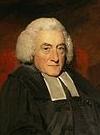





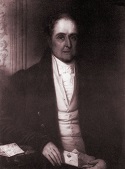
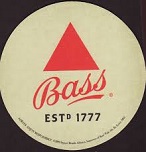
1777 By this year the British Secret Service, headed by British MP and Board of Trade and Plantations commissioner William Eden, 1st Baron Auckland (1745-1814) is spending almost £200K a year to gather intel. On Jan. 2 the Escalante Expedition returns to Santa Fe after having failed to reach Calif. On Jan. 3 Gen. George Washington's 3K-man army routs the three regiments of Britsh redcoats led by Gen. Cornwallis in the Battle of Princeton, N.J., capturing 200 POWs; "It is a fine fox chase, my boys!" says Washington, who on Jan. 5-6 moves his army into winter quarters at Morristown in the hills of N New Jersey (30 mi. W of New York City), with HQ at Jacob Arnold's Tavern on the village green; Ft. Nonsense, an earthwork fortification is built to defend munition factories there. On Jan. 12 Father Junipero Serra founds the Santa Clara de Asis mission in Calif. (#8). On Jan. 15 the people of New Connecticut (later Vermont) declare their independence as the Vermont Repub. (named by Dr. Thomas Young, from French "vert mont" meaning green mountain); on July 2 it abolishes slavery; on July 8 the Constitution of Vermont is adopted at the Old Constitution House tavern in Windsor; it is not admitted to the union until 1791. On Jan. 20 Gen. Washington invites 22-y.-o. artillery Capt. Alexander Hamilton to join his staff as an aide-de-camp; on Mar. 1 Hamilton is promoted to Lt. Col., and being the brainiest person on his staff (nice ass, too?) soon rises from private secy. to virtual chief of staff, becoming Washington's virtual adopted son, writing letters for him and even making decisions in his absence; the Continental army is in the hands of a horny geek boy with peach fuzz on his cheeks? - one bourbon, one scotch, and one beer? On Feb. 1 Don Bernardo de Galvez (1748-86) becomes Spanish gov. of La. (until 1786), and on Apr. 17 he issues a proclamation allowing trade with the U.S.; he goes on to foster intensive Spanish colonization, while the English in West Fla. are busy doing ditto, claiming the area N and W of Lake Pontchartrain. On Feb. 5 Georgia adopts a Ga. constitution. In Feb. "Mad" Anthony Wayne (1745-96) of Penn., known for his crazy tactics becomes a brig. gen. in charge of the Penn. Line. On Feb. 24 king (since July 31, 1750) Joseph I the Reformer (b. 1714) dies, and his daughter Maria I (the Pious) (the Mad) (1734-1816) becomes ruler and first undisputed queen regnant of Portugal (until Dec. 16, 1815) as wife of his addlepated brother Pedro (Peter) III (1717-86) (until May 25, 1786); Spain and Portugal settle their disputes concerning their South Am. colonies, causing Brazil to be elevated from a colony to a kingdom; too bad, about the time of Peter III's death she too becomes addlepated, getting worse after her eldest son dies of smallpox in 1791, and in Feb. 1792 she is declared insane (porphyria?), causing her son Joao (John) VI to become prince regent in 1799. On Mar 13 Congress orders its European envoys to appeal to high-ranking foreign officers to send troops to reinforce the army. On Mar. 25 the U.S. Constitutional Convention officially convenes. On Apr. 13 the Battle of Bound Brook in N.J. sees a rebel garrison surprised and routed by a force of British and Hessians. On Apr. 20 New York adopts a N.Y. constitution written by New York atty. John Jay (1745-1829) in Kingston, and George Clinton (1739-1812) (son of an Irish immigrant) is sworn in as gov. #1 of N.Y. on July 30 (until Apr. 1, 1795). The turning point of the Am. Rev. War? On Apr. 27 after British ships from Long Island Sound under Gen. William Tryon sail N to Compo Beach in Westport, where troops disembark and march through Bethel to the colonial supply depot of Danbury, Conn., sacking and burning it, the Battle of Ridgefield in W Conn. in the foothills of the Berkshire Mts. sees a 700-man colonial militia force under gen. David Wooster (b. 1710) and brig. gen. Benedict Arnold (1741-1801) take on a larger British force returning to Norwalk and maybe win maybe lose, it depends on whom you talk to, but their stand solidifies rebel feeling New England, after which the Brits never again try landing a ship to attack a colonial stronghold; Wooster is wounded and dies on May 2 after uttering the soundbyte "I am dying but with a strong hope and persuasion that my country will gain her independence"; Arnold becomes a hero even though his horse is shot from under him and his leg is seriously wounded, getting him a promotion to Maj. Gen. after a recommendation by Gen. Washington. In late spring Gen. John Burgoyne, after serving for several mo. under Sir Guy Carleton in Canada wins official approval of his srategy to invade New York from the N and hook-up with CIC Sir William Howe, separating New England from the other colonies and getting even for Bunker Hill, and leads an army of 10K men (half what he requested) S into New York; his personal belongings are dragged along in some thirty carts; misbehaving soldiers are not flogged but made to wear their coats inside-out. In Apr. 19-y.-o. Marie-Joseph Paul Yves Gilbert du Motier, Marquis de Lafayette (La Fayette) (1757-1834) leaves from the Spanish port of San Sebastian, arriving at Port Royal, S.C. on June 13 to assist the rebels, and reaches New England on July 27, being made a maj.-gen. in the Continental army on July 31; he is accompanied by German-born Baron Johann de Kalb (1721-80), who had been sent to America in 1768 by the French govt. to sound out their feelings vis a vis Britain; he is also made a maj.-gen. On May 19 after screwing up an invasion of British East Fla. and getting into an argument with his superior, Scottish-born 1st Ga. regiment brig. gen. Lachlan McIntosh (1725-1806), English-born DOI signer and Ga. gov. #2 (Mar. 4-May 8) Button Gwinnett (b. 1735) dies of gangrene three days after being wounded in a duel with him, giving him a unique kind of immortality? On May 26 a parish priest in Tome, New Mexico notes in a burial book that he interred 21 Spanish settlers who had been massacred by Comanches; there are 30 more burials next June; the town is known as "town of the broken promise" after Ignacio de Vaca promises his daughter Maria to the son of a Comanche chief, changes his mind, tries to fool the chief with a phony grave, is found out, and gets his town massacred, although the babe Maria marries the chief's son and they live happily ever after? On June 14 the Stars and Stripes is officially adopted by the Continental Congress, with John Adams declaring: "Resolved, that the Flag of the thirteen United States shall be thirteen stripes, alternate red and white; that the Union be thirteen stars, white on a blue field, representing a new constellation"; on June 14 it is unfurled for the first time at Gen. Washington's HQ in Bound Brook, N.J. On June 17 Luis de Unzaga becomes capt.-gen. of Venezuela (until Dec. 10, 1782). In June the Saratoga Campaign, a British attempt to cut New England off from the Middle and Southern States by taking control of the Hudson River Valley begins, with Gen. John Burgoyne leading one 8K-man army from St. Johns, Canada down Lake Champlain and the Hudson River, while Col. Barry St. Leger (promoted to brevet brig.-gen.) leads a smaller army from Canada by way of Lake Ontario through the Mohawk Valley; Am. gen. Israel Putnam is appointed cmdr. of the defense of the Hudson highlands; meanwhile Gen. William Howe advances up the Hudson River from New York City, with all three armies converging at Albany; meanwhile "Cowboys" (cow rustlers on the roads E of the Hudson River between British and Am. lines who claim to be Tories), and "Skinners" (Whigs who do likewise) become a problem; the murder of Jane McCrea at Ft. Edward by the British turns many against them, who take up arms against the British. On July 1 Gen. Burgoyne's British troops depart from their base at the Bouquet River, and on July 5-7 occupy Crown Point and recapture Ft. Ticonderoga on Lake Champlain, then win minor Vs at the Battle of Hubbardton on July 7 (only Am. Rev. War battle fought in Vt.) and the Battle of Ft. Ann in N.Y. on July 8, chasing the rebels S along the E bank of the Hudson River; when King George III hears about it he proclaims, "I have beat them, beat all the Americans!"; New Yorker Gen. Philip Schuyler is blamed for the loss, and replaced as head of the patriot army's Northern Dept. by "New England's idol" Gen. Horatio Lloyd Gates (1728-1806); the British army now has an open corridor from Canada to push S to New York City, but from Skenesboro on the rebels slow them down in densely forested country to only 1 mi. a day. On July 2 Vermont (named by Dr. Thomas Young, from French "vert mont" meaning green mountain) abolishes slavery, and on July 8 adopts a constitution; it is not admitted to the union until 1791. On July 4 fireworks and music from a Prussian band captured 6 mo. earlier highlight the Independence Day celebration in Philly. On July 8 the frigate USS Hancock is captured by the British ships Rainbow and Flora; the POWs, incl. cabin-boy John Blatchford are taken to Halifax, N.S. On July 23 Gen. Howe takes a large part of his army from New York City by ship to Chesapeake Bay for an attack on Philly, leaving British gen. Sir Henry Clinton in command awaiting reinforcements, causing him to wait until Oct. 3 to move up the Hudson to relieve Burgoyne. On July 26 British Col. Barry St. Leger leaves Oswego on Lake Ontario with 2K loyalists and Indians, and on Aug. 3 sieges Ft. Stanwix at the head of the Mohawk Valley; on Aug. 6 the bloody Battle of Oriskany results as a 1-mi.-long relief column of 800 New York militia under Gen. Nicholas Herkimer (b. 1728) is ambushed 6 mi. from Ft. Stanwix (2 mi. from Oriskany, N.Y.) by 400 loyalist and Indian troops of the King's Royal Regiment of New York under N.Y.-born loyalist Brig. Gen. Sir John Johnson (1741-1830), Col. Barry St. Leger, and Joseph Brant; the long bloody hand-to-hand battle is a push, and after each side suffers 30% casualties the patriots withdraw to their base without relieving the fort; Herkimer is mortally wounded, and sits under a tree directing his troops while smoking a pipe, then dies 10 days later on Aug. 16 after his leg is amputated; despite being oh so risky, it becomes the first engagement of Am. troops under the Stars and Stripes; on Aug. 22 news of another relief force cause the Indians to desert and St. Leger to return to Oswego. On July 30 Gen. Burgoyne occupies Ft. Edward, and on Aug. 11 sends 800 Hessian dragoons and Indians, led by Brunswick dragoon Lt. Col. Friedrich Baum (1727-77) to seize the Am. depot at Bennington, Vt. to seize much-needed supplies; on Aug. 16 the Battle of Bennington (4 mi. NW of Bennington) is a V for the 1.4K-man N.H. militia under Gen. John Stark (1728-1822) (who carry fighting Blue Hen Cocks for entertainment, causing N.H. to become known as the Blue Hen State), and a 2nd British force of loyalists sent by Burgoyne is repulsed by Col. Seth Warner (1743-84) and 350 veteran outlaw Green Mountain Boys (formed to fight N.Y. authority over Vt.); Burgoyne loses 207 KIA and wounded plus 600 POWs, vs. Am. casualties of 14 KIA and 42 wounded; Stark's brigade is organized and financed by John Langdon (1741-1819) from N.H., who also serves in it; Stark becomes known as the Hero of Bennington, and coins the motto "Live Free or Die". On Aug. 22 with Gen. Benedict Arnold's army approaching, the Brits abandon Ft. Stanwix and return to Canada. On Aug. 16 France declares bankruptcy. Coochy coochy coo, I got a new flag for you? On Sept. 3 the U.S. Stars and Stripes Flag is officially announced, and carried into battle for the first time by a force under Irish-born Gen. William Maxwell (-1798) at the Battle of Cooch's Bridge. America's first 9/11? On Sept. 11 the Battle of Brandywine Creek, a tributary of the Delaware River near Chad's Ford, Penn. (Wilmington, Del.) (25 mi. SW of Philadelphia) is a V for British Gen. William Howe and his 18K troops against the 11K rebels under Gen. George Washington; Lt. James Monroe (1758-1831), who was promoted to maj. on the staff of Gen. William Alexander (until 1778) took part in the battle; after feinting to the center, the Brits attack the Am. right under Gen. John Sullivan, forcing it to fall back, and Washington orders a gen. withdrawal to Chester, Penn., while rear-guard units under Gen. Nathanael Greene cover their rear, slowing Howe down and keeping him from reaching Philadelphia until Sept. 27, causing Congress to flee, moving from town to town just ahead of them; British casualties at Brandywine total 600 vs. 900 rebels killed and 400 taken POW; breech-loading rifle inventor maj. Patrick Ferguson (1744-80) has George Washington in his sights but refuses to pull the trigger, as "it is ungentlemanly to shoot a man in the back of the head". On Sept. 13 Gen. Burgoyne crosses to the W side of the Hudson River with 6K men, and is blocked by a rebel army entrenched on Bemis Heights (10 mi. S of Saratoga and 24 mi. N of Albany), under command of Gen. Horatio Gates, whose army grows from 4K men in Aug. to 11K in Oct. On Sept. 13 Prussian king (1740-86) Frederick II the Great (1712-86) issues his Coffee and Beer Manifesto, addressed to the provinces of Pomerania and Brandenburg, complaining of the increasing popularity of coffee over beer, with the soundbyte: "It is disgusting to notice the increase in the quantity of coffee used by my subjects and the amount of money that goes out of the country in consequence. Everybody is using coffee. If possible this must be prevented. My people must drink beer. His majesty was brought up on beer and so were his ancestors and his officers and soldiers. Many battles have been fought and won by soldiers nourished on beer, and the king does not believe that coffee-drinking soldiers can be depended on to endure hardship or to beat his enemies in case of the occurrence of another war"; after the govt. establishes a monopoly on coffee roasting and jacks up the price until only the wealthy can afford it, the proclamation works, and coffee is permanently eclipsed by beer as the drink of the Prussian people. On Sept. 19 the British under Gen. Burgoyne meet the ragtag rebels under Gen. Horatio "Granny" Gates at the First Battle of Saratoga ("beaver place") (ends Oct. 7) in N.Y. (later Schuylerville) at the 15-acre Freeman's Farm, 1 mi. N of the rebel lines at Bemis Heights, and hold their own, but suffer heavy casualties, causing the rebels to declare a big V, which on top of Washington's dumbo moves at Brandywine and Germantown causes the Conway Cabal to begin after up-and-coming lose cannon Irish-born Gen. Thomas Conway (1733-1800) (a former col. in the French army who presented a letter of introduction from Silas Deane to Congress that got him made brig. gen in May, then valiantly led the right flank at Germantown, after which he brazenly went over Washington's head by requesting a promotion to Maj. Gen. from Congress, which Washington found out about and tried to stop, promoting Baron Johann de Kalb instead, vindicating Conway's opinion of Washington as a ninny) vents his feelings in a letter to Gen. Gates in Oct., hinting that he should replace loser Washington as CIC, and containing the soundbyte "Heaven has been determined to save your Country; or a weak General and bad Coucellors would have ruined it"; too bad, Washington finds out about it after Gates' aide Gen. James Wilkinson gets drunk and spills the beans to a subordinate of his man Gen. William Alexander, causing Washington to fire off an angry letter to Conway, who waffles and claims he was only criticizing his staff, then offers his resignation to Congress on Nov. 14, after which anti-Washington forces in Congress, incl. Dr. Benjamin Rush (who wrote his own letter to Patrick Henry, unsigned), Richard Henry Lee, Thomas Mifflin, and Samuel Adams (who calls Washington a Fabian or Cunctator for always retreating) make him a Maj. Gen. and inspector gen. of the army to boot, reporting to War Board head Gen. Gates independently of Washington, and assign him to Washington's camp, after which he arrives in Valley Forge (W of Philly) on Dec. 29, where he is treated icily, but allowed room to step on his own dick if possible; meanwhile next Jan. 17 the anon. Thoughts of a Freeman begins circulating, containing the soundbyte "The people of America have been guilty of making a man their God"; this is Washington's lowest point, where he pulls every string he's got, and earns Mass. rep. James Lovell's epithet "Gentleman of the Blade", i.e., the kind of sacred cow that his own officers will fight duels over. On Sept. 20 (night) the British, led by Maj. Gen. Lord Charles Grey (1729-1807) remove the flints from their muskets and stage a lightning bayonet strike into Gen. Anthony Wayne's force at the Battle of Paoli Tavern (Paoli Massacre) in modern-day Malvern, Penn.; after some call it a massacre, Wayne requests his own court martial but is acquitted; Grey becomes known as "No Flint Grey", and in 1806 becomes the first Earl Grey. On Sept. 26 the British occupy Philadelphia, causing the rebels to hide the Liberty Bell in Allentown, Penn. (home of the oldest muncipal band in the U.S.?), and Congress to move to York, Penn. on Sept. 30. On Oct. 1 the First Treaty of San Ildefonso between Spain and Portugal wrests Banda Oriental (East Side) (Uruguay) from Portugal, giving Colonia and other disputed Portuguese territory on the left bank of the Rio de la Plata to Spain, with a Spanish viceroy ruling from Buenos Aires (until 1814); in return Spain cedes the Amazon Basin to Portugal; Spain also gets the island of Fernando Po and African coastal territories between the Niger and Ogoue River mouths. On Oct. 3 British gen. Sir Henry Clinton's army leaves New York City, moving up the Hudson River and capturing Ft. Clinton and Ft. Montgomery, then returning to New York City, leaving Burgoyne in the lurch. On Oct. 4 the British repulse a nearly-successful Am. attack at the Battle of Germantown, Penn. (NW of Philly) after the Am. right, led by Maj. Gen. John Armstrong Sr. (1717-95), CIC of the Penn. militia (an old friend of Gen. Washington from the French-Indian War) gets held up at Chew House in a fog, and drunk Scottish-born Am. Gen. Adam Stephen (1721-91) orders his troops to fire on Am. Gen. Anthony Wayne's, after which Armstrong issues the soundbyte "A glorious victory fought for and eight-tenths won... mysteriously lost, for to this moment no one man can... give any good reason for the flight"; Stephen is court-martialed and cashiered, and 60-ish Armstrong retires, getting elected to the Continental Congress from 1777-80 and 1787-8, which he is Washington's man; Portuguese-born 6'6" 260 lb. Am. soldier Peter Francisco (1760-1831), "the Va. Giant", "the Va. Hercules" is hospitalized at Valley Forge for two weeks, sharing a room with the Marquis de Lafayette, and becoming friends, with Lafayette getting George Washington to give him a special 5 ft. broadsword. On Oct. 6 the British under Maj. Gen. Sir John Vaughan (1731-95) sack and burn Kingston, capital of N.Y.; it is later rebuilt. On Oct. 7 5K thinning (deserting) British troops under Gen. Burgoyne meet 11K entrenched rebels led by Gen. Horatio Gates at the Battle of Bemis Heights (Second Saratoga) and get their fancy-pants butts kicked; on Oct. 8 in heavy rain Burgoyne's army retreats to Saratoga, N.Y., suffering from exhaustion and starvation, and on Oct. 17 Burgoyne surrenders his surrounded 5K-man army at Saratoga, turning the tide of the war decisively to the damned Yankee rebels; the "convention" allows him to march his army to Boston and ship to England, but Congress later rejects the terms and puts them into prison camps in Va.; Burgoyne gets Am. permission to return to England, where he is lambasted by the press and Parliament; the three Am. commissioners in France are finally able to sign an alliance with France, with Franklin becoming America's first minister to France; King George appeals twice more unsuccessfully to Gen. Amherst to take up his old post as CIC of British forces in North Am., Amherst telling the king in his second audience that it would take a force of 40K men to conquer the rebels, but he continues to advise the govt. on the war at the War Office with his eye on Britain's European enemies. On Oct. 22 the city of Stavropol (Gr. "stauropolis" = City of the Cross) in W Russia (modern-day pop. 433K) founded as a military encampment by Prince Grigory Potemkin as one of 10 fortresses built between Azov and Mozdok at the request of Catherine II the Great; in 1785 after being settled by Don Cossacs from the Khopersky Regiment, it is granted city status; in 1809 Tsar Alexander I invites several Armenian family to settle there; it goes on to become a strategic base for Russian conquest of the Caucasus. In Oct. the British capture Port Clinton, Penn., and make a heroine of rebel water pitcher pitching Molly Pitcher (Mary Ludwig Hays) (1754-1832), who allegedly fires the last gun. In Oct. Wolfgang Amadeus Mozart performs two of his piano concertos plus a challenging solo violin part in his B flat major Divertimento, K.287. On Nov. 1 John Paul Jones sails for France in the Ranger. On Nov. 1 after the V at the Battle of Saratoga, Congress declares their first nat. Thanksgiving Day, with the soundbyte: "The grateful feeling of their hearts... join the penitent confession of their manifold sins... that it may please God, through the merits of Jesus Christ, mercifully to forgive and blot them out of remembrance... and... under the providence of Almighty God... secure for these United States the greatest of all human blessings, independence and peace." On Nov. 10 Chief Cornstalk of the Shawnee, who had visited Ft. Randolph at Point Pleasant, W. Va. to discuss his problems with the Blue Jacket faction is brutally murdered by soldiers angry at the killing of one of their own by unknown Indians, along with his son Elinipsico and two other Shawnees; after Am. leaders bring the "vile assassins" to trial to stop the Shawnees from going on the war path, nobody will testify against them and they are acquitted. On Nov. 15 the Articles of Confederation, drafted by John Dickinson of Del. and James Duane (1733-97) of N.Y. are approved by the Continental Congress in York, Penn., and submitted to the states for ratification, but the states are slow in approving them because of a dispute over western lands; Congress' lack of taxing power under the Articles causes it to resort to the printing press, fueling hyperinflation. On Dec. 17 France recognizes U.S. independence. On Dec. 17-19 Washington's 11K-man army enters winter quarters at Valley Forge, Penn. (18 mi. NW of Philly), where things get so bad in their crude huts that they call it their Winter of Despair; Martha Washington winters with her hubby there, and follows him to Morristown, N.J. the next two winters, running a women's sewing circle for the troops. The uppity Wittelsbach Dynasty is whittled down to size after three years? On Dec. 30 Bavarian elector (1745-77) Maximilian III Joseph (b. 1727) dies after receiving Wolfang Amadeus Mozart and being too cheap to offer him a post, leaving no heir, and the Bavarian line of the House of Wittelsbach (founded 1119) becomes extinct, leaving only Karl IV Theodore (d. 1799) of the fractured Palatinate line (which split off in 1329), who takes it over, but soon tries to sell it to HRE Joseph II, sparking a war next year. Ft. Vincennes in Ind. is captured and sacked by the British, and renamed Ft. Sackville. Marathan PM Nana Phadnis ignores their 1776 treaty with Calcutta by giving the French a port on the W coast, pissing the Brits off and causing them to send an army to their capital city of Pune. New London, Conn.-born Capt. John Butler (1728-96) organizes Butler's Rangers in Canada, consisting of about 700 Seneca and Cayuga Indians and 700 Am. Tory loyalists. Boston-born Am. Rev. War leader and DOI signer Robert Treat Paine (1731-1814) becomes atty. gen. of Mass. (until 1790), followed by Mass. Supreme Court judge in 1790-1804 - always confused with English-born rabble-rouser Tom Paine? The capital of Delaware is moved to Dover to keep it out British hands. Fluvanna ("Anne's River") County in Va. is founded in the Va. Piedmont above the Fall Line, named after the James River; in 1828 Palmyra becomes the county sea. The British Navy begins using the Blue Peter as a gen. recall flag that is raised when a ship is ready to leave. Frederick the Great begins a campaign to control excessive consumption of coffee - bean police? Juan Bautista de Anza (1736-88) becomes gov. of New Mexico (until 1787). Bernardo de Galvez (Gálvez) y Madrid (1746-86) becomes Spanish gov. #4 of La. (until 1783), going on to crack down on British smuggling, promote trade with France, Cuba and Yucatan, aid the Am. rebels against the Brits through Irish-born intermediary Oliver Pollock (1737-1823), and reverse the policy of arming Indians to encourage them to kill each other, writing the classic 1797 report "The Vanquishment of the Heathen Consists in Obliging Them to Destroy One Another". Buddhist artist Chongjo (1752-1800) becomes Yi king of Korea (until 1800), going on to establish the royal Kyujanggak library, encourage the arts, and leave a monochrome ink drawing of a plantain and a rock in a garden. The Irish Code Duello, containing 26 commandments for monkey fighting with pistols or swords is adopted in Clonmel for the pop. of Tipperary, Galway, Mayo, Sligo, and Roscommon, and prescribed for gen. adoption in Ireland, going on to become popular in the U.S. to decide who's the more manly man. Capt. James Cook sees long-board surfers in Tahiti and Oahu and observes that the sport is recreational rather than competitive - he should have realized that from the fact they are all nude? Childless after seven years of marriage, Marie Antoinette complains to mother Maria Theresa, who sends Antoinette's brother Joseph II to France to personally attend to the matter, and after Louis XVI confides that he can't ejaculate during intercourse, even though he has noctural emissions, minor surgery 2 mo. later for phimosis (tight foreskin) cures him, and Marie Antoinette writes a letter to mommy on Aug. 30 telling about him ejaculating in her eight days earlier, and the day before, and 16 mo. later she has daughter Maria Theresa Charlotte (1778-1851), who ends up queen of France for a squirtly 20 min. in 1830; squirt, squirt, squirt, squirt, four years later there's a royal male-heir rugrat in their palace, only 11 years after their marriage as horny teenagers in a fairy palace with peeping eyes. John Dickinson, the wealthiest farmer and largest slaveowner in Del., who had been instrumental in helping Am. independence but had been in a funk ever since screwing up and refusing to sign the DOI, but had been slowly coming around to the cause, esp. after the redcoats burned down his Fairhill estate near Germantown, decides to free all 37 of his slaves, and is reborn as a delegate to the Continental Congress by 1779. The German court moves to Munich, and the Court and Nat. Theater, Germany's first nat. theater is founded in Mannheim; Wolfgang Amadeus Mozart quits his job in Salzburg and leaves for Mannheim with his mother, looking for a permanent appointment in vain, and falling for Mannheim German soprano Maria Aloysia Antonia Weber (1760-1839), causing his daddy Leopold to order him and his mother to Paris, after which she debuts in Munich then has a successful opera career in Vienna, marrying Joseph Lange in 1780, who produces a portrait of Mozart; meanwhile when he encounters her next year in Munich on his way back to Salzburg, she snubs him, and he sits down at the piano and sings "The one who doesn't want me can lick my ass" (Leck mir das Mensch im Arsch, das mich nicht will) - hey, Aloysia, what's in your wallet? A cooperative workshop for tailors is formed in Birmingham, England. John Richardson (1743-1815) of England begins pub. lit. on beer brewing (until 1805), becoming the model for beer brewery writers and going on to promote the saccharometer in brewing, becoming known as "the Father of Methodical Brewing"; his son Philetus Richardson (1776-1838) becomes head porter beer brewer at Whitbread's Hind's Head Brewery. Bass Brewery is founded in Burton-on-Trent, England by William Bass Jr. (1717-87), producing Bass Pale Ale, and beginning exports to Russia in 1784; after William's death, his son Michael Thomas Bass Sr. (1759-1827) runs the brewery with his brother William Bass III, taking sole control in 1795, becoming the largest brewery on Earth in 1877 (1M barrels/year); the red triangle Bass logo becomes the first registered trademark in the U.K.; in 1967 it merges with Charrington United Breweries to become Bass Charrington, the largest brewing co. in the U.K.; in 2000 it is acquired by Interbrew. The Marquis de Sade, who fled from Lacoste then returned last year, is confronted by a father of one of the servants he had done the nasty thing with, who tries to shoot him at point-blank range, but the gun misfires; later in the year, his mother dies, but he is tricked into thinking that she's just ill and visits her in Paris, where he is arrested and imprisoned in the Chateau de Vincennes, where he appeals his death sentence in 1778 but remains imprisoned under his mother-in-laws lettre de cachet (arrest warrant); after escaping and being recaptured, he meets fellow prisoner Comte de Mirabeau (1749-91), and despite both being writers of erotica they begin to hate each other; in 1784 Chateau de Vincennes is closed, and de Sade is transferred to the Bastille, followed by an insane asylum in Charenton near Paris in 1789, 10 days before the Bastille is stormed. Architecture: The Tomb of the Marechal de Saxe (1696-1750) in the St. Thomas Lutheran Church of Strasbourg (begun 1753) is completed, becoming the masterpiece of French Rococo sculptor Jean Baptiste Pigalle (1714-85). English architect Henry Holland (1745-1806) begins the Hans Town development on 89 acres of marshes leased from the Cadogan family, which becomes one of the most fashionable areas in metro London (Knightsbridge and Chelsea), incl. Sloan St., Sloane Square, Hans Place, Hans St., and Hans Crescent. Inventions: The first iron boat is produced in Yorkshire, England. Charles Augustin de Coulomb (1736-1806) invents the Torsion Balance; he also wins an academy prize for work on magnetic needles. Strasbourg-born Sebastien Erard (1752-1831) of Paris invents the modern pianoforte; Franz Joseph Haydn (1732-1809) switches to it. Oliver Evans (1755-1819) of Newport, Del. invents a machine for making teeth for wool carding, going on to make other improvements to textile machinery. Antoine-Laurent Lavoisier demonstrates that air is made up mostly of nitrogen and oxygen - by laughing it off? Maurice Grey and Auguste Poupon begin manufacturing Grey Poupon white wine mustard in Dijon, France; Grey provides the recipe, Poupon the money - pardon me sir? Hunchbacked lecherous hypochrondriac Anglophile German scientist (first prof. of experimental physics Georg Christoph Lichtenberg (1742-99) (coiner of the term "aphorism") discovers cool fractal Lichtenberg Figures, the principle of modern xerographic copying. English sailmaker Samuel Miller of Southampton invents the circular saw. Italian scientist ? becomes the first to figure how to tell if an eel is female; it takes until 1882 to figure out how to identify males. Science: Carsten Niebuhr (1733-1815), a German who went on a Danish scientific expedition to Iran in 1761-7 pub. the first accurate and complete copies of the inscriptions on the 6th cent. B.C.E. Behistun Rock, spurring an effort to decipher the long-lost cuneiform on them. Karl Wilhelm Scheele almost discovers ultraviolet when he studies how light of different colors darkens silver chloride, and finds that the effect is greatest toward the violet end of the spectrum. Nonfiction: James Anderson, Nature of the Corn Laws. Jean-Sylvain Bailly (1736-93), Letters on the Origin of the Sciences. Thomas Day (1748-89), The Desolation of America. John Howard, The State of the Prisons of England and Wales. Francis Hopkinson (1737-91), Letter Written by a Foreigner on the Character of the English Nation; anti-British satire by a Philly atty. and DOI signer, who becomes Penn. admiralty judge in 1779-89, and goes on to write poetry, compose opera, serve in the Constitutional Convention, and design the first U.S. flag. David Hume (1711-76), Autobiography (posth.). Antoine-Laurent Lavoisier (1743-94), Sur la Combustion en General - Stahl, Stahl, Stahl? Gotthold Lessing (1729-81), Ernst und Falk; pleads for religious and political toleration. Joseph Priestley (1733-1804), Disquisition Relating to Matter and Spirit. William Robertson (1721-93), The History of America (4 vols.) (1777, 1796). Karl Wilhelm Scheele (1742-86), On Air and Fire; shows that air is composed of oxygen and nitrogen. Robert Waddington (-1779), An Epitome of Theoretical and Practical Navigation; a book that can "teach the young navigator every particular essential to his art, without his being under the necessity of having recourse to any other author." (Edinburgh Mag.) Music: Christoph Gluck (1714-87), Armide (Paris). Franz Joseph Haydn (1732-1809), Symphony No. 63 in C major ("La Roxelane"). Wolfgang Amadeus Mozart (1756-91), Divertimento, K.287; Oboe Concerto (summer); composed for itinerant Italian player Giuseppe Ferlendis; he later arranges it as Concerto No. 2 for Flute for Dutch flautist Ferdinand de Jean. Art: Thomas Gainsborough (1727-88), The Watering Place. Jean-Baptiste Greuze (1725-1805), La Cruche Cassee. Francesca Guardi, Santa Maria della Salute (Venice). Anton Raphael Mengs (1728-79), Perseus and Andromeda. Plays: Gyorgy Bessenyei (1747-1811), The Philosopher; first comedy in the Hungarian language? Pierre Choderlos de Laclos (1741-1803), Ernestine (July 19); inspired by a novel by Marie-Jeanne Riccoboni; Marie-Antoinette attends the debut, which is a big flop. Hannah More (1745-1833), Percy (tragedy) (Dec.) (Covent Garden, London); a hit. Richard Brinsley Sheridan (1751-1816), The School for Scandal (Drury Lane Theatre, London) (May 8); Sir Benjamin Backbite, Rowley, Snake, Mrs. Candour, Crabtree; Lady Sneerwell tries to hook Charles Surface (William "Gentleman" Smith) away from Maria, who is also wooed by rival Joseph Surface (John Palmer); Fanny Abington plays Lady Teazle; after it fails on the first night, he hires a better actor, who makes it a hit, after which it becomes an English classic; filmed in 1923 and 1930 - a succès de scandale, succès d'estime, or succès fou? Poetry: Thomas Chatterton (1752-70), The Rowley Poems; Romantic goop attributed to fictitious 15th cent. monk Thomas Rowley by a pimply teenie from Bristol; while people gobble it up, he gets hurt when nobody buys stuff under his real name, and poisons himself with arsenic in Apr. 1770, after which he is out of the way so the publishers can take over with the good stuff, turning on Wordsworth and causing Keats to dedicate his "Endymion" to him. Christoph Martin Wieland (1733-1813), Das Sommermarchen; Geron der Adelige (romances). Novels: Henry Mackenzie (1745-1831), Julia de Rubigne. Clara Reeve (1729-1807), The Champion of Virtue (The Old English Baron) (Gothic romance); competition for Horace Walpole's "Castle of Otranto"; influences Mary Shelley's "Frankenstein". Births: German sculptor Christian Daniel Rauch (d. 1857) on Jan. 2 in Hesse; student of Johann Gottfried Schadow. English antiquarian William Martin Leake (d. 1860) on Jan. 14 in London. French chemist Bernard (Barnard) Courtois (d. 1838) on Feb. 12 in Dijon. German Romantic "Undine" poet-novelist Friedrich Heinrich Karl de la Motte, Baron Fouque (Fouqué) (d. 1843) on Feb. 12 in Brandenburg. British vice-adm. Sir Henry Hotham (d. 1833) on Feb. 19; 3rd son of Beaumont Hotham, 2nd baron Hotham. U.S. Dred Scott Decision chief justice #6 (1836-64) and U.S. atty. gen #11 (1831-3) (Roman Catholic) Roger Brooke Taney (d. 1864) (pr. TAH-nee) on Mar. 17 in Calvert County, Md.; educated at Dickinson College. U.S. Rep. (1811-21) and Sen. (1849-52) (Ky.), Speaker of the U.S. House (1823-5), and U.S. secy. of state #9 (1825-9) (Freemason) ("the Great Compromiser") Henry Clay Sr. (d. 1852) on Apr. 12 in Hanover County, Va.; Baptist minister father named Sir John; 2nd cousin of Cassius Marcellus Clay (1810-1903). German astronomer-physicist and mathematician (greatest of all time?) Johann Carl (Karl) Friedrich Gauss (d. 1855) on Apr. 30 in Braunschweig - the fledgling German Master Race might not take over the world, but it comes darned close to taking over math? French chemist Louis-Jacques Thenard (Thénard) (d. 1857) on May 4 in La Louptiere (modern-day Aube), Champagne. Argentine adm. (founder of the Argentine navy) William (Guillermo) Brown (d. 1857) on June 22 in Foxford, County Mayo, Ireland; emigrates to the U.S. at age 9, and is pressed into the British navy at age 19. Scottish arctic explorer Adm. Sir John Ross (d. 1856) on June 24 near Stranraer; uncle of polar explorer Capt. Sir James Clark Ross (1800-62). English "The Constitutional History of England" historian Henry Hallam (d. 1859) on July 9; only son of Windsor canon John Hallam; educated at Eton College, and Christ Church, Oxford U.; father of Arthur Henry Hallam (1811-33) and Henry Fitzmaurice Hallam (-1850). German Romantic painter (inventor of the Color Ball) Philipp Otto Runge (d. 1810) on July 23 in Wolgast, West Pomerania. Scottish "The Pleasures of Hope" poet Thomas Campbell (d. 1844) on July 27 in Glasgow; son of a merchant; educated at the U. of Glasgow; studies law at Edinburgh; moves to London in 1803. Danish physicist (discoverer of electromagnetism) Hans Christian Oersted (d. 1851) on Aug. 14 in Rudkobing. Sicilian Bourbon king #3 (1825-30) Francis I (Francesco Gennaro Giuseppe) (d. 1830) on Aug. 19 in Naples; son of Ferdinand I (1751-1825). Am. miniaturist Edward Greene Malbone (d. 1807) in Aug. in Newport, R.I. U.S. atty. gen. #13 (1838-40) Felix Grundy (d. 1840) on Sept. 11 in Berkeley County, Va. (W. Va.); grows up in Ky. English banking house founder (Jewish) Nathan Mayer Rothschild (d. 1836) on Sept. 16 in Frankfurt-am-Mein, Germany; 3rd son of "miscellany trader" Mayer Anselm Rothschild (1744-1812) and Gutle Schnapper (1753-1849); father of Lionel Nathan de Rothschild (1808-79). French conservative statesman Casimir Pierre Perier (Périer) (d. 1832) on Oct. 11 in Grenoble. Am. itinerant preacher Lorenzo Dow (d. 1834) on Oct. 16 in Coventry, Conn.; husband of Peggy Dow (1780-1820). German Romantic patriot-poet-novelist-dramatist Bernd Heinrich Wilhelm von Kleist (d. 1811) on Oct. 18 in Frankfurt an der Oder, Brandenburg. British princess Sophia (d. 1848) on Nov. 3 in Buckingham House, London; 12th child and 5th daughter of George III and Charlotte of Mecklenburg. English actress Harriet Mellon (b. 1837) on Nov. 11; 2nd wife (1815-) of Thomas Coutts (1735-1822). French salon host Jeanne-Francoise Julie "Juliette" Adelaide Recamier (Adélaïde Récamier) (d. 1849) on Dec. 4 in Lyon; friend of Chateaubriand, and opponent of Napoleon; known for her short hairstyle and her sofa, which becomes known as the recamier; retires to L'Abbaye-aux-Bois convent in Paris in 1814, where she is visited by Francois de Chateaubriand, Lucien Bonaparte, Mathieu de Montmorency et al. Russian Romanov tsar #14 (1801-25) Alexander I (d. 1825); eldest son of Paul I (1754-1801); grandson of Catherine II the Great (1729-96); brother of Nicholas I (1796-1855). British lt. gen. Benjamin Alfred d'Urban (d. 1849) on May 25 in Halesworth, Suffolk. Deaths: French architect Pierre Contant d'Ivry (b. 1698) on Oct. 1 in Paris. Canadian-born French gov.-gen. of New France (1755-60) Pierre de Rigaud, marquis de Vaudreuil-Cavagnial (b. 1698) on Aug. 4 in Paris. Am. botanist John Bartram (b. 1699) on Sept. 22 in Philadelphia, Penn. French hostess Madame Marie Therese Rodet Geoffrin (b. 1699) on Oct. 6 in Paris. Swiss scientist-poet Albrecht von Haller (b. 1708) on Dec. 12; addicted to I've-become-comfortably-numb opium for the last few years; leaves the unfinished Bibliotheca Medica. French novelist Claude Prosper Jolyot de Crebillon (b. 1707) on Apr. 12. Hessian gen. Leopold Philip de Heister (b. 1707) on Nov. 19 in Hesse-Cassel. Am. Rev. War gen. David Wooster (b. 1710) on May 2 in Danbury, Conn. (KIA). Portuguese king (1750-77) Joseph I the Reformer (b. 1714) on Feb. 24 in Sintra Palace, Sintra. French artist Guillaume Coustou the Younger (b. 1716) on July 13. Irish actor Spranger Barry (b. 1719) on Jan. 10. Shawnee Chief Cornstalk (b. 1720) on Nov. 10 in Ft. Randolph, Va. (executed along with his son Elinipsico and two other Shawnees in reprisal for the killing of an Am. militiaman by unknown Indians). English "Great Panjandrum" dramatist-actor Samuel Foote (b. 1720) on Oct. 21 en route to France. Bavarian elector (1745-77) Maximilian III Joseph (b. 1727) on Dec. 30 (smallpox). U.S. gen. Nicholas Herkimer (b. 1728) on Aug. 16 (KIA). German mathematician-physicist-philosopher Johann Heinrich Lambert (b. 1728) on Sept. 25; the angle-preserving Lambert Conformal Conic Projection is named for him, as well as the cgs unit of brightness. Palestinian rabbi Haim Isaac Carigal (b. 1733) in Barbados. English-born Am. patriot (DOI signer) Button Gwinnett (b. 1735) on May 19 in Thunderbolt (near Savannah), Ga. (gangrene); killed in a duel with Gen. Lachlan McIntosh of Ga.; his signature becomes the most valuable Am. autograph, behind only Julius Caesar and William Shakespeare.


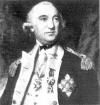








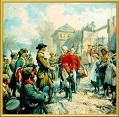



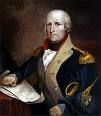

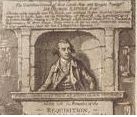
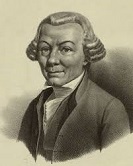

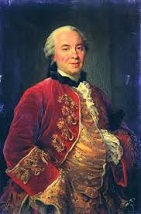



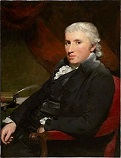

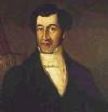



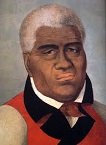






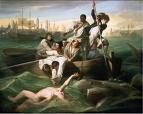
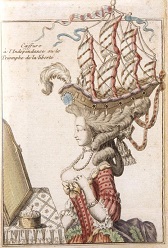
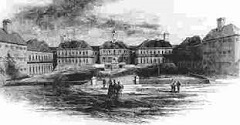
1778 John Adams begins a 10-year series of missions to Europe, becoming the first U.S. minister to the Court of St. James after a hazardous winter voyage (with son John Quincy) dodging British warships; he arrives to find that Franklin has already negotiated a treaty with France, and that he's just expected to be his "virtual clerk", i.e., a "cipher"; he tries to push for the French navy to come to the colonies' aid, but can't speak Frog Talk (French); meanwhile, his wife Abigail suffers from loneliness back in Mass. - you look mahvelous, dahling? On Jan. 2 Gen. George Washington approves recommending that Rhode Island's troop quota be completed with black slaves, who would be promised their freedom in return for military service; in the spring Rhode Island raises a black regiment by promising slaves their freedom. On Jan. 3 Austria occupies lower Bavaria after new Jesuit-educated Mennonite-hating Bavarian duke-elector (since 1777) Karl IV Theodor (Charles IV Theodore) (1724-99) of the Oberpfalz-Sulzbach line of the house of Wittelsbach (which has been elector of the Palatinate in 1742) secretly cedes it to HRE Joseph II in exchange for the Austrian Netherlands, pissing-off the entire Bavarian nation; on July 3 Frederick II the Great of Prussia, fearing that this move will equalize his gain of Silesia in 1741 in his power struggle with Austria, allies with Frederick Augustus I of Saxony and declares war on Austria to make them give it back and replace Karl Theodor by his manageable heir (Augustus' mother's brother) Duke Karl (Charles) II August Christian of Zweibrucken (1746-95), starting the bloodless War of the Bavarian Secession (Potato War) (Kartoffelkrieg) (ends 1779), in which Bohemia is invaded by a Prussian-Saxon army, which maneuvers around to deny food supplies until Big Karl cries uncle. On Jan. 18 British explorer Capt. James Cook (1728-79) discovers the Hawaiian Islands, and names them the Sandwich Islands after his friend John Montagu, 4th Earl of Sandwich (1718-92), first lord of the admiralty in 1771-82; after being taken for a god (Lono?), and leaving the natives with their first venereal disease, he leaves on a quest for the Northwest Passage in the Arctic, recording the first encounter with he leaves on a quest for the Northwest Passage in the Arctic, recording the first encounter with totem poles in Vancouver Island, calling them "house posts that depicted anthropomorphic beings" - an example of kulturkreis or simultaneous evolution? In Nov. Capt. Cook returns to Hawaii after failing to find the Northwest Passage, and first spots the Hawaiian island of Molokai, ruled by Kahekili (Kane-Hekili) (Kahekilinui'ahumanu) II (1737-94), who also rules Lanai, Kahoolawe, and Maui (except the Hana district); Kalani'opu'u (1729-82) (Terreeoboo, King of Owhyhee according to Capt. Cook), king of the big island of Hawaii sends his army under warrior-gen. Kamehameha I the Great (1737-1819) to Lana'i (Lanai), under the rule of Kahekili II, and they massacre 3K on the island, which gives the island its name, meaning "day of conquest". On Jan. 19 the Conway Cabal reaches its moment of truth when Gen. Horatio Gates and Gen. Thomas Conway make their play before the Continental Congress in York, Penn., only to find that Washington has outfoxed them by sending the Marquis of Lafayette to claim that France is behind him, and trip them up by making them try to hide their original "weak general" letter, which he already gave to them, making them look duplicitous, causing the anti-Washington faction to collapse; Thomas Mifflin resigns as secy. of the War Board, Gates returns to his troops after being chastened, and Conway is shuttled off to a subordinate command in the Hudson Highlands, causing him to resign but continue to badmouth Washington, causing Gen. John Cadwalader (1742-86) (who messed up at the Battle of Trenton, being ordered to reinforce Washington from the S, but couldn't get his artillery over the river, causing him to return to Penn. and leave Washington unsupported, only to be treated warmly after it came out all right, giving him a case of hero worship?) to fight a duel with him on July 4, shooting him in the "lying mouth", causing Conway to believe he's about to die and write a letter of apology to Washington, then recover and high-tail it back to France, where he later joins the losing side in the French Rev. and ends up back in Ireland, as if anybody cares by then. In Jan. Gen. Washington discovers plans for an Am. invasion of Canada, and calls them a "child of folly". On Feb. 6 the U.S. wins official recognition from France, signing the Franco-American Treaty of Alliance in Paris, binding the two nations together "forever against all other powers", becoming the only alliance treaty for the U.S until 1949; Gen. and Baron Jeffrey Amherst, hero of Montreal and husband of "the white pussy" in Kent finally enters the British cabinet as CIC of the British army, then field marshal, insisting that British forces be withdrawn from North Am. except Canada, and hostilities continued only through a naval blockade; Sir Henry Clinton becomes CIC of British forces in North Am. (until 1782). On Feb. 14 John Paul Jones and French Adm. Toussaint-Guillaume Picquet (Piquet) de la Motte (1720-91) exchange gun salutes in Quiberon Bay, France, becoming the first time that the U.S. Stars and Strips flag is carried to a foreign port, and the first time it is officially recognized by another nation (9-gun salute). German military training to the rescue? On Feb. 23 Baron Friedrich Wilhelm Ludolf Gerhard Augustin von Steuben (1730-94) arrives from Prussia, Germany to train the Am. Continental troops in the midst of their Winter of Despair, uttering the soundbyte "With regard to military discipline, I may safely say that no such thing existed in the Continental Army" before creating an honor guard of 120 soldiers, who go on to train others, teaching them the basic points of training and camp layout that continue to be used to modern times; he becomes a U.S. citizen in 1784 - Forvard march! Licht recht licht recht? Voltaire and Franklin-worshipping reach critical mass simultaneously? In Feb. Benjamin Franklin visits the ailing Voltaire in Paris, and asks him to bless 7-y.-o. Benny Bache for him, which he does in ceremonial fashion by placing his hands on the boy's head and saying, in English, "God and Liberty"; Franklin and Voltaire meet again on Apr. 29 at the Academie Royale, and ostentatiously embrace in the French manner, drawing acclamations and comparisons to Solon and Sophocles; Voltaire dies in Paris on May 30 at age 84. On Mar. 15 Nootka Sound outside modern-day Vancouver, Canada is discovered by Capt. James Cook. On Mar. 19 South Carolina adopts a constitution. In Mar. Congress orders the recruitment of Indians into the Continental Army - the original Washington Redskins? On Apr. 1 New Orleans businessman Oliver Pollock (1737-1823), financier of rebel operations in the west creates the "$" (dollar sign) symbol from the S-P symbol for peso. On Apr. 7 William Pitt the Elder (b. 1708) collapses during a speech in the House of Lords, intending to give a speech against Am. independence; his son William Pitt the Younger (1759-1806) helps carry his dying old man from the chamber; he dies on May 11 - does he take it as an omen? On Apr. 21 Harvard-educated gunpowder manufacturer Samuel Phillips Jr. (1752-1802) founds Phillips Academy in Andover, Mass. to inculcate a Puritan Calvinist-flavored education to students of all religious persuasions, as long as "they be able to read English well", and prep them for Yale U.; Josiah Quincy II's son JQ III is one of the first students; in 1781 his uncle John Phillips founds Phillips Exeter Academy in Exter, N.H., which preps students for Harvard U.; PAA goes coed in 1973, and PEA in 1970. In Apr.-May (28 days) John Paul Jones sails from Brest, France in the Ranger, captures the British naval sloop HMS Drake, takes seven prizes and 200 POWs, spikes the guns of the forts at Whitehaven, and raids the estate of the earl of Selkirk on the Scottish coast in an attempt to kidnap him, but he isn't home. In May Ethan Allen, hero of Ticonderoga is released from prison in England in exchange for British Lt. Col. Archibald Campbell (1739-91) of Inervneill (captured June 16, 1776), whose confinement Gen. Washington had called "shocking to humanity". On June 17 French frigate Belle Poule duels British frigate HMS Arethusa, escaping after a 2-hour battle after Artethusa loses a mast, becoming the first battle between French and British naval forces in the Am. Rev. War, getting celebrated in France and inspiring the Frigate Hairstyle of Marie Antoinette, which catches on with the French female aristocracy, who start to duck chandeliers and bankrupt their hubbies to pay for it, causing a scandal that contributes to her unpopularity. In mid-June learning that a French fleet is sailing to America, where they might trap the British if they stay, the British evacuate Philly for New York City on June 18, and Washington withdraws from Valley Forge the next day, appointing Gen. Benedict Arnold as military gov. of Philadelphia; after several maneuvers by both sides, on June 28 Washington (whose 11K troops have been trained by von Steuben, causing him to be eager to test them) attacks the 15K-man British army under Gen. Sir Henry Clinton at the Battle of Monmouth (Court House) in N.J. (last major battle in the north) in sweltering high-90s heat; Washington orders eccentric English officer Maj. Gen. Charles Lee (his oldest maj. gen.) to attack, but instead he retreats directly into Washington and his troops without notifying him, claiming he had been outnumbered 10K to 5.4K, and after finding and cussing Lee out, Washington personally takes charge, rallying them to stand and fight; the British escape the next day after sustaining over 1K casualties vs. 200+ for the patriots; Lee is arrested, then court-martialed in July, losing his command for one year, causing him to begin open attacks on Washington's character; Molly Pitcher gains more fame at Monmouth Court House when she drops her water pitcher and takes her wounded husband's place at a cannon, then is presented by Gen. Nathanael Greene to Gen. Washington, who makes her a sgt. and places her on the list of half-pay officers for life; later a Monument to Molly Pitcher is erected on the Monmouth battlefield (plus one at her hometown of Carlisle, Penn.); Lee unsuccessfully lobbies Washington to use rebel guerrillas to exact punitive retribution on pro-British troops and non-combatants, but Washington prefers to keep the (now co-ed?) army professional and answerable to Congress; after Monmouth, James Monroe is promoted to lt. col. and commissioned to raise a new regiment in Va., where he meets Va. gov. Thomas Jefferson and begins a lifelong friendship. On June 9 after becoming pres. of Yale College (until 1795), Rev. Ezra Stiles frees his slave Newport; after making friends with visiting world-traveller Rabbi Haim Isaac Carigal (1733-77) in Newport, R.I., he goes on to try to force students to study Hebrew (like at Harvard), and gives his first commencement speech on Sept. 1781 in Hebrew, Aramaic, and Arabic; in 1790 after the students balk he gives up and makes it optional. On June 22 N.J. rep. John Hart hosts Gen. Washington's 12K-man army on his farm in N.J., where Washington holds his Council of War in the Hunt House; the troops leave on June 24, and happy Hart dies next May 11 at age 66. On June 28 a British peace offer is rejected - lay down our weapons and have our commander come out and kiss his what? In the summer the rebels under Capt. Leonard Helm (1729-82) occupy Ft. Sackville after the British withdraw to Detroit. On July 3 the Wyoming Massacre (Battle of Wyoming) in the Wyoming Valley of Penn. takes place as 400 Am. settlers are killed at Wintermoot's Fort after they are drawn out of the protection of the fort and ambushed by Tories and Indians led by Tory loyalist Capt. John Butler; the Continental Congress sends a force into the valley next year. On July 6 the news of the war between France and England reaches Calcutta, after which Warren Hastings easily takes Chandernagore in Bengal, which had been under French control since 1684. On July 10 Louis XVI of France declares war on England in support of the Am. Rev. On July 27 the British fleet under Adm. Augustus Keppel (1725-86) and Adm. Sir Hugh Palliser (1723-96), and the French fleet under Adm. Louis Guillouet, Comte d'Orvilliers (1708-92) and Adm. Luc Urbain de Bouexic (Bouëxic), Comte de Guichen (1712-90) fight to a standoff in the first First Battle of Ushant 100 mi. W of the French island of Ushant in the English Channel off NW France, after which public reaction causes the resignation of Chartres and Keppel. On Aug. 29 the Battle of Rhode Island (Quaker Hill) (Siege of Newport) sees the Continentals under Gen. John Sullivan abandon their siege of Newport, R.I. and withdraw to N Aquidneck Island, causing the British supported by newly-arrived Royal Navy ships to attack them, forcing them to the mainland; the 1st Rhode Island Regiment of Col. Christopher Greene (1737-81), consisting of 225 men incl. 140 black fights in the battle, losing 3 KIA, nine wounded, and 11 MIA. On Aug. 3 Maria Theresa's La Scala opera house, built in Milan on the site of the royal theater which had burned down in 1771 opens; the first opera by Venetian composer Antonio Salieri (1750-1825) is performed there. On Aug. 31 the British massacre the Indian Company (Indians in the American army), becoming known as the Stockbridge Massacre. On Sept. 7-18 Shawnee Indians, instigated by the British lay siege to Boonesborough in Ky., and capture Daniel Boone for several mo., during which chief Blackfish adopts him as a son; after hearing of plans to raid Boonesborough again, he escapes to warn them. On Sept. 7 the U.S. signs the first of 370 treaties with the Am. aborigine (Amerindian) tribes, the Delaware; the last is signed in 1868, and in 1871 Congress declares that the U.S. no longer views native tribes as separate nations and will sign no more treaties - except to share casino profits? In Sept. Ben Franklin's estranged son William is released from his captivity in Conn. through a prisoner exchange, and moves to New York City, becoming pres. of the Board of Associated Loyalists. In Oct. Va. passes an Act Prohibiting the Farther Importation of Slaves. On Nov. 2 5-y.-o. Warwick, R.I.-born Frances Slocum (1773-1847) is kidnapped by Lenape Indians in the Wyoming Valley of Penn.; she is renamed Maconaquah ("young bear"), marries a chief of the Miami tribe, has four children, and lives the rest of her life with them near Peru, Ind. The Iroquois Confederation (Six Nations) (Mohawk, Oneida, Tuscarora, Onondaga, Cayuga, Seneca) sides with England and attacks in Penn. and N.Y., hoping to preserve a permanent Indian nation between the British Empire and the U.S.; only the Oneidas and some Tuscaroras go for the rebel side; on Nov. 11 Iroquois Indians led by Tory Capt. John Butler and Mohawk chief (British col.) Joseph Brant (1742-1807) (who attended the Indian Charity School in Lebanon, Conn. in 1761 with Conn. clergyman's son Samuel Kirkland, and lives a double life as a colonial gentleman and Episcopal missionary among the Mohawks) massacre the 47 inhabitants of Cherry Valley, N.Y. with tomahawks; if anybody lives, Brant becomes known for humanity and preventing torture? In Nov. Capt. Cook returns to Hawaii after failing to find the Northwest Passage, and first spots the Hawaiian island of Molokai; Kalani'opu'u (1729-82) (Terreeoboo, King of Owhyhee according to Capt. Cook), king of the big island of Hawaii sends his army under warrior-gen. Kamehameha I the Great (1737-1819) to Lana'i (Lanai), under the rule of Maui, and they massacre 3K on the island, which gives the island its name, meaning "day of conquest". In Oct.-Nov. Alexander Hamilton, under the pseudonym Publius castigates future U.S. Supreme Court Justice, Md. congressman Samuel Chase for scheming to profit from the arriving French's fleet's need for flour by cornering the market and doubling the prices - guilt overrated? In Nov. British Gen. Sir Henry Clinton dispatches units from N.Y. to N.J. under Lt. Col. Archibald Campbell (1739-91) to join Huguenot Brig. (later maj.) Gen. Augustin Prevost (1723-86) and his Florida Rangers in attacking Savannah (capital of Georgia) as part of a grand plan to take the city and then roll N while gathering support from the perceived mass of sleeping Tory loyalists in the countryside; on Dec. 29 British troops capture Savannah and begin a parry-and-thrust drive N towards Charleston. On Dec. 17 the British under Irish-born Lt. Col. Henry Hamilton (1734-96) return and recapture Ft. Sackville (until 1779) - the fort that loves to be sacked? On Dec. 23 Alexander Hamilton acts as the second for (his gay lover?) col. John Laurens (1754-82) of S.C. in a duel with court-martialed Washington-slandering gen. Charles Lee (d. 1782); they call it off after Laurens wounds Lee in the right side, and Lee is released from duty on Jan. 10, 1780, soon dying of TB. The forces of Nguyen Anh recapture Saigon from the Tay Son brothers (until 1781). Lord North sends a commission, headed by Frederick Howard, 5th Earl of Carlisle (1748-1825), and incl. William Eden, 1st Baron Auckland to attempt a reconciliation with the Am. colonies, but it accomplishes diddly squat. Am. frontiersman ("Conqueror of the Old Northwest") ("Hannibal of the West") ("Washington of the West") George Rogers Clark (1752-1818) leads soldiers down the Ohio to take the Illinois country from the British. German-born Am. frontier hero Phillip Hamman Sr. (1753-1832) helps save Fort Donnally in Greenbrier County, W. Va. from a Shawnee attack by 200 warriors led by Cornstalk, becoming known as "the Savior of Greenbrier". Am. Gen. John Sullivan begins a siege of Newport, R.I. (until 1779). Va.-born William Lee (1739-95) is dispatched by the Continental Congress to Vienna to seek recognition; too bad, Maria Theresa refuses him an audience, and bans all trade between the Austrian Netherlands and the "rebel colonies" - the original girly men? Thomas Paine is appointed secy. of the committee of foreign affairs by the Continental Congress (until 1779). A funeral of a British officer in Christ Church in Cambridge, Mass. (known for its Tory congregation) causes an enraged Yankee mob to wreck its interior and get it shut down for the rest of the Am. Rev. London-born Sir George Saville, 8th Baronet (1726-84) introduces the Relief Act to the Irish Parliament, removing disabilities of Roman Catholics and Presbyterians (mainly in Ulster) in holding office - now hungry Catholics can join the British army and fight in America? The Liberty Bell is taken out of hiding and replaced in Independence Hall. Gen. George Washington orders a 1.7K-ft. iron chain weighing 275 lbs. per 3.5-in. link forged by 17 blacksmiths and strung across the Hudson River at West Point, N.Y. to hinder the Brits. Pluckemin Continental Artillery Cantonment on the W side of Second Watchung Mt. N of the village of Pluckemin, N.J. is founded as the Continental Army's winter cantonment, becoming the first U.S. military academy before West Point in 1802. Welsh buccaneer Robert Edwards (1716-88) allegedly leases 77 acres of prime land (now worth umpteen billion bucks) on Manhattan Island (incl. modern-day Wall St. to Trinity Church) on a 99-year basis; he dies in a shipwreck and his heirs can't get the land back, but here's a big chance for smart lawyers? Juan Bautista de Anza leads a punitive expedition across new Mexico and Colorado against the Comanches, killing Comanche chief Cuerno Verde (Sp. "green horn") (known for green tinted horns in his headdress) on Sept. 3, 1779 at what is later called Rye, Colo. King Carlos III of Spain sends Spanish settlers from the Canary Islands to La., where they settle in St. Bernard Parish and become known as Islenos (Isleños) or Spanish Cajuns; Bernardo de Galvez y Madrid founds Galvez, La. (originally Galvez Town) 10 mi. SE of Baton Rouge. The British garrison in New York (which holds the pay chests of all British forces in America), feeling threatened by Washington's army, uses a detachment of the Royal Engineers from Halifax, Nova Scotia to dig the Money Pit on Oak Island, but later recovers the chests when the danger is past? The islands of Fernando Po (modern Bioko) and Annobon (Pagalu) in the Gulf of Guinea in W Africa come under Spanish control (until 1968). The fortified seaport of Gijon (Gijón) in NW Spain is equipped to handle West Indian trade. Samuel Heinicke (1727-90) opens the first public school for the deaf in Leipzig, Germany, where he teaches the Sound (Aural) Method of Lip-Reading, first teaching them to make the sound themselves. Ludwig von Beethoven's father presents the 8-y.-o. boy as a 6-y.-o. infant prodigy. Franz Anton Mesmer draws admiring crowds to his mesmerism experiments in Paris - wanna hypnotize me? Slovenian mountaineers climb Mt. Triglav. Architecture: Parkhurst Prison on the Isle of Wight is founded as a military hospital and children's asylum, becoming a children's prison by 1838, sending 123 Parkhurst apprentices to New Zealand in 1842-3, and 1,500 boys to Australia and New Zeland in 1842-9, after which it accepts adult convicts, becoming a prison for young males in 1863, known for harsh treatment; celeb prisoners incl. Yorkshire Ripper Peter Sutcliffe, the Kray twins, John Clark AKA Mr. Asia Drug Syndicate, and Moors Murderer Ian Brady. Inventions: English locksmith Robert Barron invents the mortise lock with pin tumbler. Joseph Bramah (1748-1814) of Yorkshire, England invents an improved water closet (flush toilet). Charles Francois Dupuis (1742-1809) of France invents a working telegraph. John Smeaton (1724-92) experiments with an improved diving bell. Science: Carl Wilhelm Scheele discovers the element Molybdenum (Mo) (#42), and proves that molybdenite (molybdenum sulfide), graphite (black lead or plumbago), and galena (lead II sulfide) are three different minerals. Nonfiction: Paul Joseph Barthez (1734-1806), Nouveaux élémens de la science de l'homme; uses the term "vital principle" for the cause of life, taking a neutral position on the spiritualistic-materialistic debate. Benjamin Bell (1749-1806), A Treatise on the Theory and Management of Ulcers; becomes a std. work. George-Louis Leclerc de Buffon (1707-88), Epoques de la Nature; asserts that the Earth is 74,832 years old and that humans are relative newcomers. Jonathan Carver (1710-80), Travels Through the Interior Parts of North America in the Years 1766, 1767, and 1768; bestseller about his travels into Wisc., Minn., and Iowa; first to use the name "Oregon"; suggests that there might be a mountain range to the W and a continental divide. J.A. Deluc (1727-1817), Lettres Physiques et Morals sur les Montagnes. Johann Gottfried von Herder (1744-1803), Vom Geist der Hebraischen Poesie (The Spirit of Hebrew Poetry); On the Cognition and Sensation of the Human Soul. Antoine-Laurent Lavoisier (1743-94), Considerations sur la Nature des Acides. Music: James Aird (ed.), Selection of Scottish, English, Irsh, and Foreign Airs; first appearance in print of "Yankee Doodle". Johann Gottfried von Herder (1744-1803), Folk Songs (Stimmen der Volker in Liedern) (1778-9). Vicente Martin y Soler (1754-1806), La Sposa Persiana (ballet); Ifigenia (opera). Wolfgang Amadeus Mozart (1756-91), Les Petits Riens (ballet) (Paris). John Stafford Smith (1750-1836), To Anacreon in Heaven; composed in the mid-1760s; Ralph Tomlinson writes the lyrics, and it becomes the official song of the Anacreontic Society of amateur musicians in London, becoming popular as a drinking song. Art: John Singleton Copley (1738-1815), Watson and the Shark. Jean-Honore Fragonard (1732-1806), L'Armoire (etching). Jean-Antoine Houdon (1741-1828), Benjamin Franklin (sculpture) (1778-9); Jean-Jacques Rousseau (sculpture). Benjamin West (1738-1820), Georgius III, Dei Gratia Rex etc.; Charlotte of Mecklenburg-Strelitz (his queen); the Am.-born artist makes no secret of his rebel sympathies, but the king puts up with it good-heartedly? Francisco de Goya (1746-1828), Children with a Cart. Plays: Jean-Francois de La Harpe (1739-1803), Les Barmecides. William Kenrick (1725-79), The Spendthrift; or, The Christmas Gambol (2 perf.); a farce based on Charles Johnson's "the Country Lasses". William Kenrick (1725-79) and James Hook (1746-1827), The Lady of the Manor (comic opera). Richard Brinsley Sheridan (1751-1816), The Camp (Oct. 15). Poetry: Anna Laetitia Barbauld (1743-1825), To Mr. Barbauld (Nov. 14). Francis Hopkinson (1737-91), The Battle of the Kegs; anti-British satire. Novels: Fanny Burney (1752-1840), Evelina, or A Young Lady's Entrance into the World; originates the novel of domestic life. Francis Hopkinson (1737-91), Date Obolum Bellisario; anti-British satire. Voltaire (1694-1778), Irene (Mar. 16); about Ottoman Sultan Mehmed II (1432-81), who conquers Constantinople in 1453 and falls in love with a Greek Christian captive, and has to kill her to satisfy his jealous Janissaries; dying Voltaire can only make performance #6 on Mar. 30, and is presented with a bust crowned with laurels. Christoph Martin Wieland (1733-1813), Pervonte oder die Wunsche (romance). Births: Polish archbishop of Warsaw (1856-61) Antonio Melchiorre Fiiatkowski (d. 1861) on Jan. 3 in Poznan. English poet-botanist-clergyman-MP (dean of Manchester) William Herbert (d. 1847) on Jan. 12; son of Henry Herbert, 10th earl of Pembroke (1773-94); son of Henry Herbert, 1st earl of Carnvarvon (Lord Porchester) (1741-1811); brother of Henry George Herbert, 2nd earl of Carnarvon (1772-1833), Charles Herbert (1774-1808), Frances Herbert (1782-1830), and Algernon Herbert (1792-1855); father of Henry William Herbert (1807-58); educated at Exeter College, Oxford U. Swiss botanist Augustin Pyrame de Candolle (d. 1841) on Feb. 4 in Geneva. Italian "Dei Sepolcri" #1 writer-poet-critic Niccolo Ugo Foscolo (d. 1827) on Feb. 6 in Zante Island (Zakynthos) (Ionian Islands); Venetian father, Greek mother; educated at the U. of Padua; a nationalist, he doesn't get along with Napoleon? Spanish "Variations on a Theme of Mozart" Catalan #1 classical guitarist-composer Fernando Sor (d. 1839) on Feb. 14. Am. George Washington-Thomas Jefferson Neoclassicist portraitist Rembrandt Peale (d. 1860) on Feb. 22 in Bucks County, Penn.; 2nd son of Charles Willson Peale (1741-1827). South Am. liberator (Freemason) ("the Knight of the Andes") Gen. Jose (José) Francisco de San Martin Matorras (d. 1850) on Feb. 25 in Yapeyu, Corrientes, Argentina; friend of Bernardo O'Higgins (1778-1842). British gen. Sir Edward Michael Pakenham (d. 1815) on Mar. 19 in Pakenham Hall (Tullynally Castle), County Westmeath, Ireland; brother of Catherine Pakenham, wife of Arthur Wellesley, duke of Wellington. French balloonist (first woman) Sophie Blanchard (Marie Madeleine-Sophie Armant) (d. 1819) on Mar. 25 in Trois-Canons (near La Rochelle); Protestant parents; wife of balloonist Jean-Pierre Blanchard (1753-1809). French physician Pierre Fidele (Pierre-Fidèle) Bretonneau (d. 1862) on Apr. 3 in Saint-Georges-sur-Cher. English radical humanist essayist-reporter-reformer-critic and Unitarian minister William Hazlitt (d. 1830) on Apr. 10 in Mitre Lane, Midstone. Am. anti-war activist and sea capt. (founder of the Am. Peace Society) William C. Ladd (d. 1841) on May 10 in Exeter, N.H.; educated at Harvard U. Peruvian pres. #2 (1822-3) and #8 (1827-9) Gen. Jose (José) de Lamar (la Mar) y Cortazar (d. 1830) on May 12 in Cuenca, Quito. English Eaton-educated man of fashion and wit George Bryan "Beau" Brummell (d. 1840) on June 7 in London; friend of George IV. German Empire style architect (in Finland) Johan Carl (Karl) Ludvig Engel (d. 1840) on July 3 in Charlottenburg, Berlin. Prussian patriotic gymnastics educator ("Father of Gymnastics") Friedrich Ludwig "Turnvater" Jahn (d. 1852) on Aug. 11 in Lanz, Brandenburg - he woulda been proud of Ahnuld? Chilean pres. #3 (1817-23) Gen. Bernardo O'Higgins Riquelme (d. 1842) on Aug. 20 in Chillan; illegitimate son of Irish-born Don Ambrosio O'Higgins (1720-1801) and Isabel Riquelme y Meza; friend of Jose de San Martin (1778-1850). Am. novelist-playwright and U.S. Navy secy. #11 (1838-41) James Kirke Paulding (d. 1860) on Aug. 22 in N.Y.; son of William Paulding Jr. (1770-1854). Scottish abolitionist Whig statesman-inventor Henry Peter Brougham, 1st Baron Brougham and Vaux (d. 1868) on Sept. 19 in Edinburgh; inventor of the 4-wheeled brougham carriage. Russian adm.-explorer Fabian Gottlieb Thaddeus von Bellinghausen (Faddey Faddeyevich Bellinsgauzen) (d. 1852) on Sept. 20 (Sept. 9 Old Style) in Oesel Island, Livonia. Swedish king (1792-1809) Gustavus IV (d. 1837) on Nov. 1 in Stockholm; son of Gustavus III (1746-92). Am. S.C. gov. #44 (1812-14) Joseph Alston 9d. 1816) on Nov. 10 near Georgetown, S.C.; educated at Princeton U.; husband (1801-) of Theodosia Burr (1783-1813). Austro-Hungarian composer-pianist (Freemason) Johann "Jan" Nepomuk Hummel (d. 1837) on Nov. 14 in Pressburg, Hungary (modern-day Pozsony, Bratislava, Slovakia); fellow student of Ludwig van Beethoven under Joseph Haydn; friend of Franz Schubert. Italian explorer-archeologist Giovanni Battista "the Great" Belzoni (d. 1823) on Nov. 15 in Padua. English "Improvements in Education" Quaker educator Joseph Lancaster (d. 1838) on Nov. 25 in Southwark, London; founder of the Lancasterian (Monitorial) (Madres) System of primary school ed., in which more advanced students teach less advanced ones - while teacher gets all the pay? French scientist Joseph Louis Gay-Lussac (d. 1850) on Dec. 6 in Saint-Leonard-de-Noblat, Haute-Vienne; educated at the Ecole Polytechnique - what a name for a gay guy? English electrochemist Sir Humphry Davy (d. 1829) on Dec. 17 in Penzance, Cornwall; discoverer of the elements sodium and potassium, named for soda and potash - present in every piece of corned beef? English clown (first modern clown?) Joseph Grimaldi (d. 1837) on Dec. 18 in Clare Market, London; Italian father, English mother. French queen-for-20-min. (1830) Marie-Therese (Marie-Thérèse) Charlotte, Duchesse d'Angouleme (d. 1851) on Dec. 19 in Versailles; eldest child of Louis XVI (1754-93) and Marie Antoinette (1755-93); wife (17991844) of Louis Antoine, Duke of Angouleme (1775-1844). Sardinian mountain climber (first to climb Mont Blanc) Marie Paradis (d. 1839) in Chamonix. German Romantic poet-novelist Clemens (Klemens) Brentano (d. 1842) (AKA Maria) on Sept. 9 in Ehrenbreitstein (near Koblenz); Italian descent parents. English Portland Cement inventor Joseph Aspdin (Aspeden) (d. 1855) in Dec. in Hunslet, Leeds, Yorkshire. Deaths: French superstar lit. wit Voltaire (b. 1694) on May 30 in Paris: wrote 20K+ letters and 2K books and pamphlets, leaving the unfinished bawdy satirical poem The Maid of Orleans (pub. in 1899), written to lampoon her flattering treatment by Jean Chapelain: "Historians are gossips who tease the dead"; "To hold a pen is to be at war"; "History is filled with the sound of silken slippers going downstairs and wooden shoes coming up"; "All the ancient histories, as one of our wits say, are just fables that have been agreed upon"; "If God did not exist, it would be necessary to invent him" (Nov. 10, 1770); "Christianity is the most ridiculous, the most absurd and bloody religion that has ever infected the world"; "Originality is nothing but judicious imitation"; "No snowflake in an avalanche ever feels responsible"; "To learn who rules over you, simply find out who you are not allowed to criticize"; in 1864 his tomb is opened and discovered to be empty. French gen. Claude Louis, Comte de Saint-Germain (b. 1707) on Jan. 15 in the Arsenal of Paris; pensioned in 1777 at 40K livres a year. Swedish naturalist Carolus Linnaeus (Carl von Linne) (b. 1707) on Jan. 10 in Uppsala; dies in Uppsala Cathedral during a ceremony, and is buried there. English PM (1766-8) William Pitt the Elder, 1st Earl of Chatham (b. 1708) on May 11 in Hayes, Kent; buried in Westminster Abbey. English "Rule Britannia" composer Thomas Augustine Arne (b. 1710) on Mar. 5 in Hayes. Swiss-born French philosopher Jean-Jacques Rousseau (b. 1712) on July 2 in Ermenonville; dies 1 mo. after arriving from Paris, after taking a morning stroll and suffering a hemorrhage; in 1794 his remains are moved to the Paris Pantheon: "Man was born free, and everywhere he is in chains"; "No one will walk over you hurt in a forest in the land of the Iroquois; they will do it every day in Paris or London." Am. Rev. leader (DOI signer) Philip Livingston (b. 1716) on June 12 in York, Penn.; dies during a session of the state senate. English hymnodist Anna Steele (b. 1717) on Nov. 11. English spinning jenny inventor James Hargreaves (b. 1720) on Apr. 22 in Nottingham. Italian etcher-architect Giambattista Piranesi (b. 1720) on Nov. 9 in Rome. French fur trader Pierre Laclede (b. 1729) on June 20 near the mouth of the Arkansas River. U.S. Army surgeon gen. #1 (1775) Benjamin Church III (b. 1734); dies at sea en route from Boston to Martinique. English "Rock of Ages" clergyman-composer Augustus Montague Toplady (b. 1740) on Aug. 11 in London (TB).







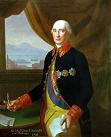







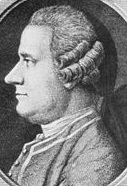







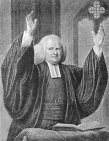
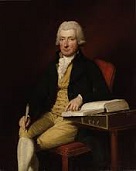




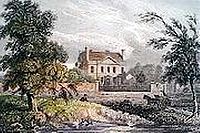
1779 There are now 21 regiments of loyalists (6.5K-8K men) in the British army in America. On Jan. 12 a 2.6K-man British force under Col. Cockburn retreating from Poonah is attacked by an 80K-man Maratha army at the Battle of Wargaom, killing 352 British incl. 15 officers before they hole-up in Wargaom; on Jan. 16 they surrender and sign the Treaty of Wargaom, relinquishing all territories acquired by the Bombay govt. since 1775; too bad, British gov. Warren Hastings in Bengal rejects the treaty, and sends a large force under Col. Goddard. On Jan. 29 a Scottish Highlander regiment under Lt. Col. Archibald Campbell (d. 1791) captures Augusta, Ga., but on Feb. 13 they evacuate under rebel pressure, still threatening S.C., home to Charleston, the largest port of entry for slaves arriving in North Am., who reject a plea by John Laurens, son of former Continental Congress pres. Henry Laurens to recruit two to four black battalions for the Continental Army; John Laurens turns to military service in S.C. under Brig. Gen. William Moultrie. On Jan. 30 Senegal is restored to France; the British attack, capturing Goree. In Jan. Wolfgang Amadeus Mozart returns to Salzburg, Austria a 23-y.-o. has-been after spending 18 mo. searching for a job in Mannheim and Paris and turning down the job of court organist at Versailles and seeing his mother get sick and die in Paris, which his daddy blames him for; his babe Aloysia Weber jilts him, and the aristocrats snub him, but daddy gets him the job of court organist in Salzburg under the thumb of the hated prince-archbishop Hieronymus Colloredo. On Feb. 14 Capt. James Cook (b. 1728) is murdered in Kealakekua Bay (which he first sighted on Jan. 17, and performed the first Christian service on the islands on Jan. 28 for a dead crew member) on the W (Kona or dry) side of Hawaii Island by Hawaiian natives in a conflict over a stolen boat after he gets cooky, er, cocky and holds chief Kalani'opu'u (1729-82) hostage; if only he could swim?; the survivors return to England via the East Indies and the Cape of Good Hope; Kalani'opu'u's son Kiwala'o (1760-82) becomes king of Hawaii (until July 1782), and his nephew Kamehameha I (1737-1819) becomes guardian of the god of war Kukailimoku. On Feb. 14 (Sun.) Irish-born British Tory Col. James Boyd of Raeburn Creek, S.C. and 700 British and loyalist soldiers are defeated by 350 patriots led by Penn.-born Col. Andrew Pickens (1739-1837) of S.C. and Lt. Col. Elijah Clarke (1742-99) of Ga. at the Battle of Kettle Creek in Wilkes County (EC Ga.); Boyd is KIA, and 150 loyalists are taken POW. On Feb. 25 a small Am. force under Col. George Rogers Clark, after using excess company flags to fool the Brits into thinking they have more than 500 troops recaptures Ft. Sackville in Ind. from British Lt. Gov. Henry Hamilton after a 2-day siege, and this time they keep it. On Feb. 25 under orders of Congress, Gen. George Washington sends an expedition led by Gen. John Sullivan (1740-95) and Gen. James Clinton (1733-1812) to kick the butts of Butler's Tory Rangers and their Indian (Seneca) allies, which they do on Aug. 29 in the Battle of Newtown near modern-day Elmira, N.Y. after Sullivan first dams the Susquehanna River at Lake Otsego, lets the lake rise, then destroys the dam, flooding the area downstream; they then attack the Iroquois Confederation; it takes most of the year but they are defeated and many Iroquois villages devastated, causing Joseph Brant to ignore the later U.S.-Iroquois peace treaties and continue frontier raids after the end of the Am. Rev. War; in Nov. Sullivan resigns from the Am. army and becomes a member of the Continental Congress from N.H. (1780-1), N.H. atty. gen. from 1782-6, pres. of N.H. from 1786-9, and U.S. district judge of N.H. in 1789-95; the Seneca villages of Little Beard's Town, Big Tree and Squakie Hill are wiped out, then resettled by whites in 1789 as Leicester, N.Y. (originally Leister). In Feb. Benjamin Franklin becomes sole U.S. minister to France. On Mar. 12 the city of Chicago, Ill. (Ill. Tribe word for "striped skunk", meaning wild leek) (modern-day pop. 2.7M/9.5M) is founded by Jean Baptiste Pointe du Sable (DuSable) (1745-1818), a black fur trapper from Haiti, who sets up a trading post in modern-day Pioneer Court on the NE side of Michigan Ave. Bridge; it is incorporated as a town on Aug. 12, 1833, and as a city on Mar. 4, 1837; on Oct. 26, 1968 the state of Ill. recognizes du Sable as the father of Chicago; in 1957 the DuSable Museum of African-Am. History is founded at 57th St. S at Cottage Grove in Chicago. On Mar. 20 Gen. Washington writes a wishy-washy letter on the subject of recruiting a black regiment for the defense of the South, and South Carolina and Georgia reject Congress' recommendation to do so. On Mar. 20 Boston, Mass., USMC Capt. William Jones advertises for "a few good men" to enlist in the Corps for naval duty, creating a slogan. On Mar. 31 Russia and Turkey sign a treaty promising to take no military action in the Crimea. On Apr. 12 the Treaty of Aranjuez is signed by France and Spain, with France agreeing to help them take Gibraltar from the British, along with East and West Fla. and Minorca in exchange for Spain joining France's war against Britain. In Apr. Matias de Galvez (Matías de Gálvez) y Gallardo (1725-84), father of La. gov. Bernardo de Galvez y Madrid becomes gov. of Guatemala (until Apr. 3, 1783), rebuilding Guatemala City and founding a mint and cathedral, after which he becomes viceroy of New Spain (until Nov. 3, 1784). On May 13 Peace of Teschen ends the War of the Bavarian Succession (Potato War) (begun 1779) without any battles being fought after France and Russia mediate a compromise; Marie Theresa of Austria (the last great act of her reign) gives all but the border district of Innvertiel ("inn quarter") back to Bavaria, and Frederick Augustus I of Saxony (1750-1827) receives 6M florins for his trouble; Frederick II the Great's last war. On May 28 French Adm. Jean de la Perouse sights and lands on Maui. In May the southern British army's penchant for pillaging plantation houses cause them to delay so long that when they reach Charleston Neck they encounter impregnable defenses, and are almost entrapped by Gen. Benjamin Lincoln's Continental army. The Brits struggle to encircle the Am. rebels from the south but are stymied by the Spanish? On June 21 Charles III of Spain declares war on Britain after entering into an alliance with France in Feb., then enters the Am. Rev. War on the rebel side on June 23; Spanish gov. of Fla. (since 1777) Bernardo de Galvez y Madrid lucks out and intercepts a secret letter from George III dated June 25 to Scottish-born British Maj. Gen. John Campbell of Strachur (1727-1806) in Pensacola, Fla. (who was sent there last Oct. from New York by Lord Germain), telling him to attack New Orleans, allowing Galvez to beat him to the punch, officially recognize the U.S. on Aug. 19 and seize the new British frontier post of Ft. Bute NW of New Orleans at Manchac on Sept. 7 despite a hurricane that sinks his fleet in New Orleans on Aug. 15. On June 24 the unsuccessful Spanish-French Great Siege of Gibraltar, manned by 5K English under Gen. George Augustus Elliott, 1st Baron Heathfield (1717-90), nephew of Maj. Gen. Roger Elliott (1665-1714) begins, along with a stringent blockade (ends Feb. 7, 1783). In June British Gen. Sir Henry Clinton (last British gov. of Va.) promises freedom to runaway American slaves defecting to the British side and serving the crown, spurring tens of thousands to escape to serve King George III, shaming the rebels, whose many efforts to do the same have all been ix-nayed by the cracker slaveholders? On July 3 the French capture St. Vincent and Grenada in the West Indies from the British (until 1783). On July 4 (Independence Day) a special thanksgiving service is held by the Irish at Old Saint Mary's Church in Philadelphia, Penn., attended by the pres. and members of the Continental Congress, and the heads of the U.S. army and navy, becoming the first public religious commemoration of the DOI. On July 16 Am. troops under Gen. Anthony Wayne take the British fortification at Stony Point, N.Y. overlooking the Hudson River in a night bayonet attack, and getting even for Paoli. On July 22 royal gov. James Wright returns to Savannah to restore English rule in Georgia. In July-Aug. the Siege of Penobscot Bay in Castine, Maine becomes the worst naval defeat in U.S. naval history (until Dec. 8, 1941), with the rebels losing 474 killed, wounded or captured out of 1K, vs. only 13 killed or wounded in the 600-man British force under Col. Francis McLean; Paul Revere is accused of cowardice but acquitted; the only successful part is the retreat, organized by U.S. Gen. Peleg Wadsworth (1748-1829), maternal grandfather of poet Henry Wadsworth Longfellow (b. 1807) - saving his silver character from being tarnished? On Aug. 2 John Adams returns to Mass., having not seen his wife Abigail for 1.5 years; he is asked to draft the Mass. constitution. On Aug. 10 Louis XVI of France frees the last remaining serfs on royal land. On Aug. 18-19 Henry "Light-Horse Harry" Lee III (1756-1818), future father of Gen. Robert E. Lee (b. 1807) brilliantly captures Paulus Hook (later called Jersey City), the last British outpost in New Jersey, and is promoted to lt. col. The Battle of the Bonhomme Richard and Serapis makes John Paul Jones a star? John Paul Jones is promoted to commodore in command of a mixed fleet of five French and Am. vessels, incl. the 14-y.-o. 34-gun refitted decrepit French East Indiaman Duc de Duras, which he renames the Bonhomme Richard, after Ben Franklin's Poor Richard's Almanac; on Aug. 14 he sails with a largely foreign crew (incl. 140 French marines) to raid English shipping, accompanied by the Am. frigate Alliance (with a French capt. and Anglo-Am. crew), the French frigate Pallas, and the French brig Vengeance, sailing up the W coast of Ireland, around Scotland, and down England's E coast, taking 17 ships; on Sept. 23 he engages a fleet of 41 British merchantmen convoyed by the 44-gun British frigate HMS Serapis and the 20-gun sloop HMS Countess of Scarborough in the North Sea off Flamborough Head on the Yorkshire coast; after the Serapis gets the best of him with its guns, Jones grapples his ship to her stem to stern, and they continue to fight into the night under a full moon in one of the bloodiest naval battles to date (3.5 hours); allegedly Capt. Sir Richard Pearson (1731-1806) calls out to Jones, asking for surrender, and Jones shouts his immortal reply "I have not yet begun to fight" (how many times have you heard the words, "Variation on a theme"?); at 10:30 p.m. an explosion in in the Serapis forces its capt. to strike his colors, and Jones wins the battle, but his ship is in bad shape, forcing him and his squadron to make for the Continent against contrary winds; the Bonhomme Richard sinks on Sept. 25, and Jones transfers to the Serapis, then reaches Texel, Holland on Oct. 3, a guaranteed Am. hero, which enhances the prestige of the fledgling U.S. of A. and gets him a gold-mounted sword and Order of Military Merit from Louis XVI, plus a gold medal from the Continental Congress, which proclaims its 2nd nat. day of Thanksgiving - and a pardon for all income taxes in arrears, plus a discharge of his debts and a good looking young wench? On Sept. 1 the French fleet arrives in America and begins an encirclement of Savannah, Ga. On Sept. 1 Congress stops issuing paper money, calling on the states on Oct. 6 to provide 15 million dollars each month to pay for the war effort; when that doesn't work a system of requisitioning supplies from each state is instituted beginning Dec. 11. On Sept. 12-21 after a British fleet of seven ships and 500 men in Pensacola under gen. John Campbell of Strachur decides not to sail in order to protect the E side of the province of West Fla., the Spanish under Bernardo de Galvez y Madrid defeat the Brits at the Battle of Baton Rouge, ensuring that the Mississippi River will be open to the Am. rebel cause, and going on to drive British troops out of W West Fla. by the end of the year. On Oct. 7 British Lt. Gen. Henry Clinton orders an evacuation of Newport, R.I. (held since 1776). On Oct. 9 the Luddite riots begin in Manchester, England in reaction to Arkwright machinery for spinning cotton when working man (fictional?) Capt./Gen./King Ned Ludd (Lud) (Ludlam) of the Army of the Redressers from Anstey (near Leicster) destroys a number (2?) of stocking frames in Nottingham, causing the Luddite rebellion in 1811-16. On Oct. 11 Polish nobleman Casimir Pulaski (b. 1745), "father of the American cavalry" dies two days after being mortally wounded while fighting for the Am. side at the Battle of Savannah after slave Quamino Dolly leads British troops through the swamps to attack it; on Oct. 19 the Am. and French forces withdraw. On Nov. 11 Thomas Jefferson proclaims a Day of Thanksgiving, with the soundbyte: "A day of public and solemn Thanksgiving to Almighty God, for his mercies, and of Prayer, for the continuance of his favour... That He would go forth with our hosts and crown our arms with victory; That He would grant to His church, the plentiful effusions of Divine Grace, and pour out His Holy Spirit on all Ministers of the Gospel; That He would bless and prosper the means of education, and spread the light of Christian knowledge through the remotest corners of the earth..." On Nov. 12 14 slaves petition the N.H. legislature for their freedom; on June 7, 2013 the gov. of N.H. signs a bill granting them posth. emancipation. On Nov. 13 John Adams sails to Holland along with his young sons John Quincy and Charles, and Atlantic storms plus a leaky vessel causes a forced landing at Ferrol, Spain, after which they cross the Pyrenees in a carriage. On Dec. 1 Washington's army winters in Jockey Hollow near Morristown, N.J., and faces a miserable winter (worst so far in North Am. this cent.); Washington and his staff occupy the Ford Mansion (white with green trim) (built 1772-4) of the late Judge Jacob Ford; New York Harbor is so deeply frozen that the Brits can move heavy artillery across it. On Dec. 16 emperor (since 1771) Go-Momozomo (b. 1758) dies, and next year his adopted son (2nd cousin) Kokaku (1771-1840) (personal name Tomohito) (6th son of Higashiyama's grandson Prince Kan'in-no-miya Sukehito) becomes Japanese Yamato emperor #119 (until 1817), inaugurating the Tenmei ("Dawn") Era. On Dec. 26 British Gen. Henry Clinton sets sail from New York City to invade Charleston, S.C. - setting sail from New York City becomes his signature shot? After the Am. Rev. closes the U.S. as a destination for transported felons, Britain passes the Penitentiary Act, drafted by jurist William Blackstone and reformer John Howard, recommending imprisonment over death or transportation, ordering the construction of a network of state-operated prisons, becoming the first; too bad, Parliament drags its feet and only creates two new prisons in London. Ang Eng becomes king of Cambodia (until 1796). Karim Khan Zand dies, and his successors rule W Persia until 1794, while Qajar leader Agha Khan eats into it. The Dutch of the Cape and the Xhosa begin the first of a hundred-year series of Dutch-Xhosa Wars on the E frontier at the Fish River (until 1781). At the urging of Queen Maria Carolina (Marie Caroline), Sir John Francis Edward Acton, 6th Baronet (d. 1811) (grandfather of Lord Acton of absolute power corrupts absolutely fame) begins a reorg. of the navy of Naples, steering Naples toward an anti-French and pro-British and pro-Austrian position, which causes defense expenditures to skyrocket, making him unpopular. The autonomous (since 1719) seaport of Fiume on the Adriatic Sea on the Gulf of Rijeka is given by Austria to the Hungarian crown (until 1809). The town (borough) of Glassboro, N.J. (modern-day pop. 29K) is founded by Solomon Stanger as "the Glass Works in the Woods", becoming home to several glass manufacturers; in 1923 Rowan U. (originally Glassboro State College) is founded there. Thomas Jefferson becomes gov. of Va.(ends 1781), and Richmond is made the state capitol because of its central location. Thomas Paine is dismissed by Congress as secy. of the committee of foreign affairs for divulging state secrets, and is appointed clerk of the Penn. legislature. Am. Gen. Israel Putnam suffers a paralyzing stroke, and becomes homebound for the rest of his life (until 1790) - no more put in Old Put? Martinique-born babe Marie Josephe Rose Josephine Tascher de la Pagerie (1763-1814) marries French army officer Alexandre Francois Marie, Vicomte de Beauharnais (1760-94) (until 1794). 38-y.-o. widower Gen. Benedict Arnold (b. 1741) marries 19-y.-o. sweet young thing Margaret "Peggy" Shippen (1760-1804), member of a prominent royalist family, and begins living beyond his means, blaming his troubles on Washington's refusal to promote him faster and get him out of backwater Philly? Continental soldiers now have their regulation uniforms to show the Brits that they got game. The city of Nashville, Tenn. on the Cumberland River (Davidson County) (modern pop. 684K/1.8M) is founded, named after Brig. Gen. Francis Nash (1742-77), who was mortally wounded in the Oct. 4, 1777 Battle of Germantown. White Sulphur Springs in W. Va. 120 mi. E of Charleston begins to become a famous resort for the Southern elite, going on to house the President's Cottage, the summer home of U.S. presidents Martin Van Buren, John Tyler, and Millard Fillmore. The cartoons of British caricaturist James Gillray (1757-1815) begin to appear, starting with Paddy on Horseback, and he goes on to ramp it up with caricatures on the French Rev., the stupidity of physiognomy, and English politics in general (esp. George III) until the 1810s. The first Children's Clinic is founded in London. Pope Pius VI begins draining the Pontine Marshes. The Universalist Church of Am. is organized in Gloucester, Mass. by John Murray. The first law school in the U.S. is founded at William and Mary College in Williamsburg, Va., along with the first school of modern languages, and first college elective system. Engraver William Blake (b. 1757) enrolls at London's Royal Academy of Art, but quits after disagreeing with the dir. about religious beliefs, how he talks to the angel Gabriel and the Virgin Mary all the time, etc. - he was afraid to come out of the locker, afraid that somebody could see? English botanist Sir Joseph Banks leases Spring Grove House on London Rd. in NW London in Isleworth, filling it with his plants collected on his South Seas voyages; he purchases it in 1808. Sports: The first annual Epsom Oaks for 3-y.-o. fillies, organized by Edward Smith-Stanley, 12th Earl of Derby (1752-1834) is run on May 4 at Epsom Oaks in Carsharlton, 10 mi. of Charing Cross, London; the winner is Lord Derby's horse Bridget. Architecture: Inventions: The first cocktail is invented by a tavern keeper in Elmsford, N.Y., who ornaments each rum-filled glass with rooster feathers after seeing barmaid Elizabeth "Betsy" Flanagan decorate her bar at Halls Corner with discarded tail feathers from poultry that has been roasted and served to patrons, and a drunken guest demand that she bring him "a glass of those cocktails", causing her to serve him a mixed rum drink garnished with one of the feathers - she invents it, he gets the credit? Samuel Crompton (1753-1827) of Bolton, England invents the Spinning Mule, AKA Hall-i'-th'-Wood, an improvement on the spinning jenny and water frame suitable for making tightly-twisted muslin; too bad, he can't afford to pay to patent it, so it becomes public domain and he dies broke; meanwhile Richard Arkwright et al. attempt to invent a carding machine to produce the cotton rovings that are fed into the spinning mule, based on the failed 1748 invention of Lewis Paul, and Arkwright pioneers all-in-one cotton factories, which are powered by water until 1784 when steam is first used. Science: In Jan. French astronomer Antoine Darquier de Pellepoix (1718-802) discovers the Ring Nebula (Messier 57) in the N constellation of Lyra. Thomas Jefferson stinks himself up by giving a lecture on what he thinks is a primitive feline, which turns out to be a ground sloth. Dutch chemist-biologist Jan Ingenhousz (1730-99) discovers that plants need carbon dioxide, and that they need light in order to produce oxygen. Antoine-Laurent Lavoisier and Pierre Simon Laplace pub. their discovery that respiration is a form of combustion. Swiss physicist Horace-Benedict de Saussure (1740-99) pub. the idea that glaciers slide downhill on a base of meltwater. Swedish chemist Carl Wilhelm Scheele discovers Glycerine, and makes the surprising discovery that black pencil lead (plumbago) is actually a soft form of carbon. Italian biologist Lazzaro Spallanzani (1729-99) proves that sperm and egg must come into contact for fertilization to occur, and invents Artificial Insemination - don't be lazy and spill any? Nonfiction: Jean-Sylvain Bailly (1736-93), A History of Modern Astronomy (3 vols.) (1779-82); Letters on Plato's "Atlantis". Etienne Bezout (1730-83), Theorie Generale des Equations Algebriques (Paris); contains material on the Elmination Theory, the symmetrical functions of the roots of an equation, and Bezout's Identity, that the greatest common divisor of natural numbers a and b is ax + by for some integers x and y. Johann Friedrich Blumenbach (1752-1840), Handbuch der Naturegeschichte; suggests that Homo sapiens be assigned to a different order than apes - but I want to dance with somebody? Charles-Augustin de Coulomb (1736-1806), Theorie des Machines Simples. Wiliam Eden, 1st Baron Auckland (1745-1814), Four Letters to the Earl of Carlisle. Benjamin Franklin (1706-90), The Morals of Chess; how it develops foresight, circumspection, perseverance, and sportsmanship; "[Chess] is not merely an idle amusement; life is a kind of chess, in which we have often points to gain, and competitors or adversaries to contend with, and in which there is a vast variety of good and evil events that are in some degree the effects of prudence or the want of it"; in his memoirs Thomas Jefferson says that Franklin once checkmated the Duchess of Bourbon, who complained "We do not take kings so", to which he replied "We do in America". Edward Gibbon (1737-94), A Vindication of Some Passages in the Fifteenth and Sixteenth Chapters; Hume could say he told him so? David Hume (1711-76), Dialogues of Natural Religion (posth.); written in the early 1750s, but he was too chicken to pub. material skeptical of religion, esp. after seeing what they did to Edward Gibbon? Dr. Samuel Johnson (1709-84), Lives of the Poets (1779-1781); his last and best work. Gouverneur Morris (1752-1816), Observations on the American Revolution. Maj. James Rennell (1742-1830), Bengal Atlas; makes him the "Father of Indian Geography". Charles Stanhope, 3rd Earl Stanhope (1753-1816), Principles of Electricity; first to describe the return stroke of lightning. Music: Johann Christian Bach (1735-82), Amadis des Gaules (opera) (Paris). Christoph Willibald Gluck (1714-87), Iphigenie en Tauride (opera) (May 18) (Paris Opera); libretto by Nicolas Francois Guillard based on Euripides' play "Iphigenia in Tauris"; a big hit; his masterpiece? Vicente Martin y Soler (1754-1806), La Griselda (ballet) (Naples); derived from a libretto by Apostolo Zeno. Wolfgang Amadeus Mozart (1756-91), Coronation Mass for HRE Joseph II in C major, K.317; written for Easter Sun. after arriving in Salzburg, then used in 1791 for you know what; Serenade No. 9 in D, K.320 ("Posthorn"); composed after he falls in love with Constanze Weber (1762-1842). John Newton (1725-1807) and William Cowper (1731-1800), The Olney Hymns (Feb.); composed in Olney, Buckinghamshire; incl. the original form of Amazing Grace by Wapping, London-born converted infidel and slave trader (for 20 years) John Newton (1725-1807), who is forever haunted by 20K souls; in 1835 it is coupled with the tune "New Britain"; "Amazing grace! How sweet the sound,/ That saved a wretch like me!/ I once was lost, but now am found,/ Was blind, but now I see./ Twas grace that taught my heart to fear,/ And grace my fears relieved;/ How precious did that grace appear/ The hour I first believed." Art: Antonio Canova (1757-1822), Daedalus and Icarus (sculpture). Charles Willson Peale (1741-1827), Portrait of George Washington (1779-81); artist is in the Penn. Militia, and the full-length work, showing the big V at Princeton in the background is shipped to Spain to gain support for the American cause, staying there for a cent.; in 2006 it is auctioned by Christie's for $10M-$15M. Plays: Hannah Cowley (1743-1809), Who's the Dupe? A farce in two acts; Albina, Countess Raimond: A Tragedy (July 31) (Haymarket, London); previously bounced back and forth between Drury Lane and Covent Garden in the off season (spring). Hannah More (1745-1833), The Fatal Falsehood (May 6) (Covent Garden, London); Hannah Cowley accuses her of plagiarism, ending her playwriting career after she admits that theater mgrs. gave her script ideas even though she never saw any of Cowley's plays herself. Johannes Ewald (1743-81), Fiskerne (The Fishermen) (drama); incl. King Christian Stood By the High Mast (Danish nat. song). Gotthold Lessing (1729-81), Nathan the Wise (Nathan der Weise); a Sturm und Drang poem play about religious intolerance, esp. of Jews, stressing a universal religion based on Enlightenment ideas; how wise Jewish merchant Nathan, an anon. Knight Templar, and wise sultan Saladin bridge the gaps between their three faiths and develop tolerance and friendship, even rationalism (rejection of miracles); the town council of Frankfurt am Main bans the book. Richard Brinsley Sheridan (1751-1816), The Critic (farce) (Oct. 30); "practitioner in panegyric" Puff; Sir Fretful Plagiary is a caricature of rival dramatist Richard Cumberland (1732-1811). Mercy Otis Warren (1728-1814), The Motley Assembly; pub. anon. Births: Am. naval officer "My country, right or wrong" Stephen Decatur Jr. (d. 1820) on Jan. 5 in Sinepuxent, Md.; educated at the U. of Penn. Am. soldier-explorer Zebulon Montgomery Pike (d. 1813) on Jan. 5 in Trenton, N.J. Engish physician-theologian-lexicographer Peter Mark Roget (d. 1869) on Jan. 18; son of a Swiss clergyman; educated at the U. of Edinburgh; inventor (1815) of the log-log slide rule. Am. writer-ed. (co-founder of the North Am. Review and Boston Athenaeum) William Tudor (d. 1830) on Jan. 28; brother of Frederic Tudor (1783-1864); educated at Phillips Academy, and Harvard U. Am. Navy commodore Isaac Chauncey (d. 1840) on Feb. 20 in Black Rock, Conn. German "Das Recht des Besitzes" jurist-historian Friedrich Carl (Karl) von Savigny (d. 1861) on Feb. 21 in Frankfurt am Main; big name in the historical school of jurisprudence; father of Karl Friedrich von Savigny (1814-75). British prince Octavius (d. 1783) on Feb. 23 in Buckingham House, London; 13th child and 8th son of George III and Charlotte of Mecklenburg; elder sister Sophia calls him "her son". Am. diplomat-physician-botanist-statesman (first U.S. minister to Mexico) Joel Roberts Poinsett (d. 1851) on Mar. 2 in Charleston, S.C; namesake of the Poinsettia. English Whig PM (1834, 1835-41) William Lamb, 2nd Viscount Melbourne (d. 1848) on Mar. 15 in London; educated at Eton, and Trinity College, Cambridge U.; husband of Lady Caroline Lamb (1785-1828). U.S. Sen. (D-Miss.) (1830-5) and Miss. gov. #2 (1820-2) George Poindexter (d. 1853) on Apr. 19 in Louisa County, Va. Am. celeb Eleanor Parke "Nelly" Custis (d. 1852) on Mar. 31 in Prince George County, Md. (Arlington, Va.?); daughter of John Parke Custis (-1781) (son of Martha Washington), and Eleanor Calvert Custis; raised by George and Martha Washington after John's death; wife (1799-) of Laurence Lewis (1767-1839). Scottish "Lawrie Todd" novelist (first English political novelist) John Galt (d. 1839) on May 2 in Irvine, Ayrshire. Spanish rebel leader Jose Alvarez de Toledo y Dubois (d 1858) on May 14 in Havana, Cuba. Irish "The Harp That Once Through Tara's Halls", "The Minstrel Boy", "The Last Rose of Summer" lyric poet-singer-songwriter-entertainer Thomas Moore (d. 1852) (AKA Anacreon Moore) on May 28 in Dublin; educated at Trinity College, Dublin. French diplomat (Napoleon's translator) Pierre Amedee (Amédée) Emilien Probe Jaubert (d. 1847) on June 3 in Aix-en-Provence; pupil of Antoine Isaac Silvestre de Sacy (1758-1835). German celeb Countess Marie Sophie von Bruhl (Brühl) (d. 1836) on June 3 in Warsaw; paternal granddaughter of Heinrich von Bruhl (1700-63); wife (1810-31) of Carl von Clausewitz (1780-1831). Am. "'Twas the Night Before Christmas" poet-educator Clement Clarke Moore (d. 1863) on July 15 in New York City; son of Episcopal bishop Benjamin Moore (1748-1816); prof. of Biblical learning, Oriental, and Greek lit. at the Gen. Theological Seminary of Columbia U. Am. "Star-Spangled Banner" composer (Freemason) Francis Scott Key (d. 1843) on Aug. 1 in Frederick (Carroll) County, Md. English military engineer (founder of Ottawa, Canada) Lt. Col. John By (d. 1836) on Aug. 7 in Lambeth, Surrey; educated at the Royal Military Academy. German geographer Karl (Carl) Ritter (d. 1859) on Aug. 7 in Quedlinburg. British Adm. Sir William Henry Dillon (d. 1857) on Aug. 8 in Birmingham; knighted in 1835. Swedish chemist Baron Jons (Jöns) (Johan) Jacob (Jakob) Berzelius (d. 1848) on Aug. 20 in Vaversunda, East Gothland; educated at the U. of Uppsala; created baron in 1835; coiner of the terms "catalyst" and "protein"; inventor of the "H20" system of chemical formulation. Corsican king of Holland (1806-10) Louis Napoleon Bonaparte (d. 1846) on Sept. 2 in Ajaccio; 3rd brother of Napoleon Bonaparte. Turkish Ottoman sultan #29 (1807-8) Mustafa IV (d. 1808) on Sept. 8; son of Abdul Hamid I (1725-89); brother of Mahmud II (1785-1839). U.S. Supreme Court justice (1812-45) Joseph Story (d. 1845) on Sept. 18 in Marblehead, Mass.; son of Elisha Story (1743-1805); educated at Harvard College. Swedish poet (archbishop of Uppsala) ("David's Harp of the North") Johan Olof Wallin (d. 1839) on Oct. 15 in Stora Tuna, Dalarna. Am. episcopal bishop (1852-65) Thomas Church Brownell (d. 1865) on Oct. 19 in Westport, Mass.; descendant of Col. Benjamin Church (1639-1718); educated at Union College. English antiquary James Ford (d. 1851) on Oct. 31 in Canterbury; educated at Trinity College, Oxford. British field marshal Sir Hugh Gough, 1st Viscount Gough (d. 1869) on Nov. 3 in Woodstown, Limerick, Ireland; descendant of Bishop Francis Gough of Limerick. Am. Romantic painter-poet ("the American Titian") Washington Allston (d. 1843) on Nov. 5 in Waccamaw, S.C.; educated at Harvard U.; teacher of Samuel F.B. Morse; coins the term "objective correlative". Danish Romantic poet-playwright ("King of Nordic Poetry") Adam Gottlob Oehlenschlager (Oehlenschläger) (d. 1850) on Nov. 14 in Vesterbro (Cophenhagen); author of the Danish nat. anthem "Der er et Yndigt Land". French Society of the Sacred Heart founder (Roman Catholic) (St.) Madeline Sophie Barat (d. 1865) on Dec. 12 in Joigny; feast day: May 25. English "Rejected Addresses" poet-novelist Horace (Horatio) Smith (d. 1849) on Dec. 31 in London; brother of James Smith (1775-1839); competes with Percy Bysshe Shelley in a sonnet contest; not to be confused with gunsmith Horace Smith (1808-93). Deaths: French painter Jean-Baptiste-Simeon Chardin (b. 1699) on Dec. 6 in Paris; lived in the Louvre since 1757. English composer William Boyce (b. 1711) on Feb. 7 in London. Am. Rev. leader (DOI signer) John Hart (b. 1711) on May 11 in N.J. Am. Dartmouth College founder Eleazar Wheelock (b. 1711) on Apr. 24 in Hanover, N.Y. Am. scientist John Winthrop (b. 1714). English actor-stage mgr. David Garrick (b. 1717) on Jan. 20 in London; dies three years after retiring from Drury Lane; laid to rest in Poets' Corner in Westminster Abbey after a lavish public funeral; "I am disappointed by that stroke of death that has eclipsed the gaiety of nations, and impoverished the public stock of harmless pleasure" (Dr. Samuel Johnson) - cloves make the ham? English cabinetmaker Thomas Chippendale (b. 1718) in Nov. English writer William Kenrick (b. 1725) on June 10 in London: "The Wits, who drink water and suck sugar-candy/ Impute the strong spirit of Kenrick to brandy/ They are not so much out: the matter, in short, is--/ He sips aqua vitae, and spits aqua fortis." British Capt. James Cook (b. 1728) on Feb. 14 in Kealakekua Bay, Hawaii (murdered). German painter Anton Raphael Mengs (b. 1728) on June 29 in Rome. Polish gen. Casimir Pulaski (b. 1745) on Oct. 11 in Savannah, Ga. (KIA) (mortally wounded at the Battle of Savannah) - the good die young? Japanese Yamato emperor #118 (1771-9) Go-Momozono (b. 1758) on Dec. 16. English mathematician-astronomer Robert Waddington (b. ?) in Westminster, London.